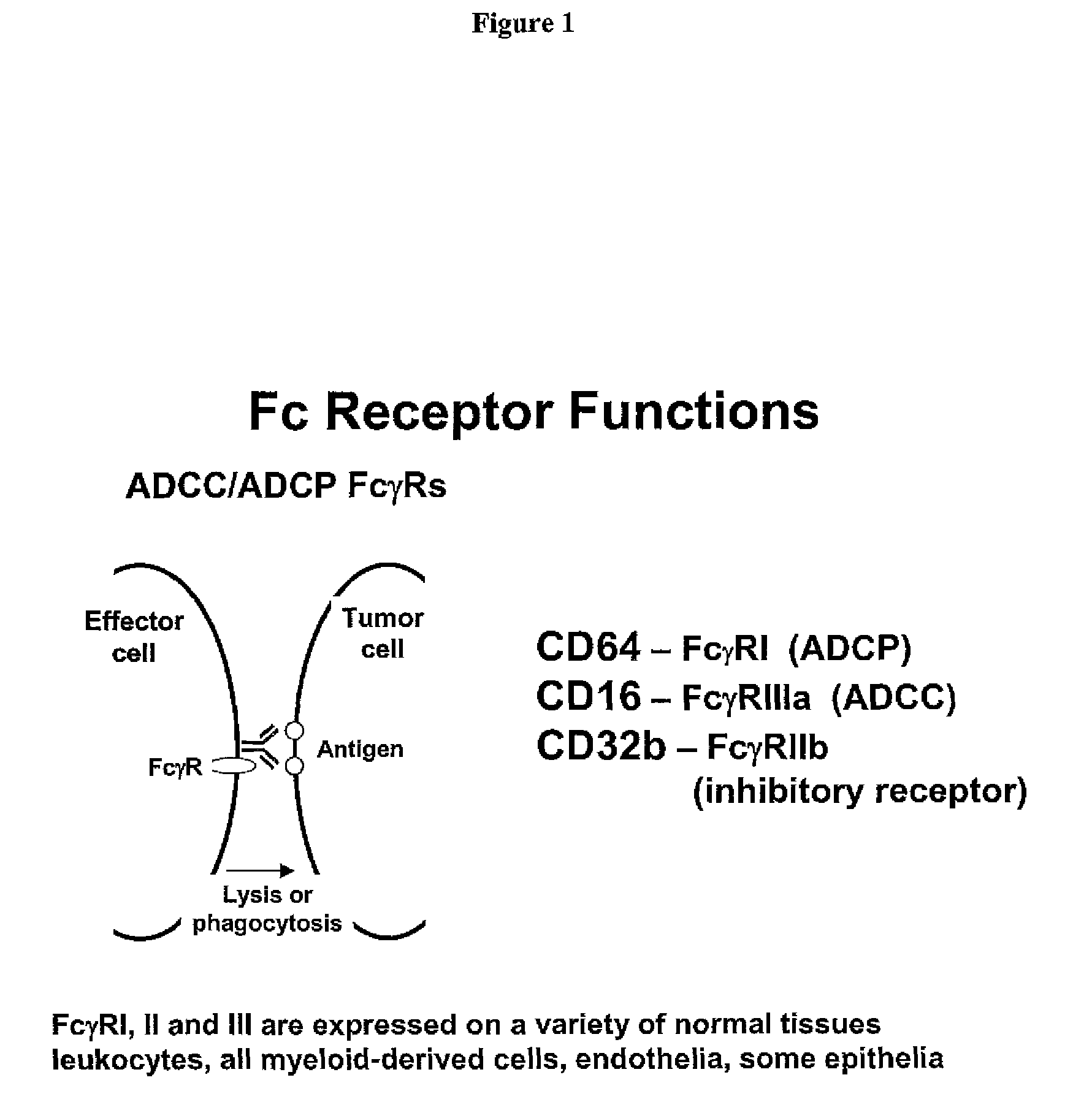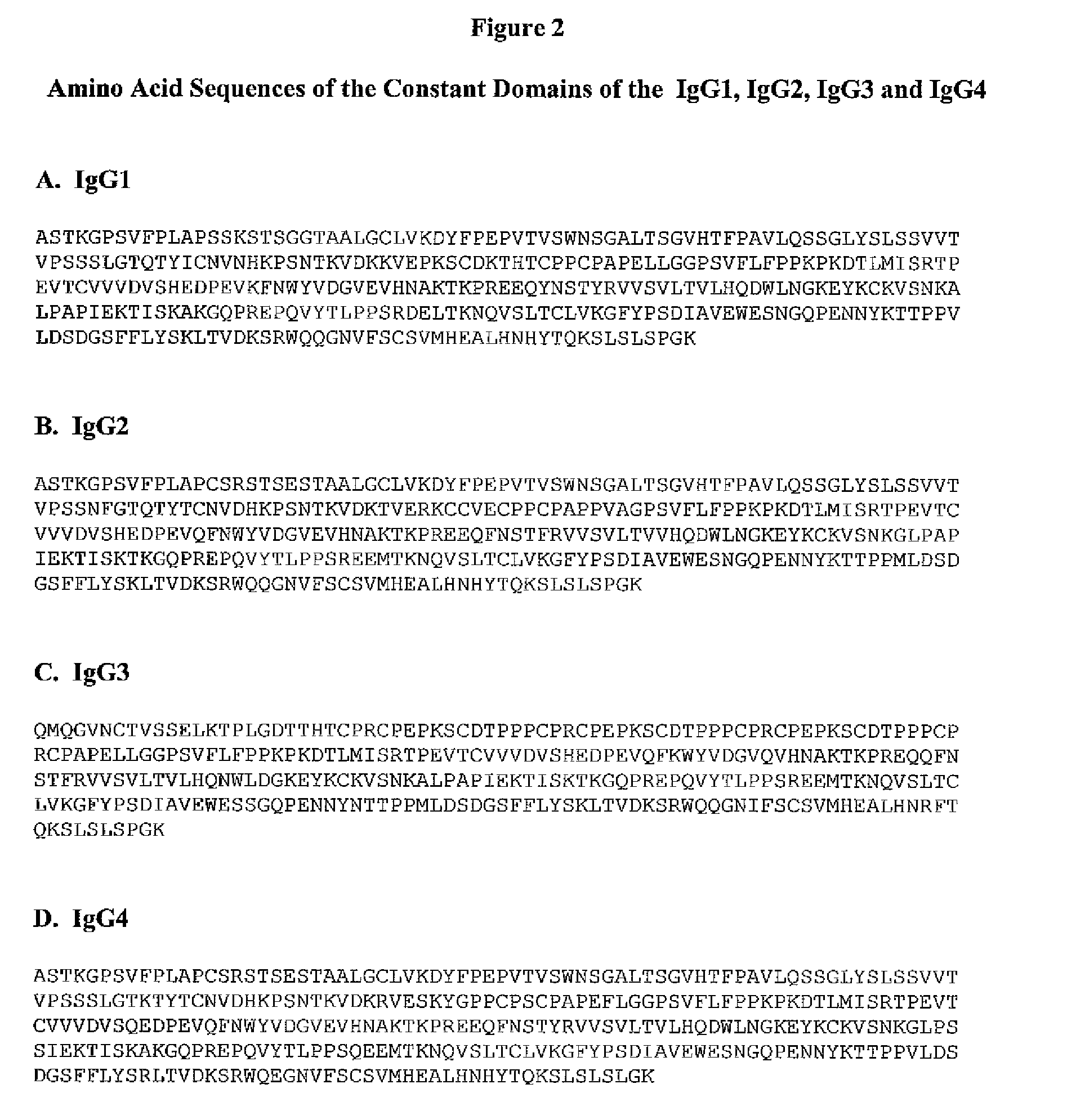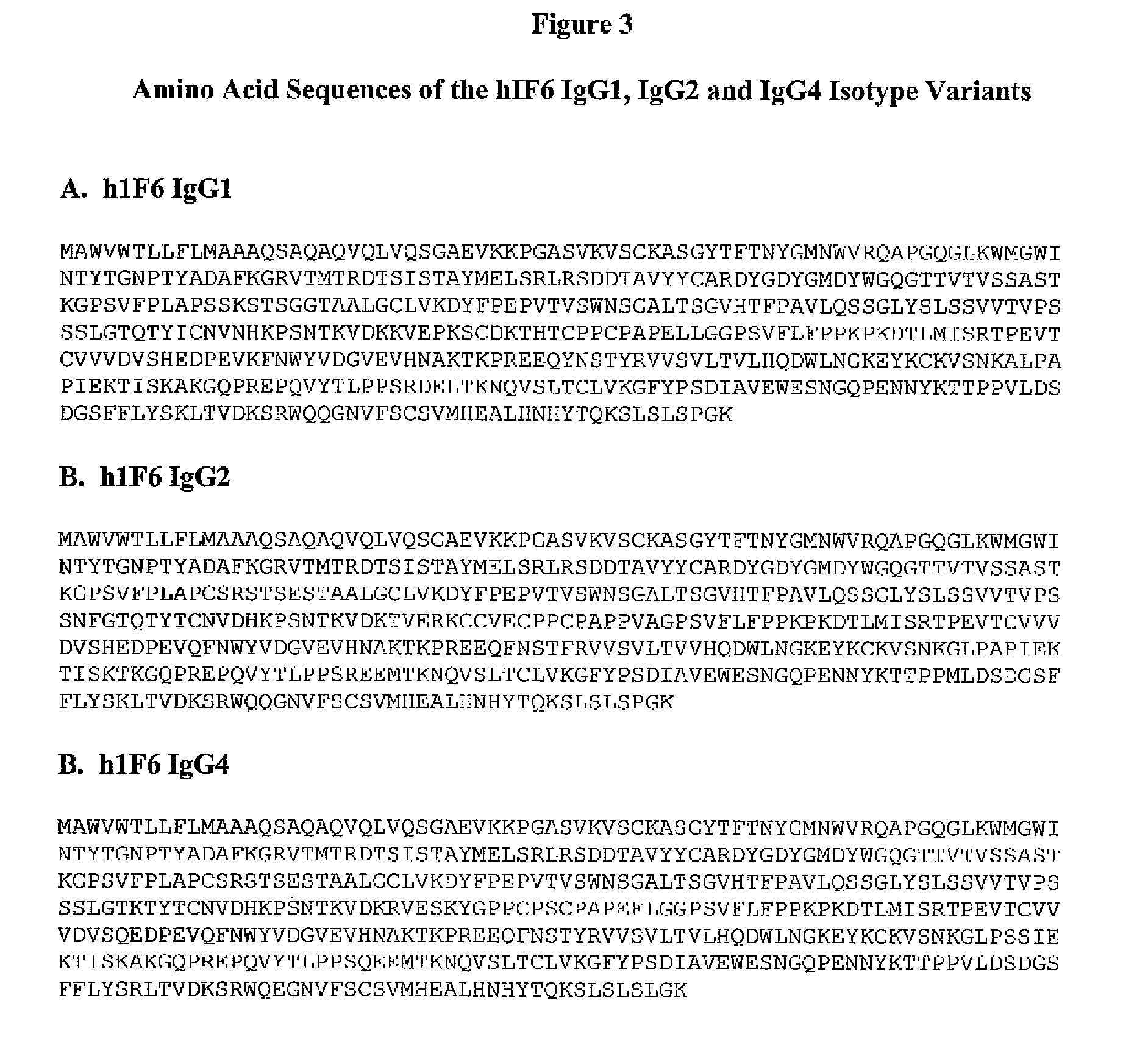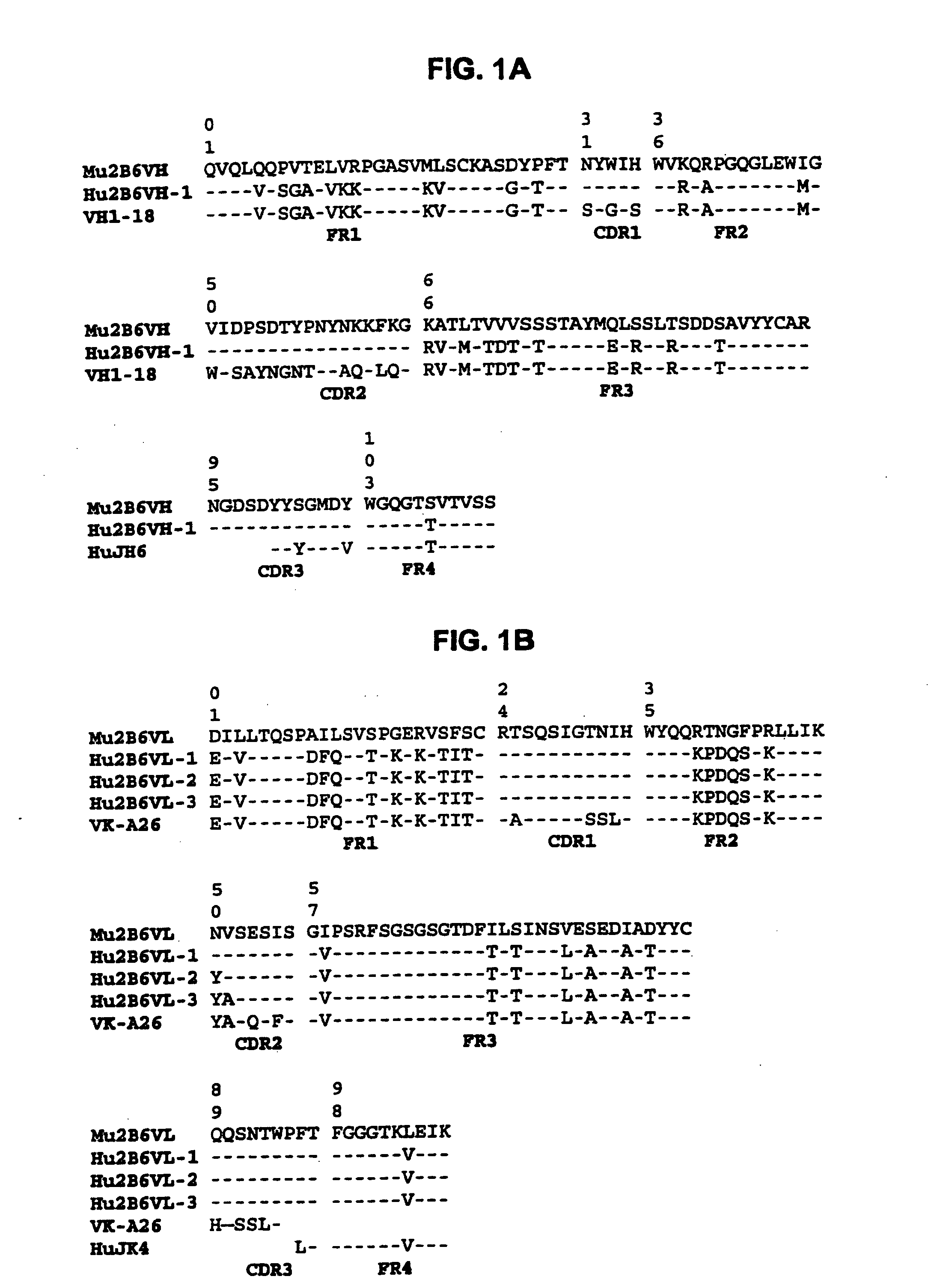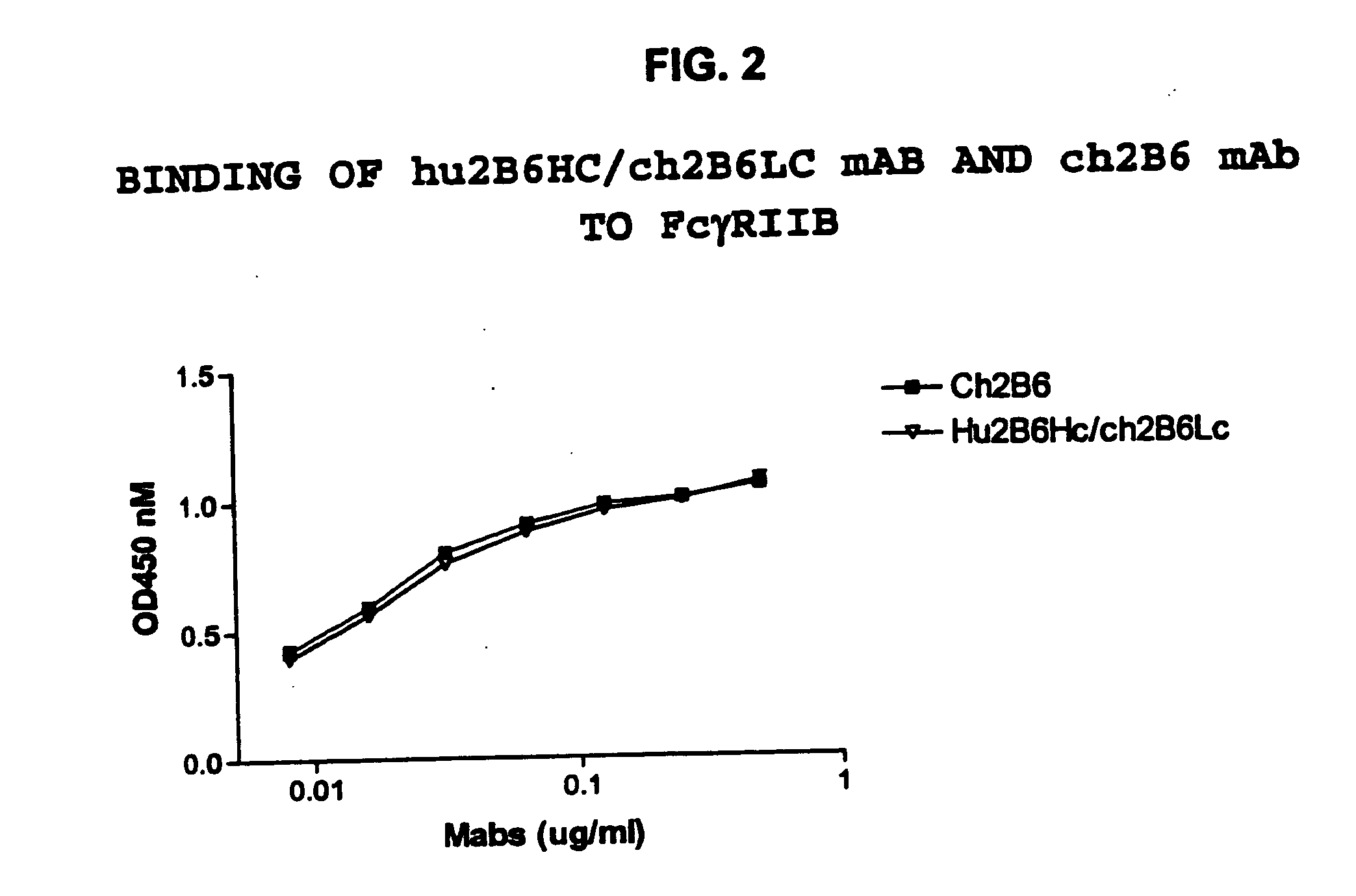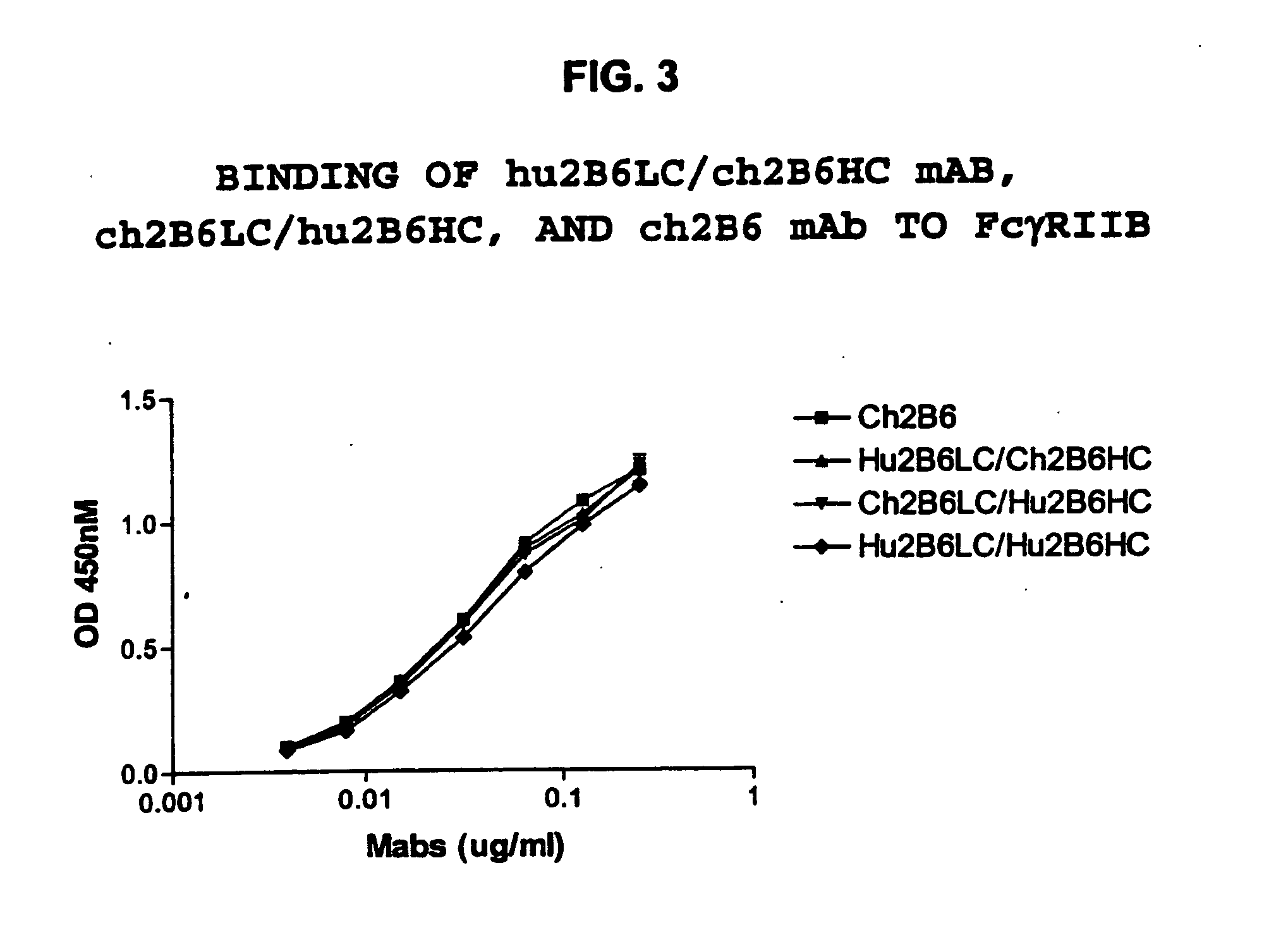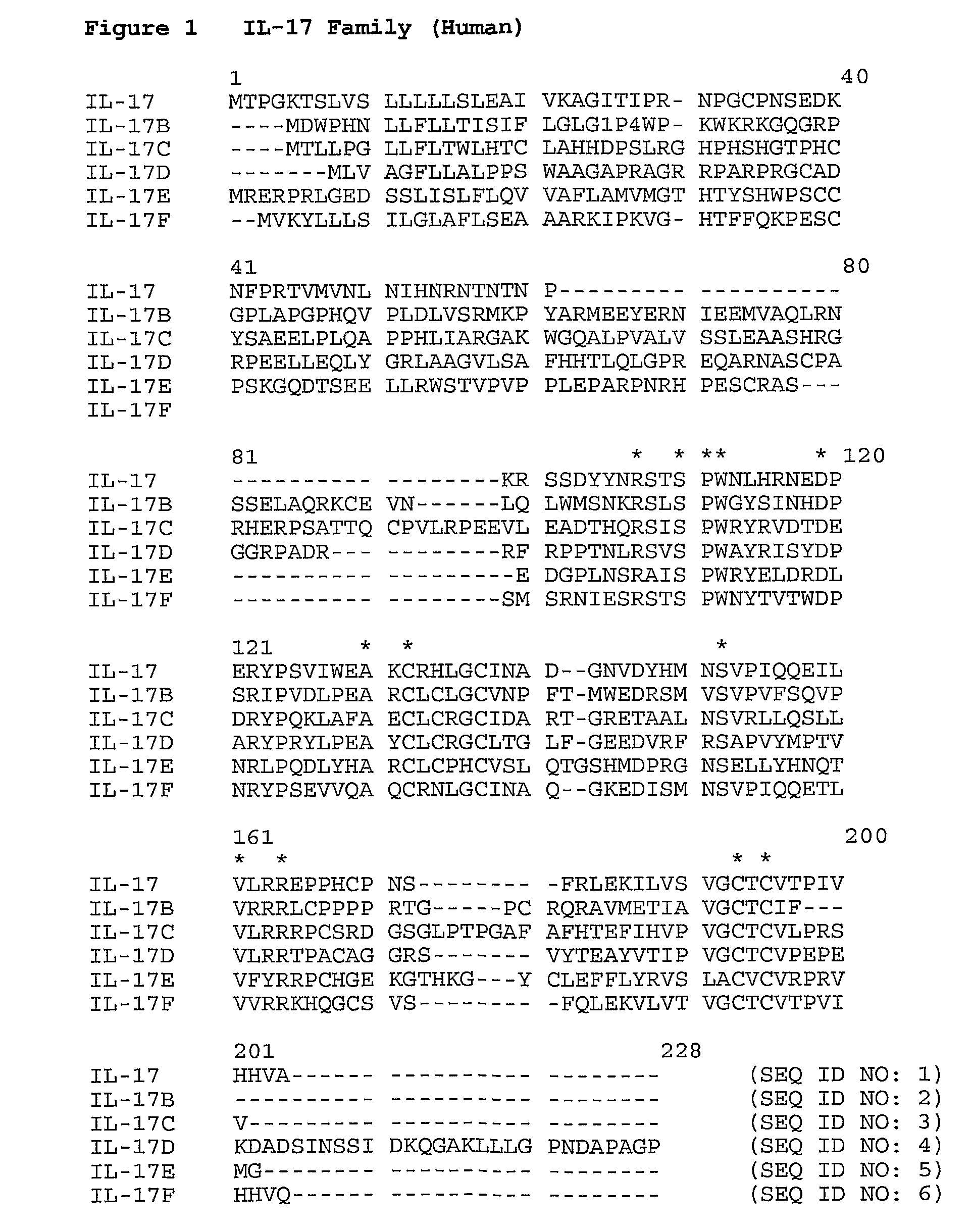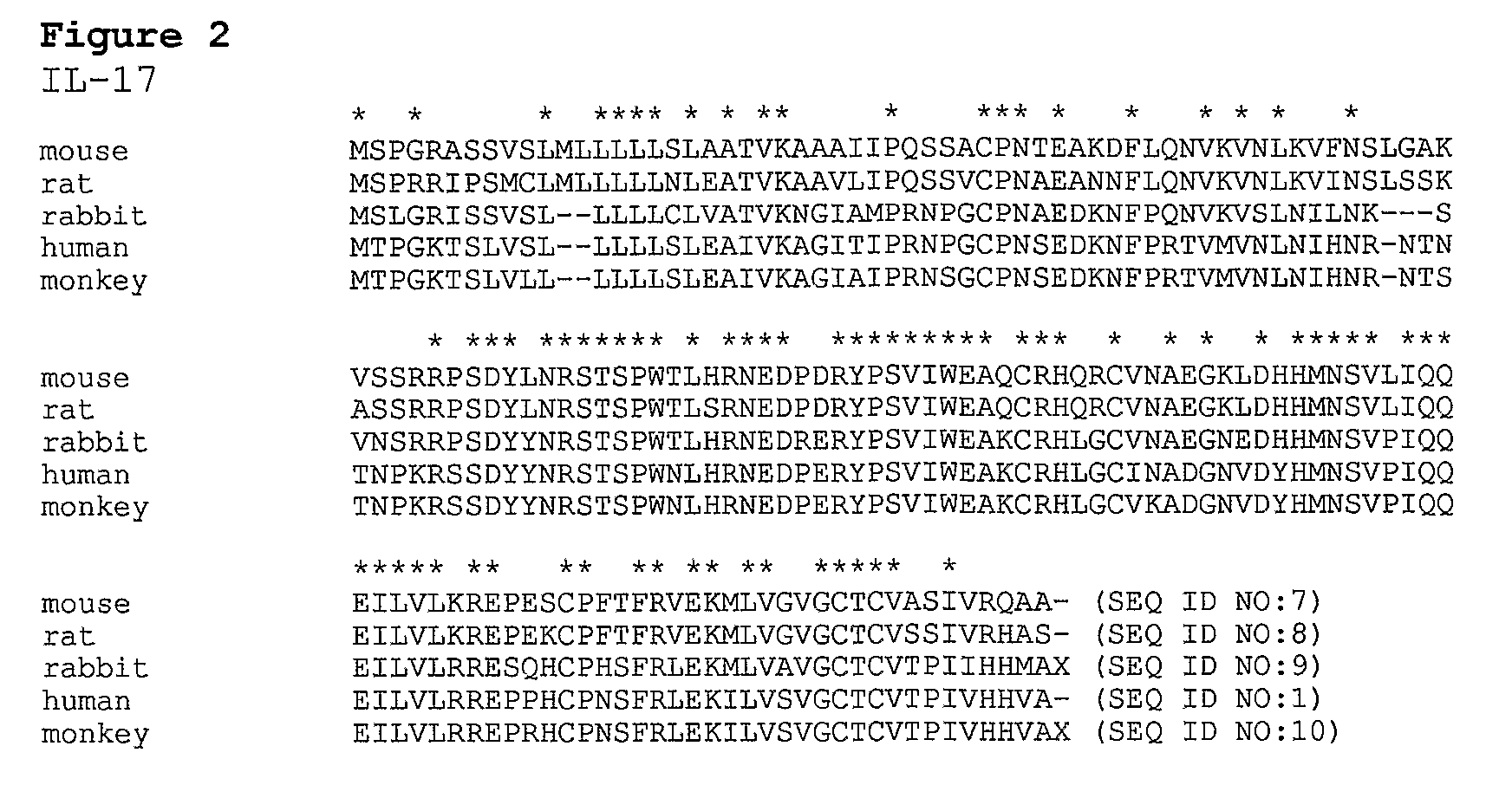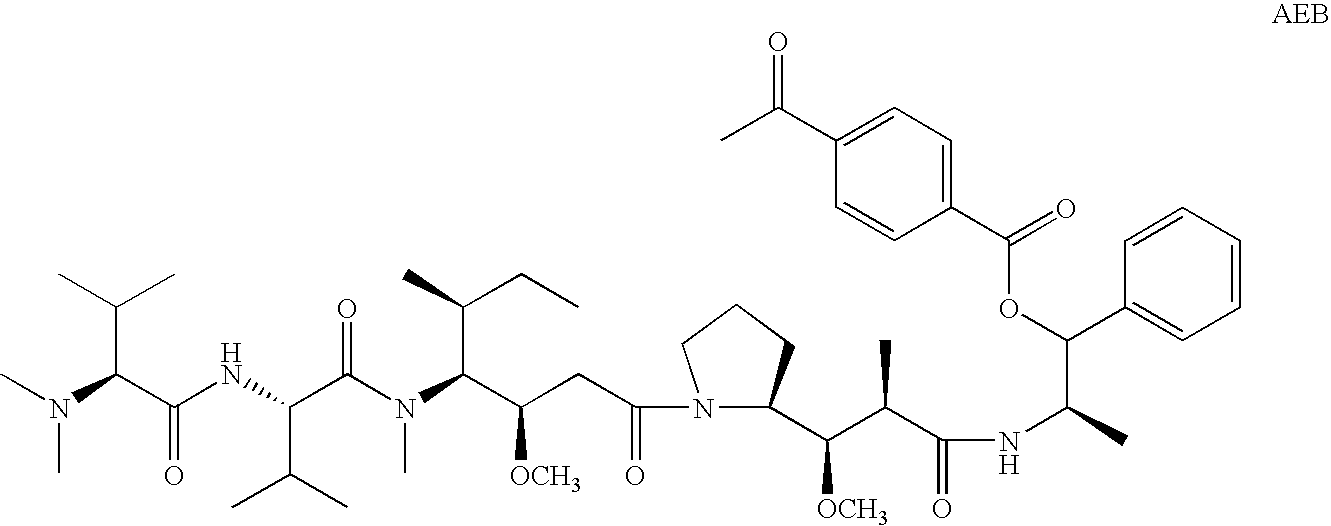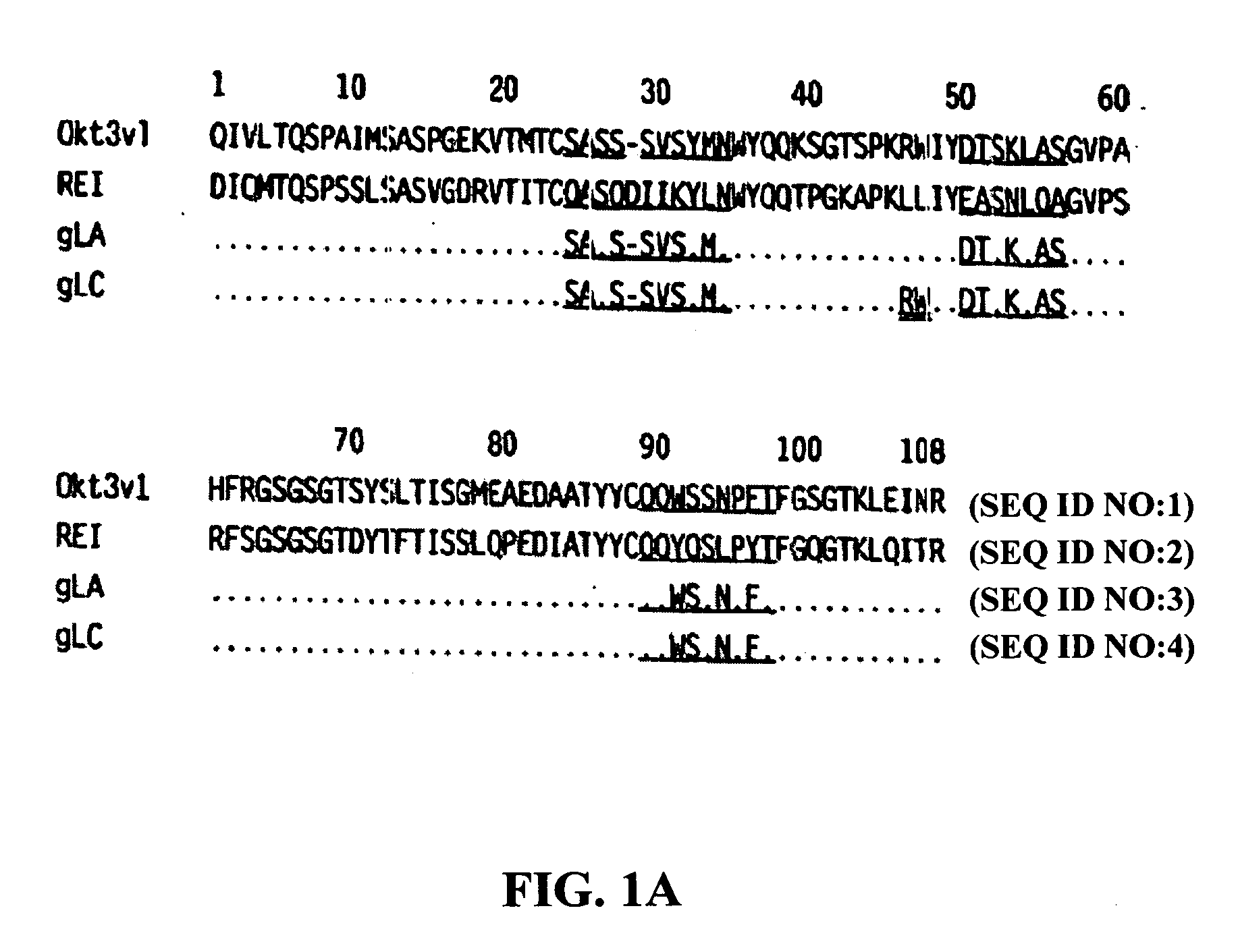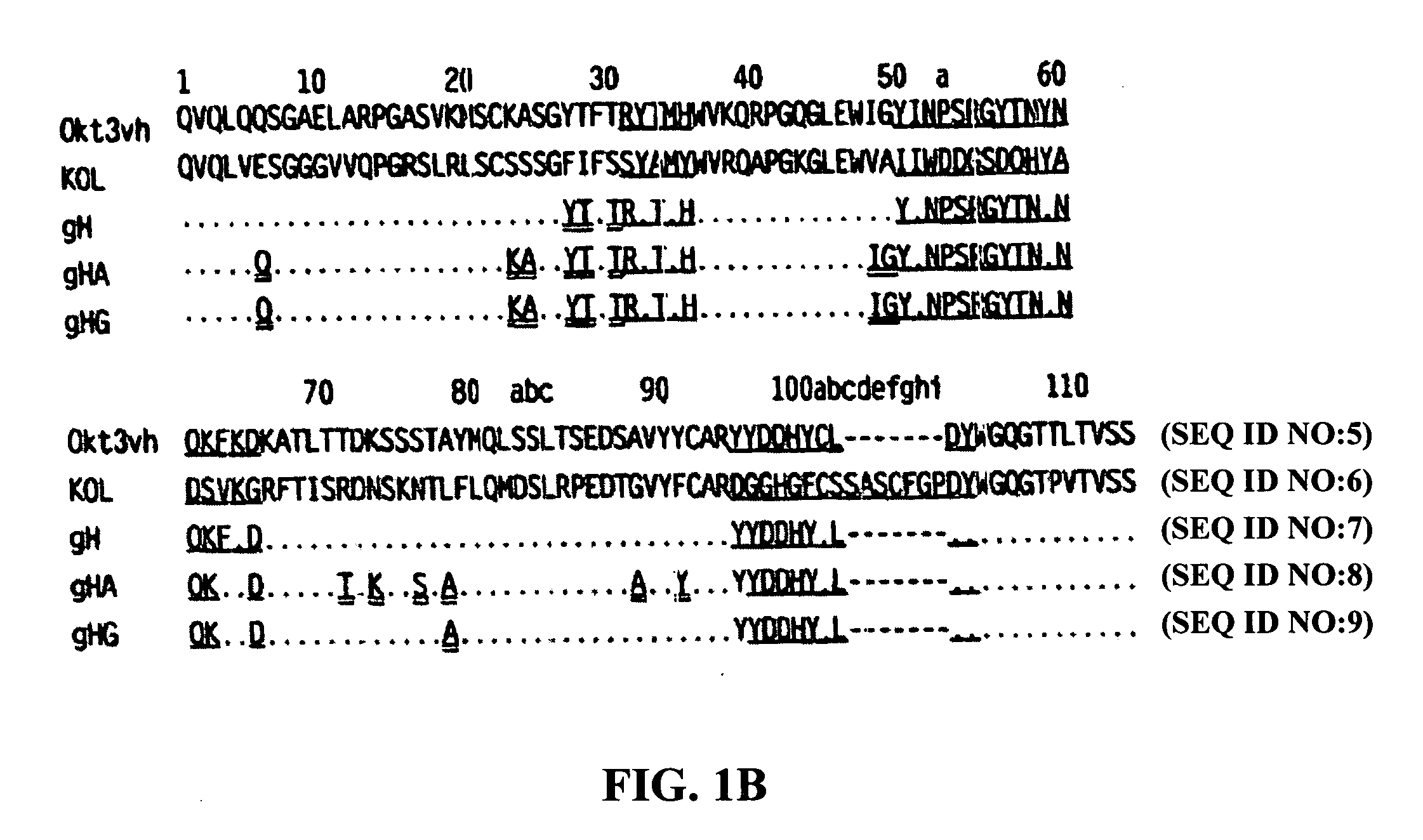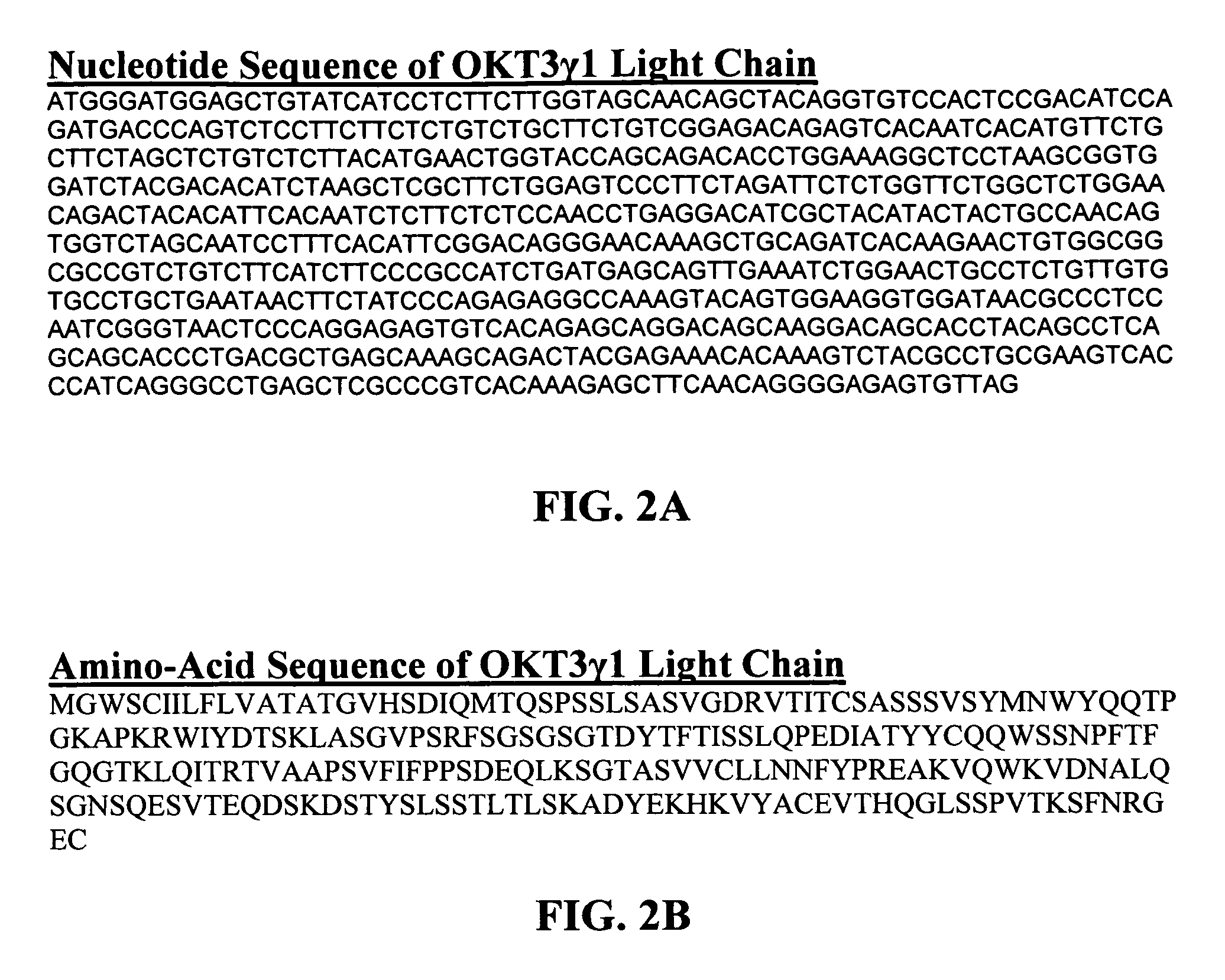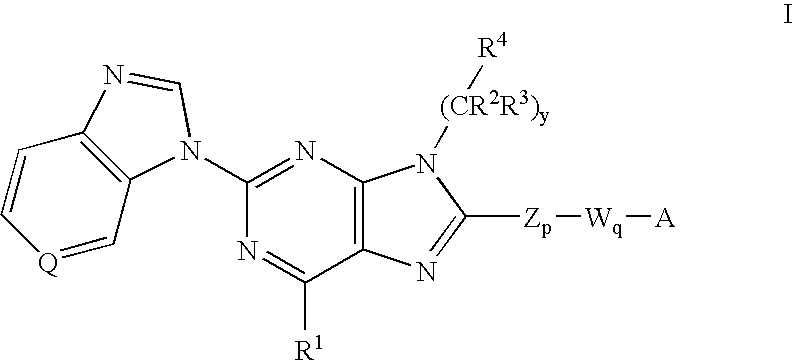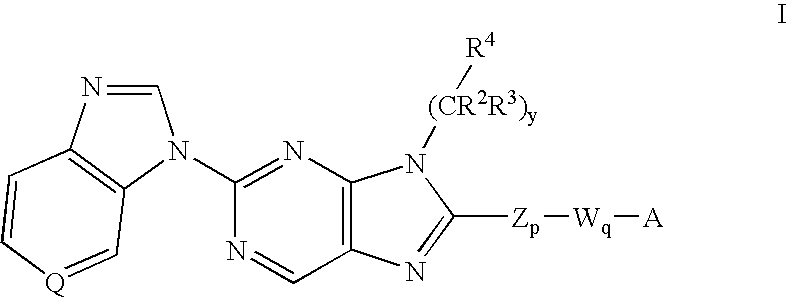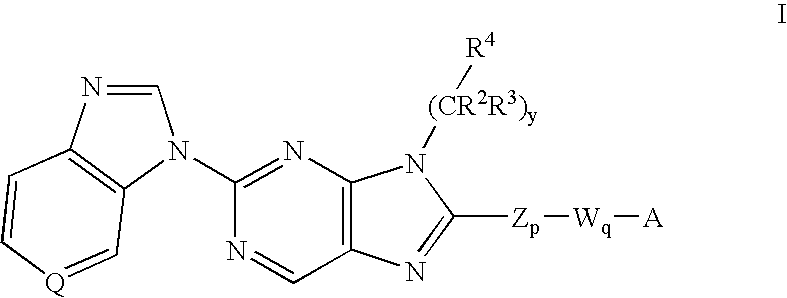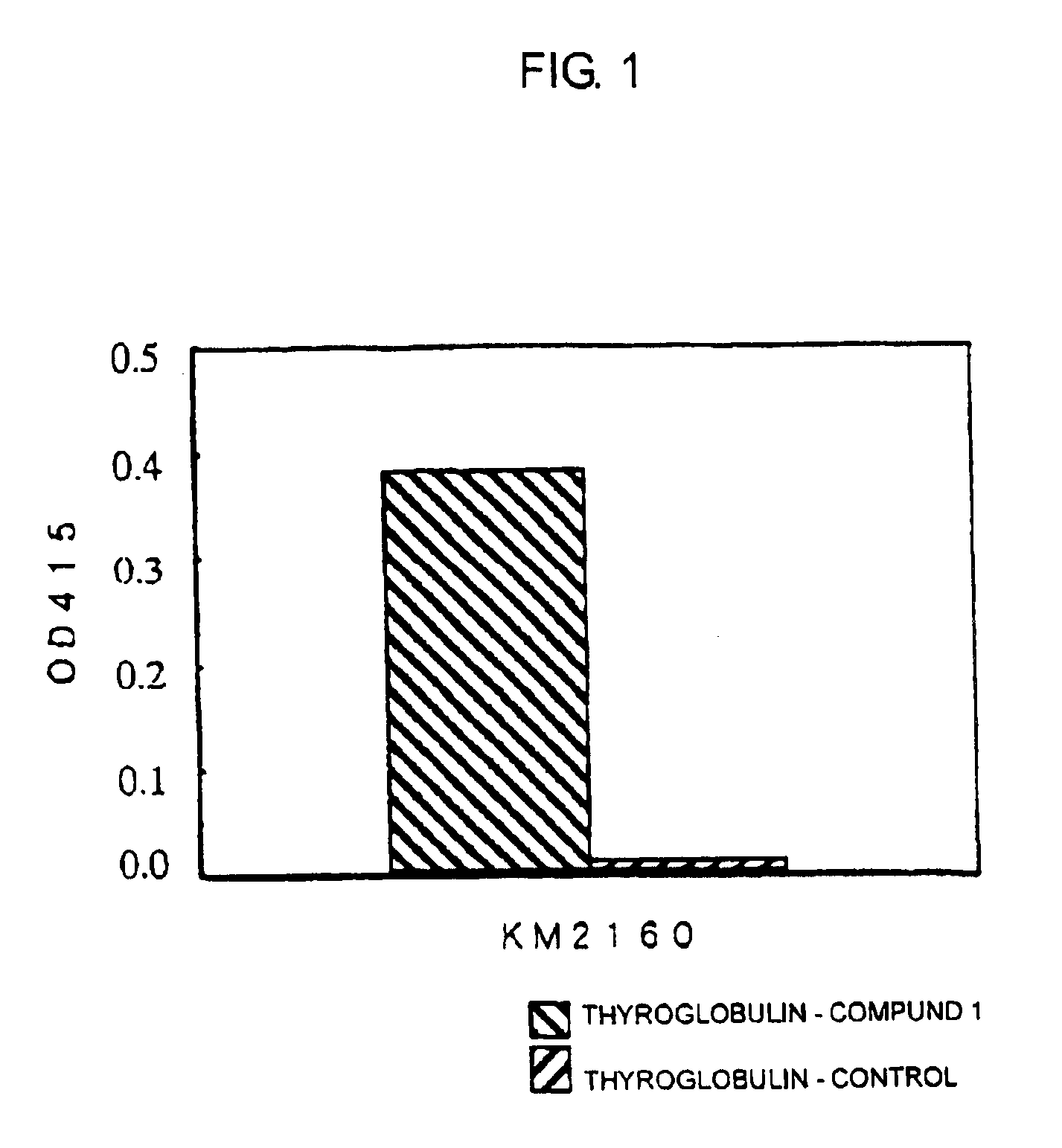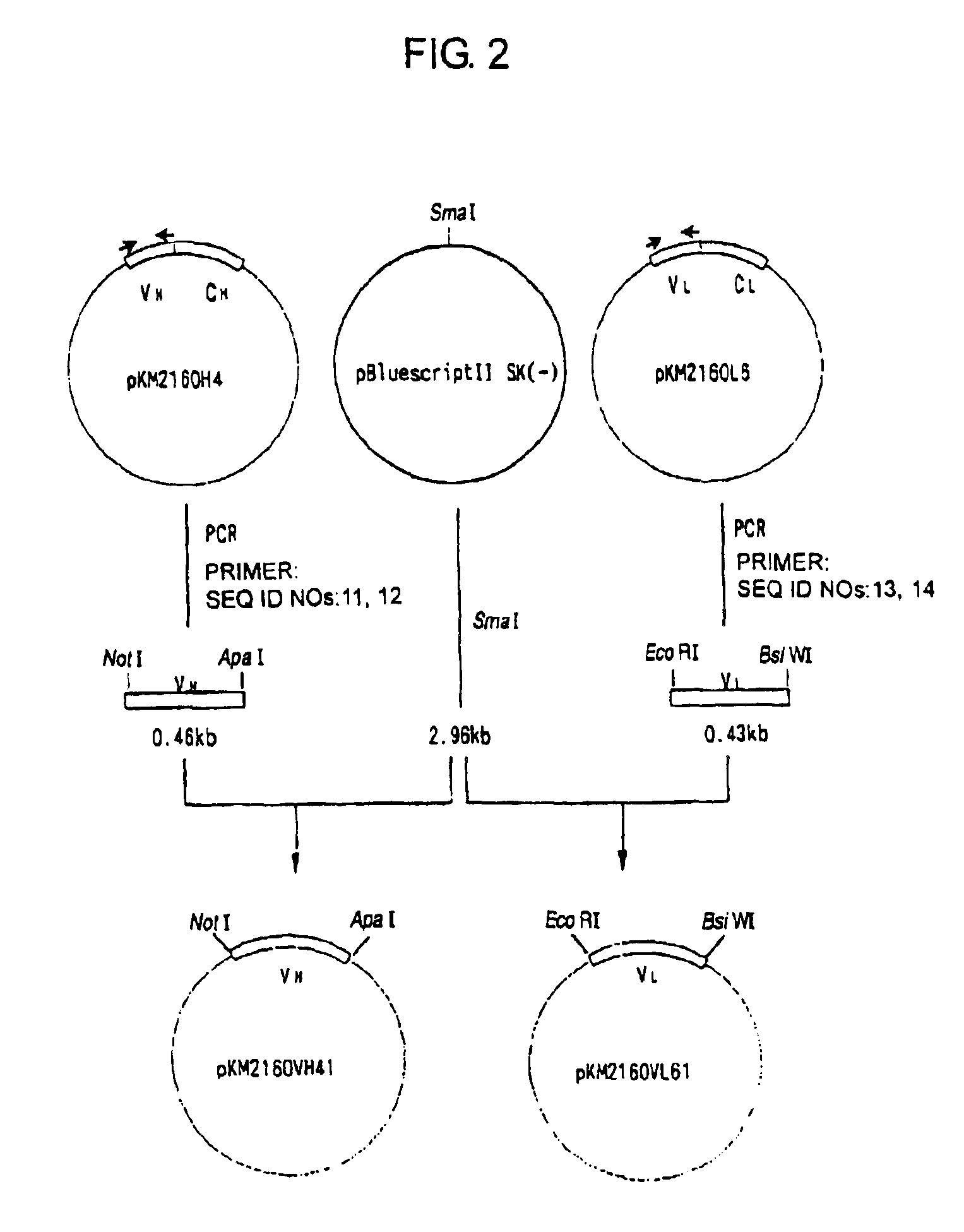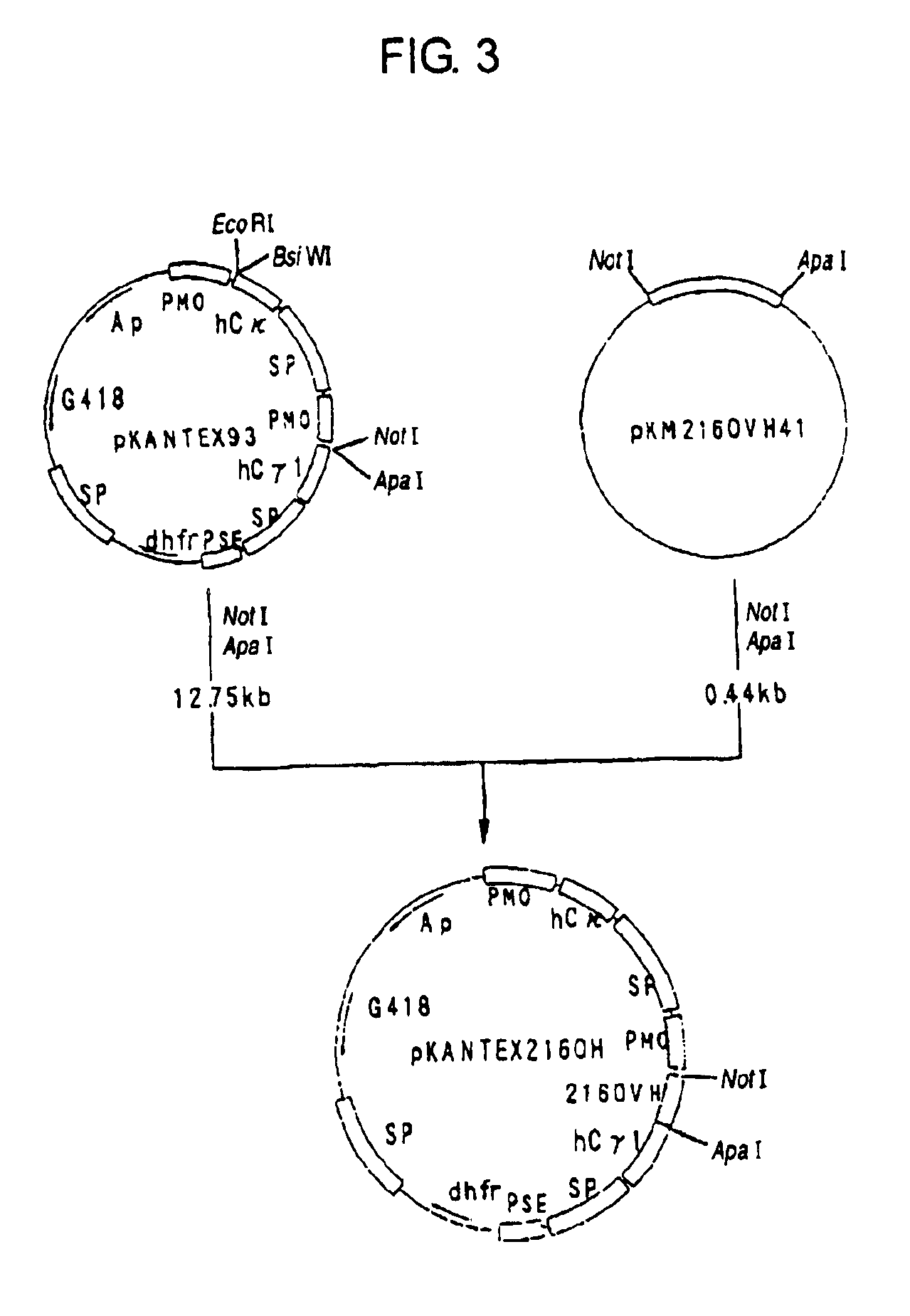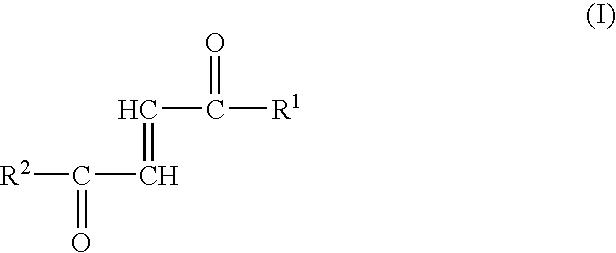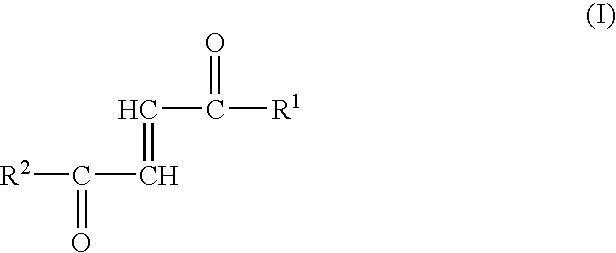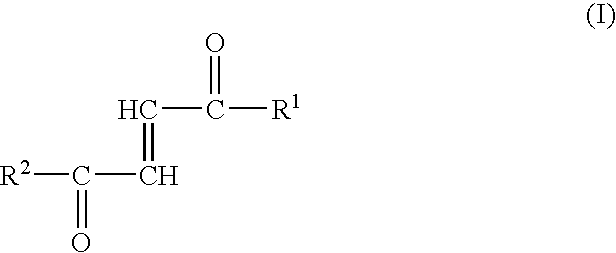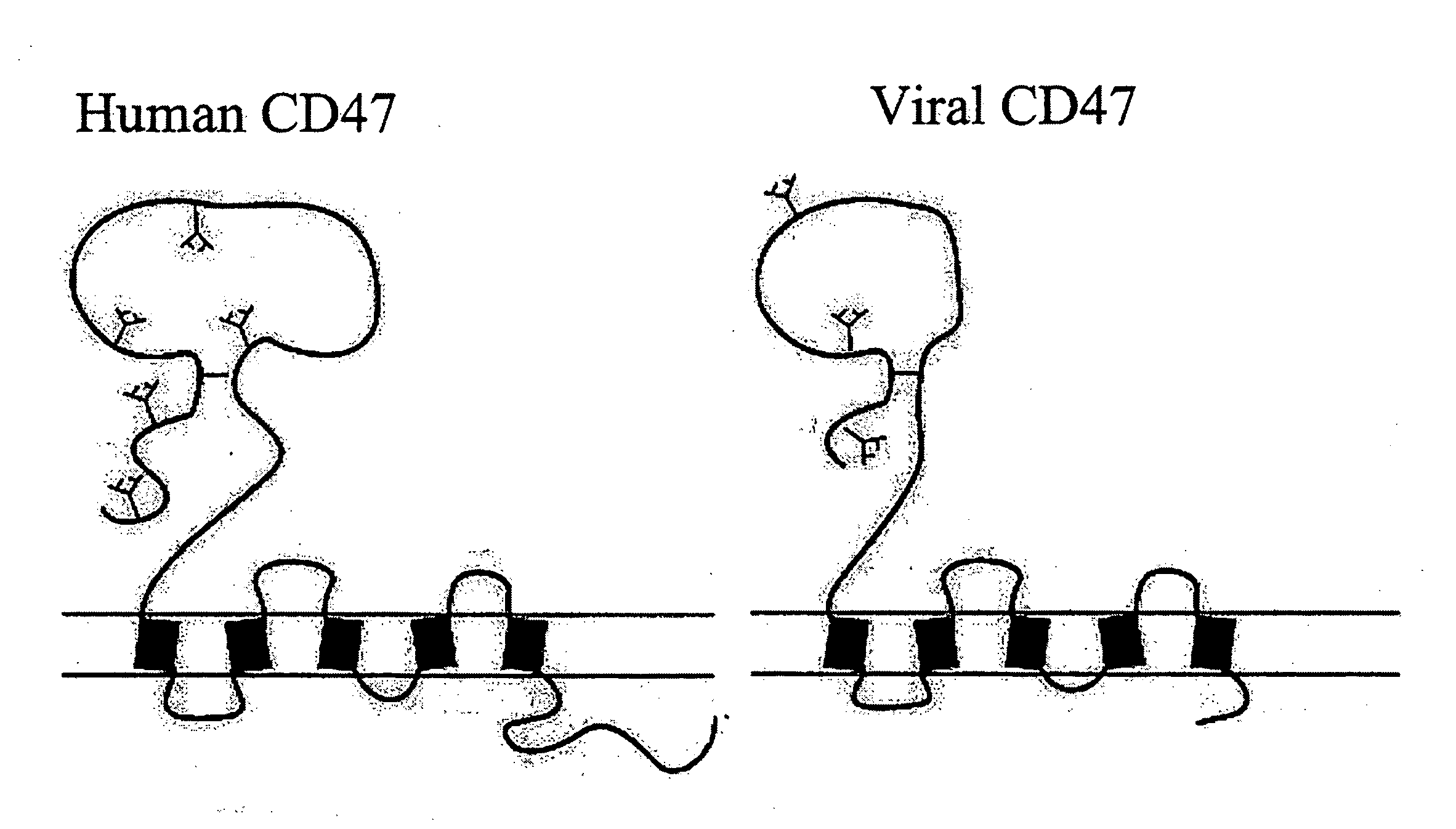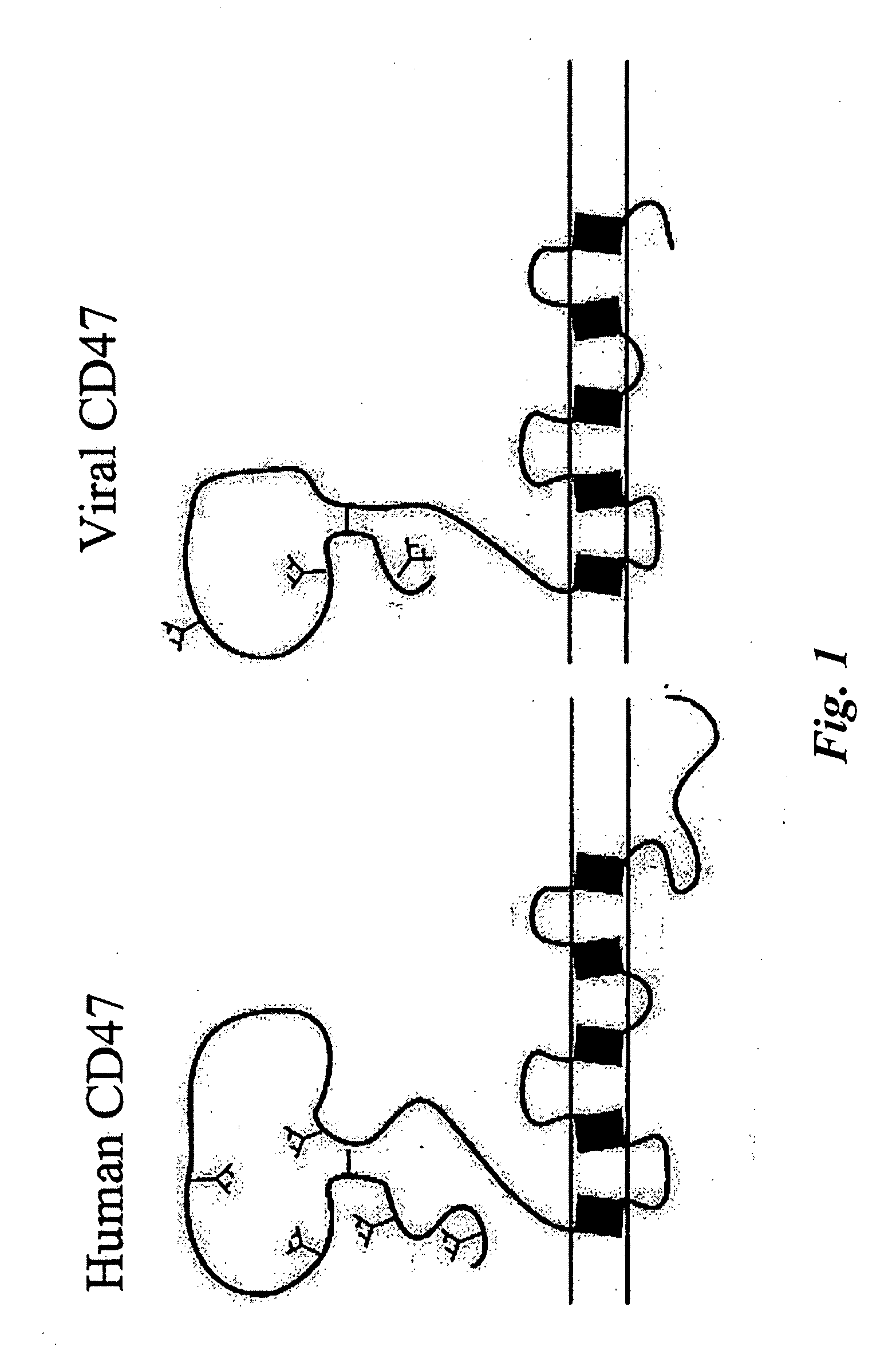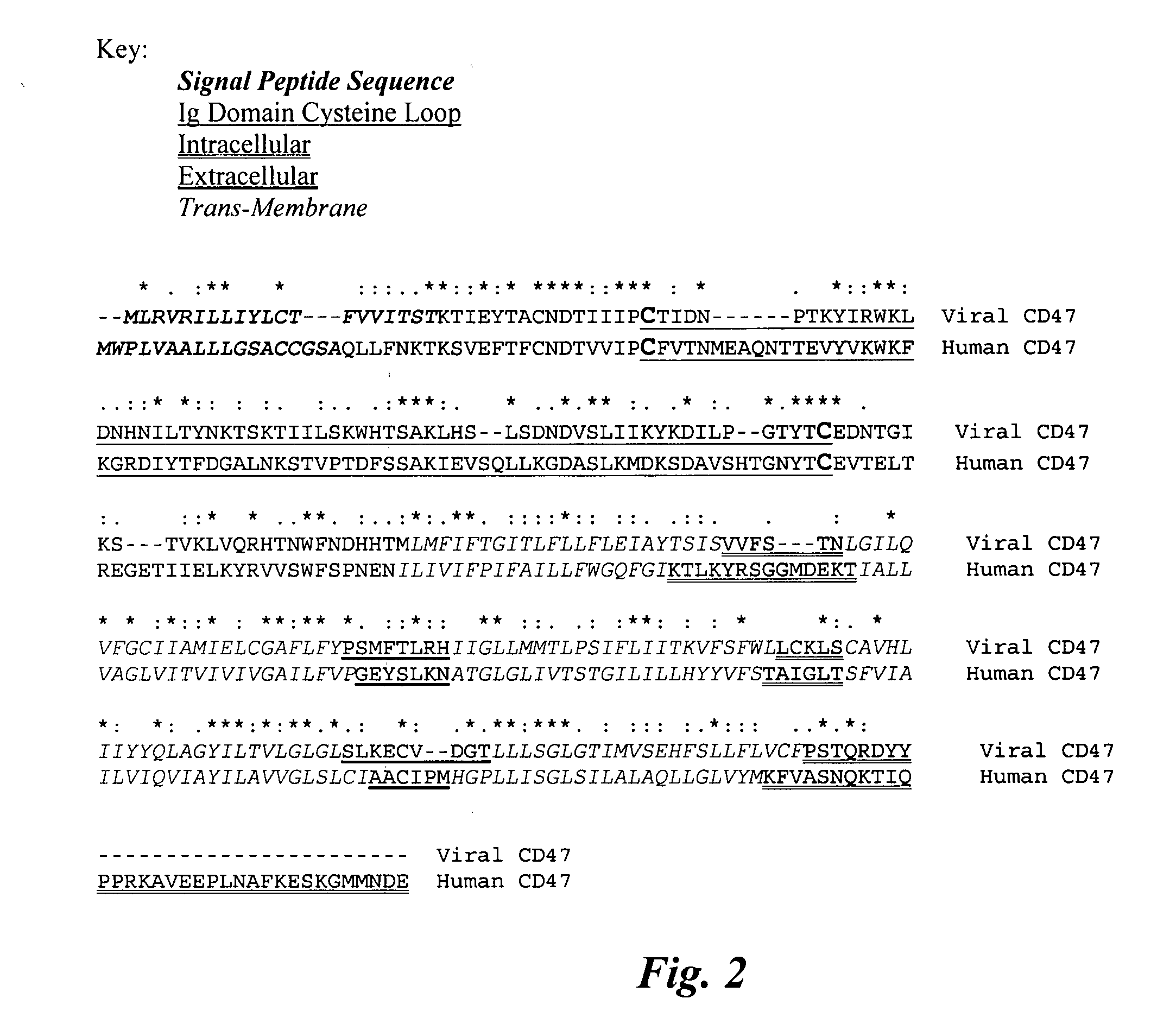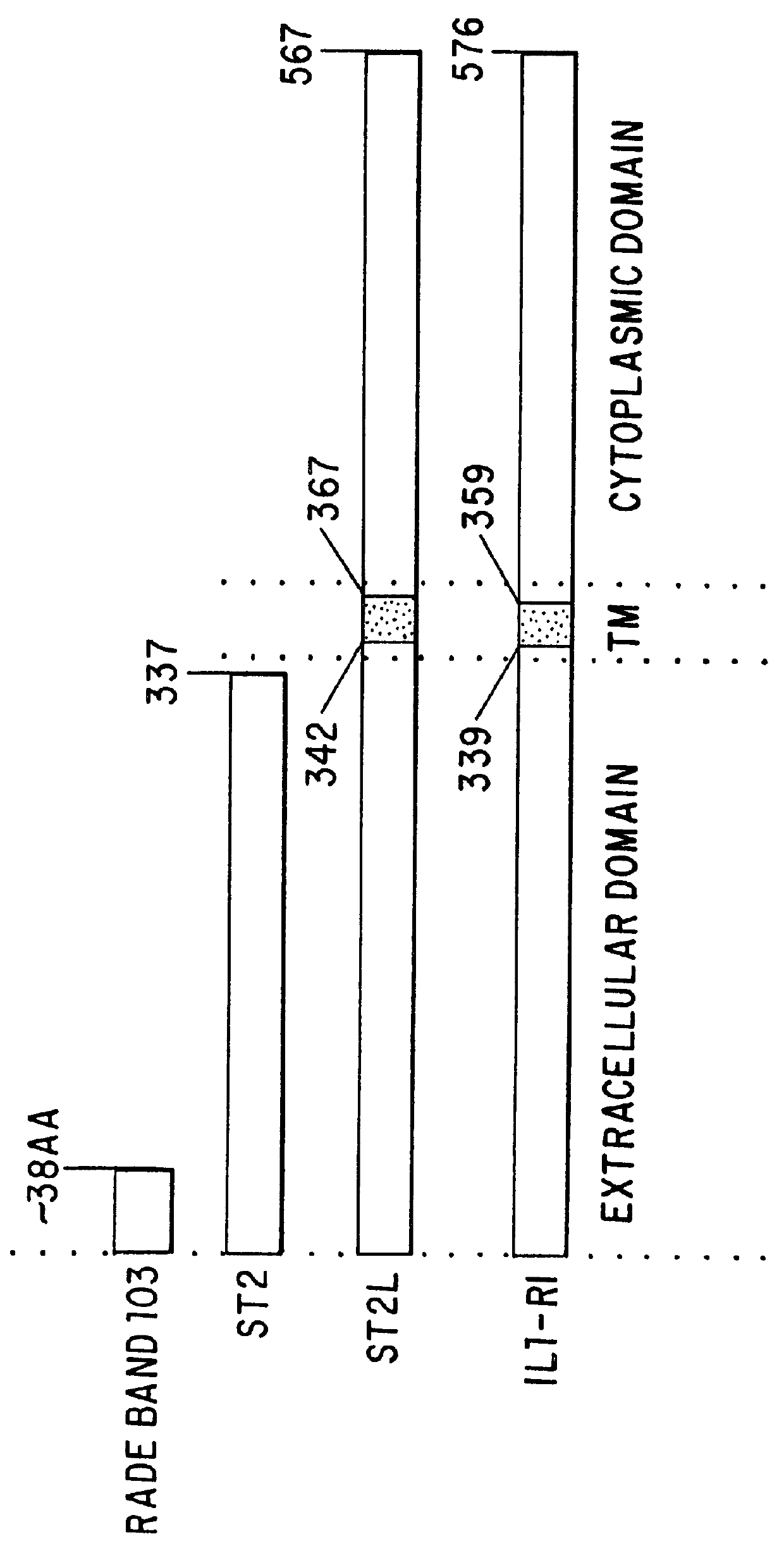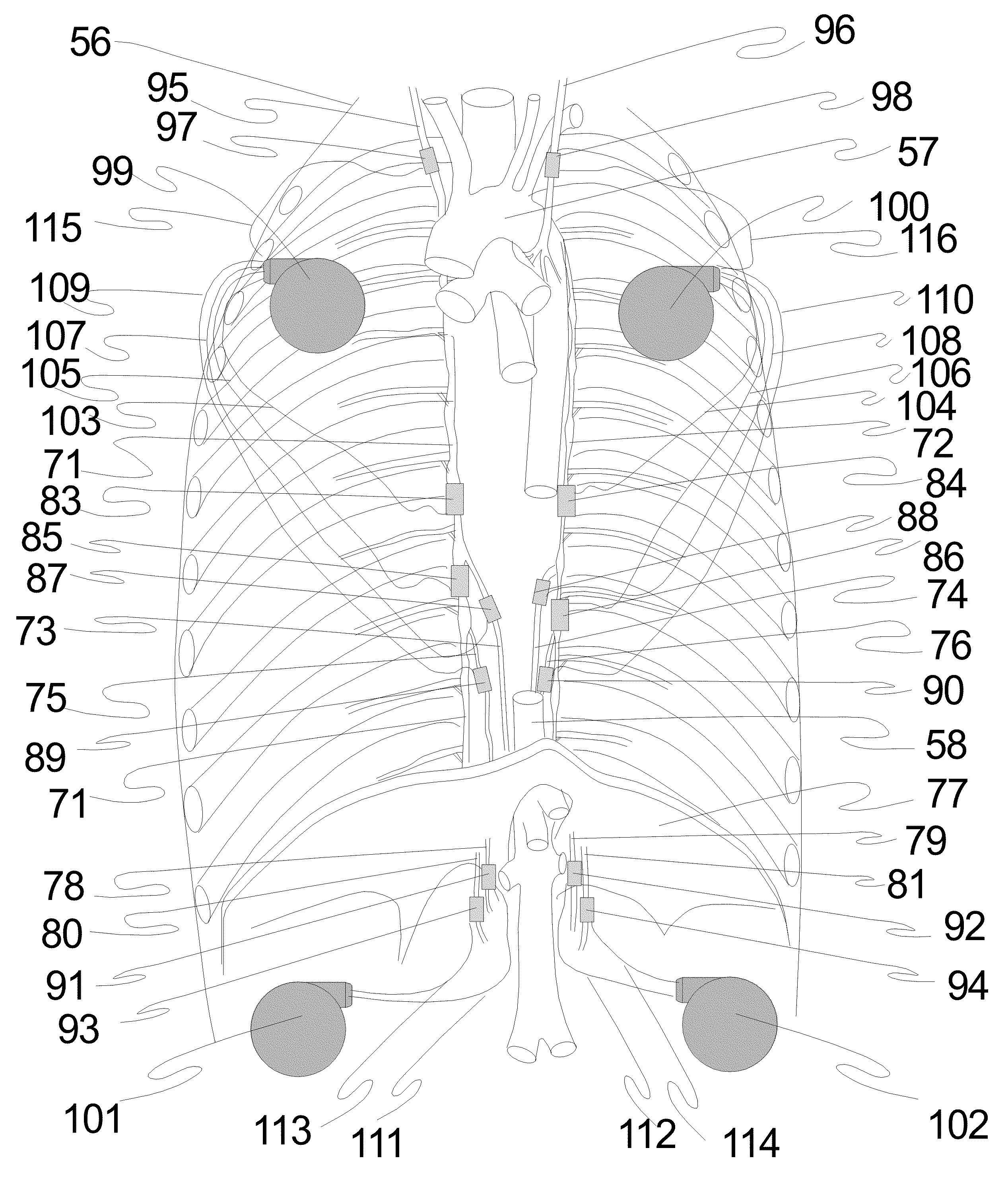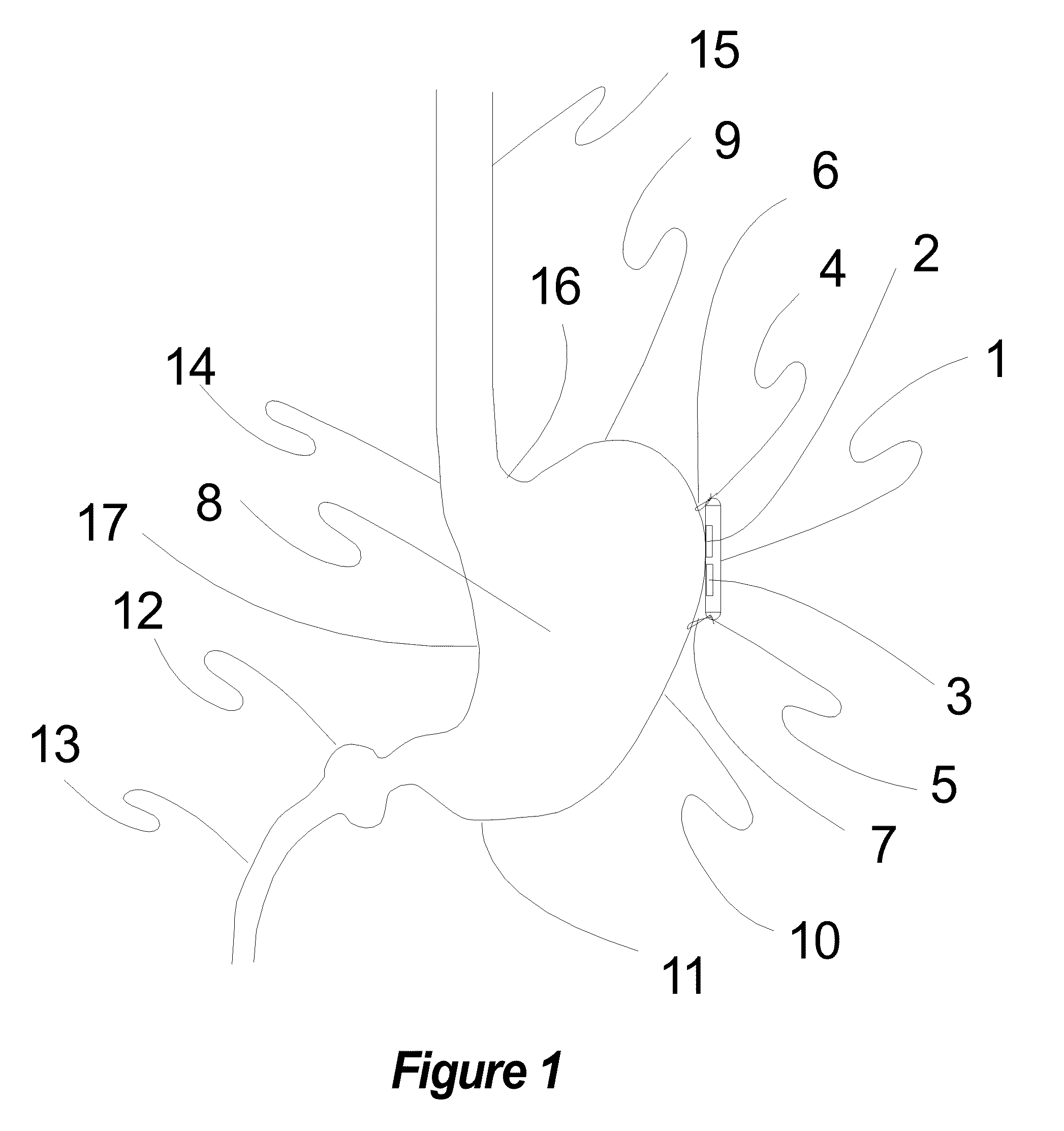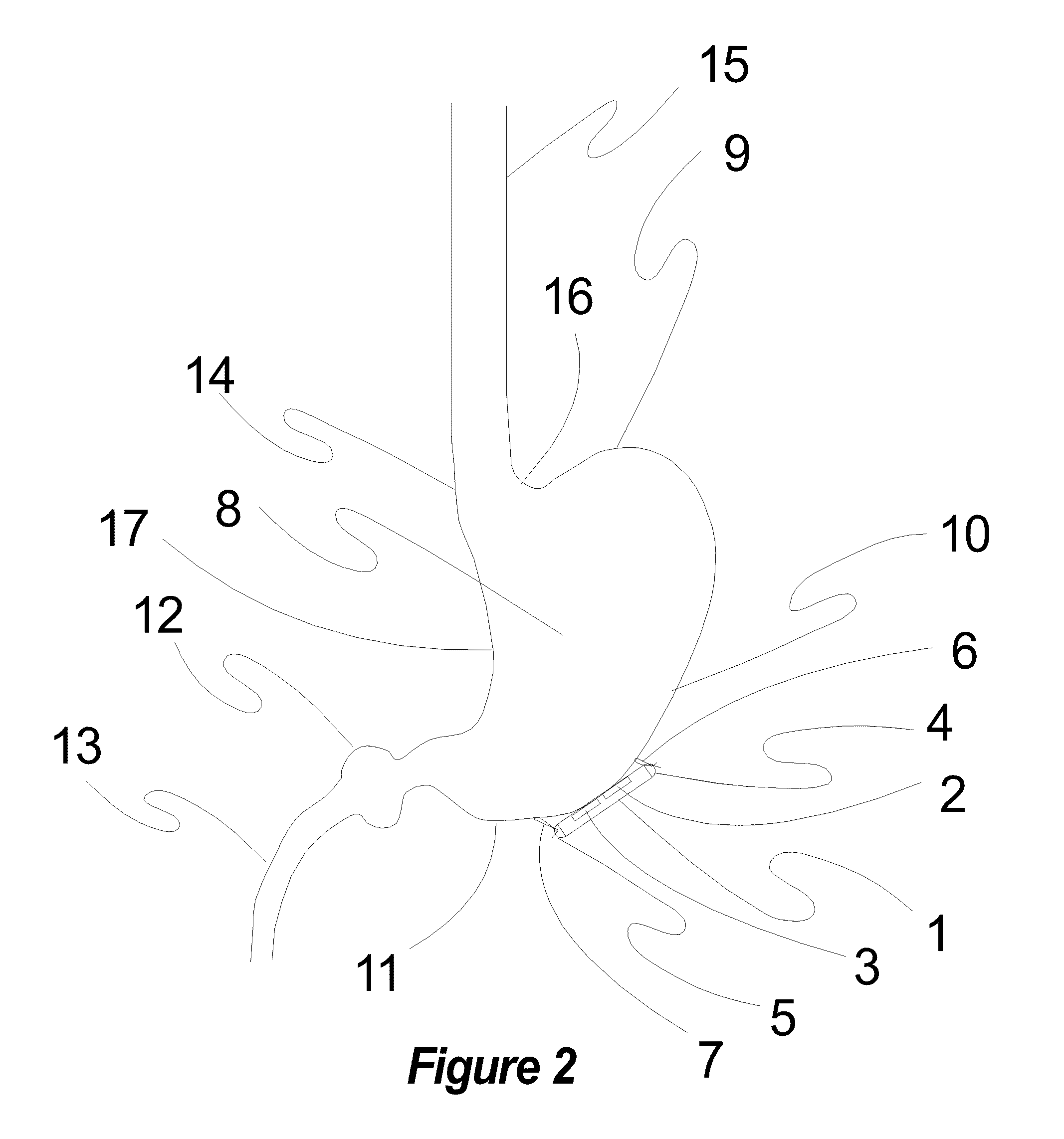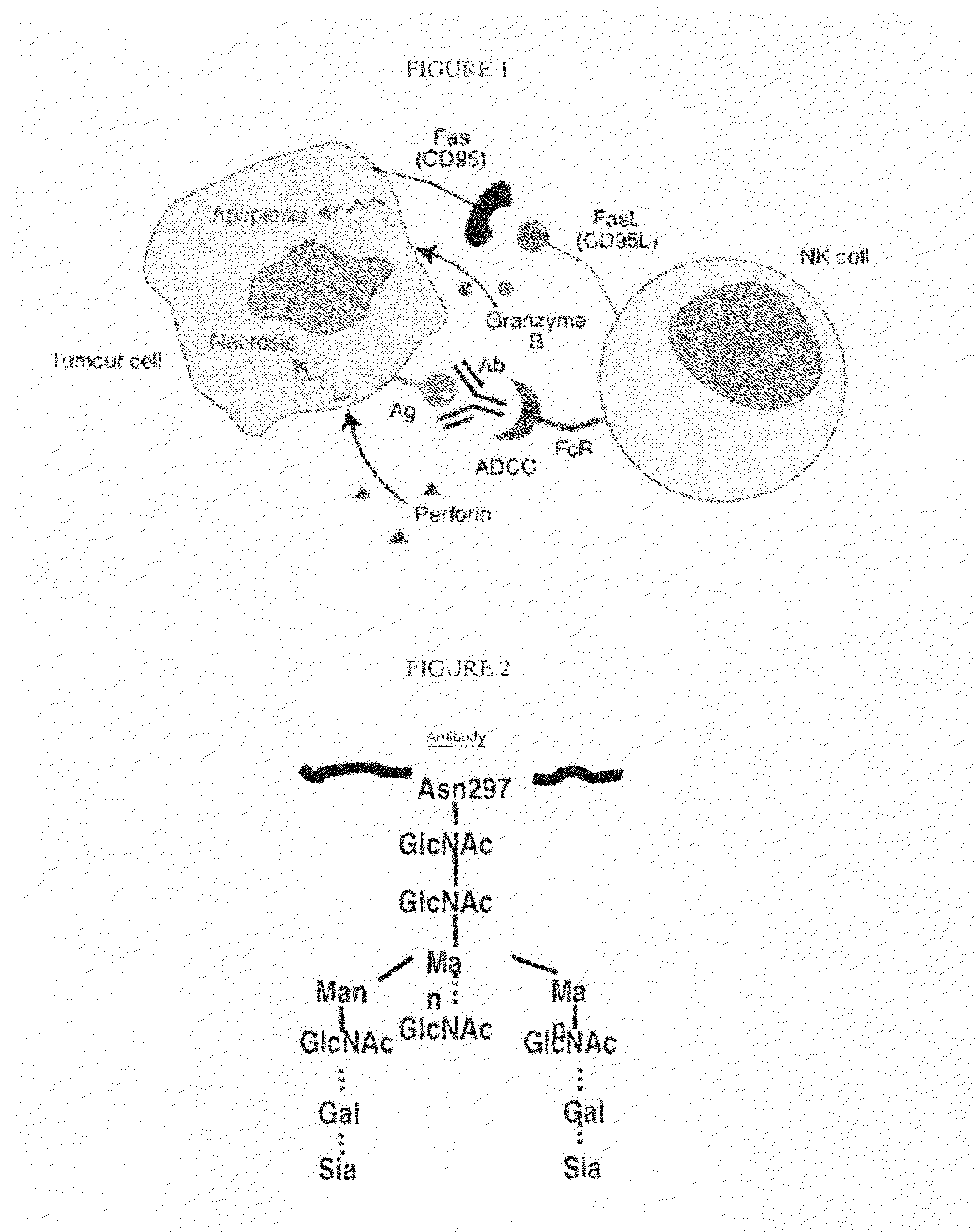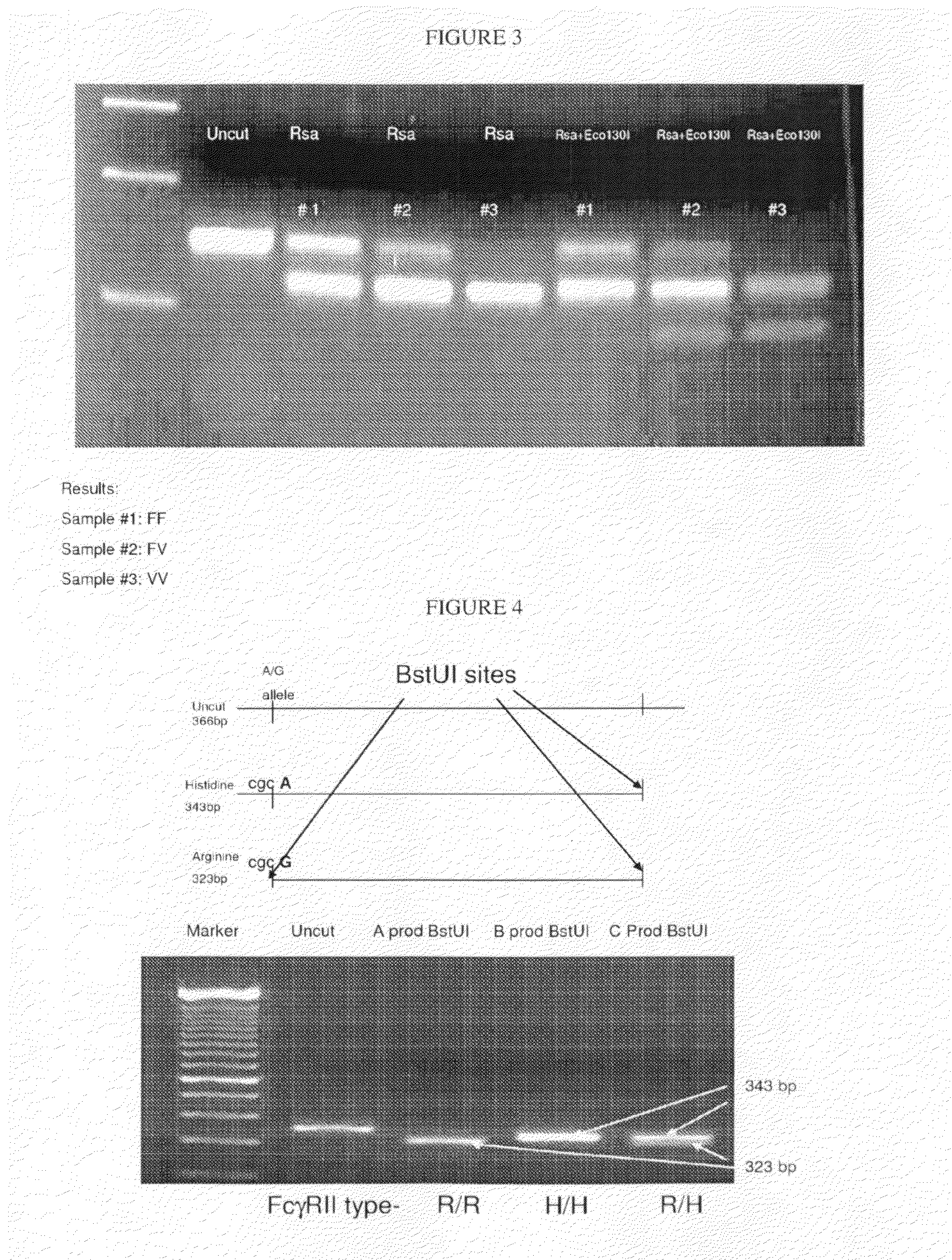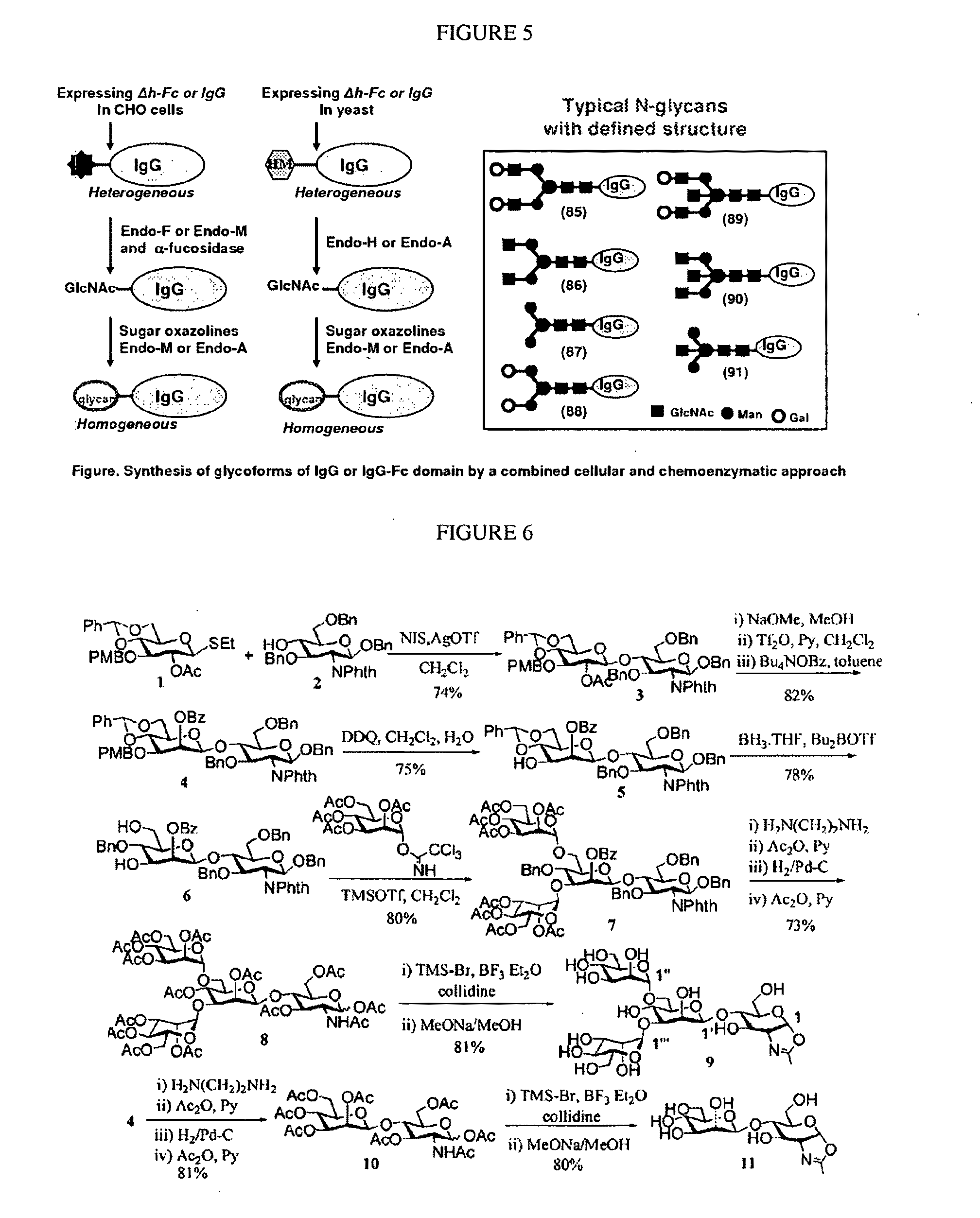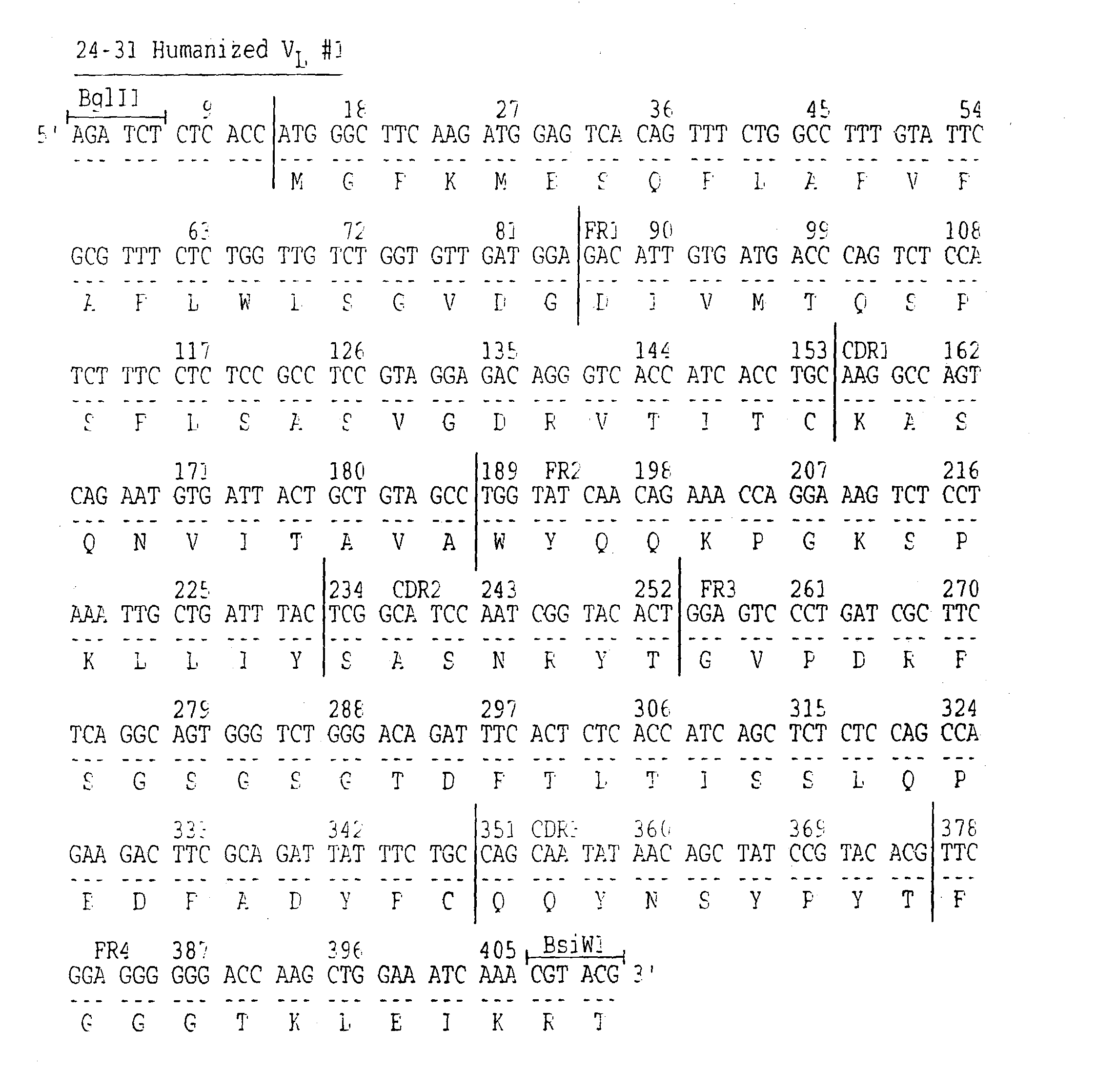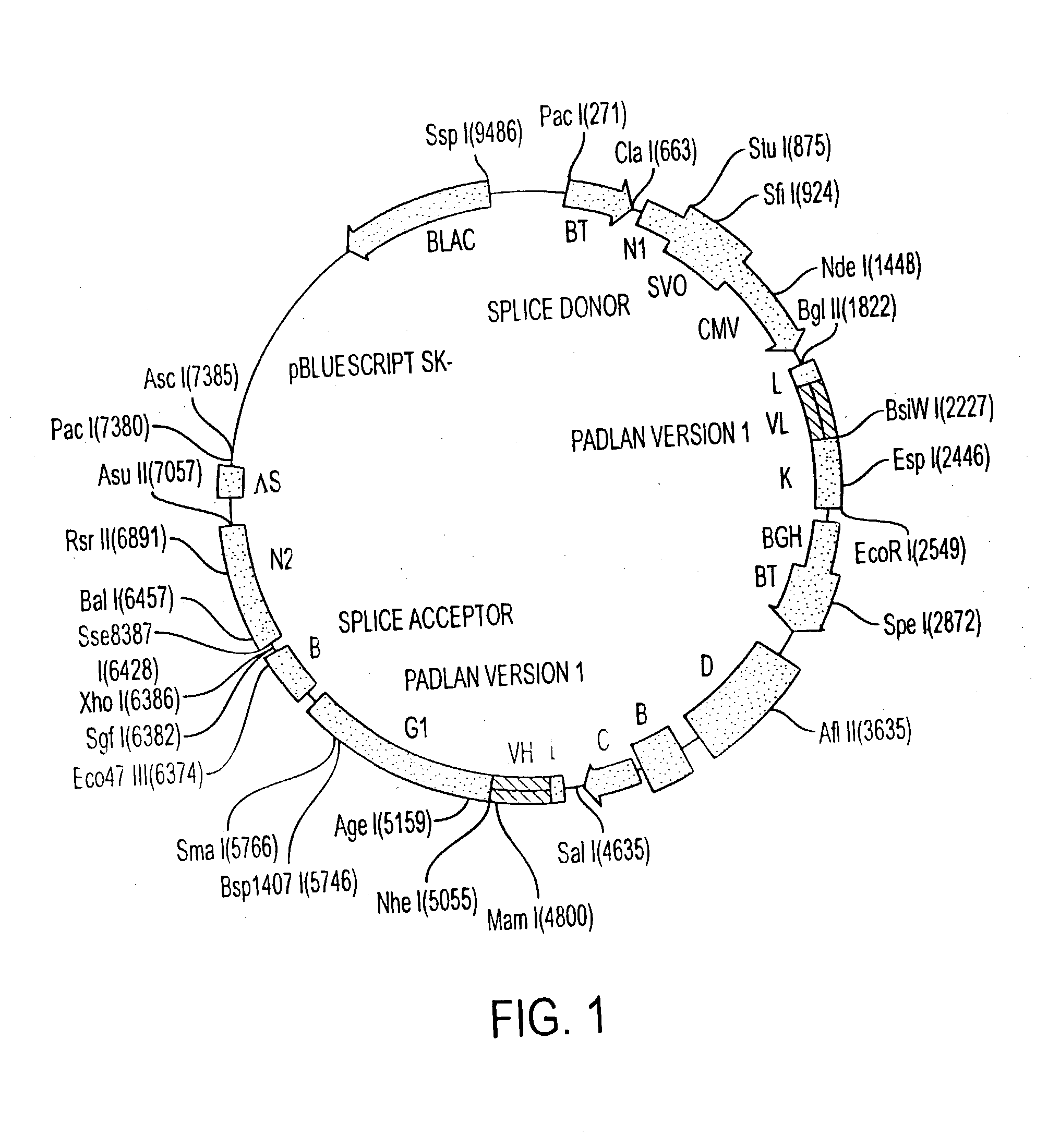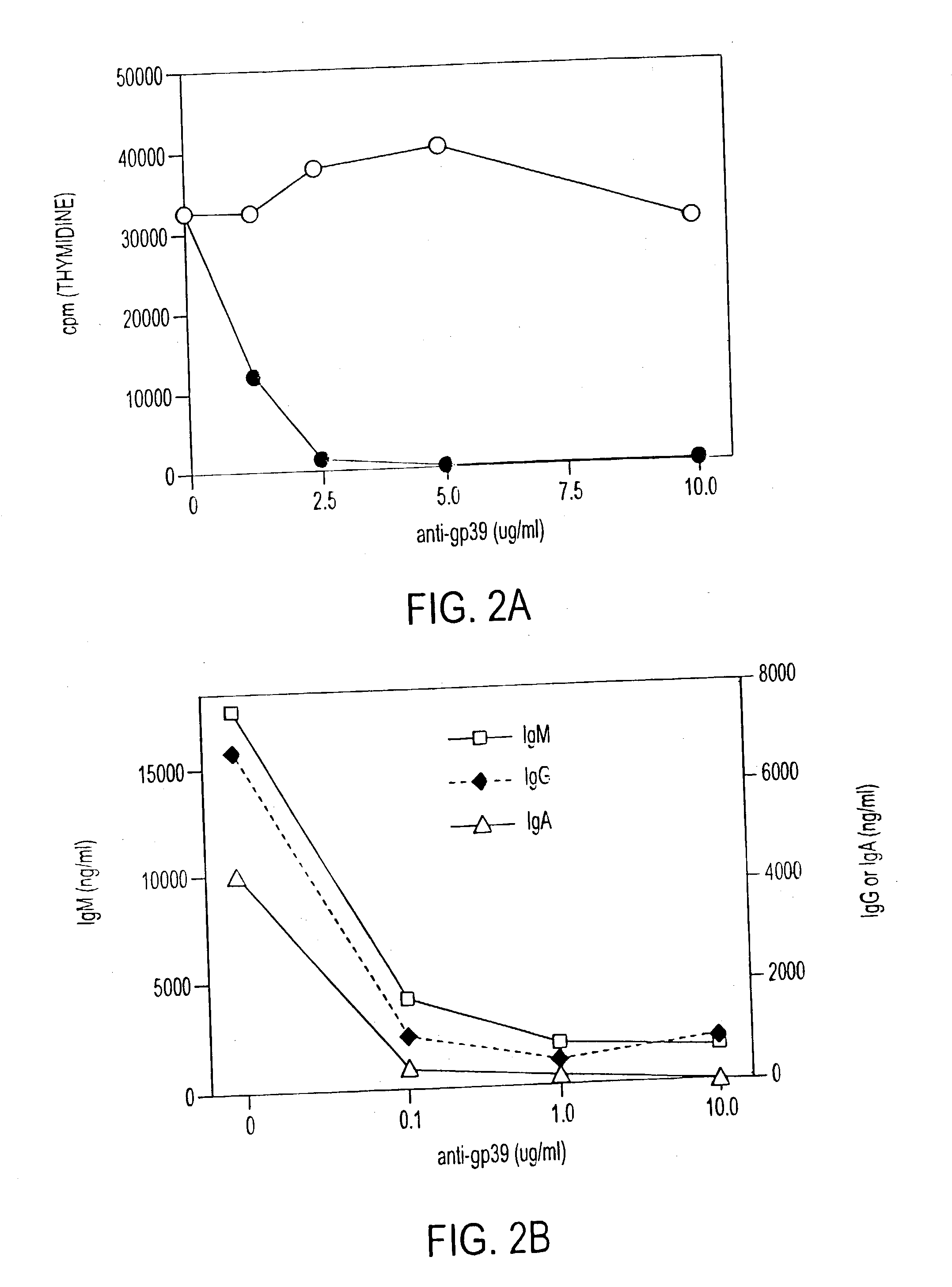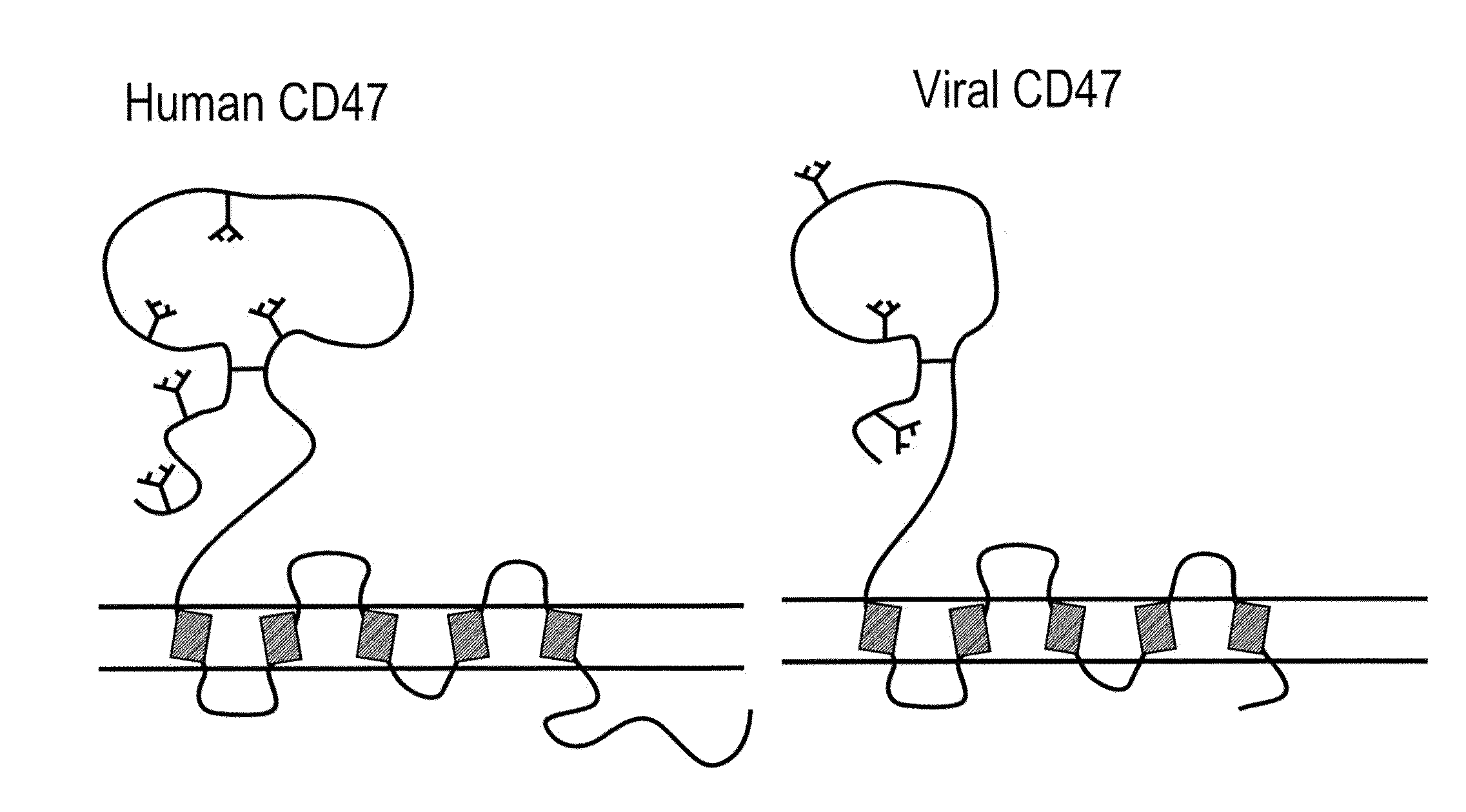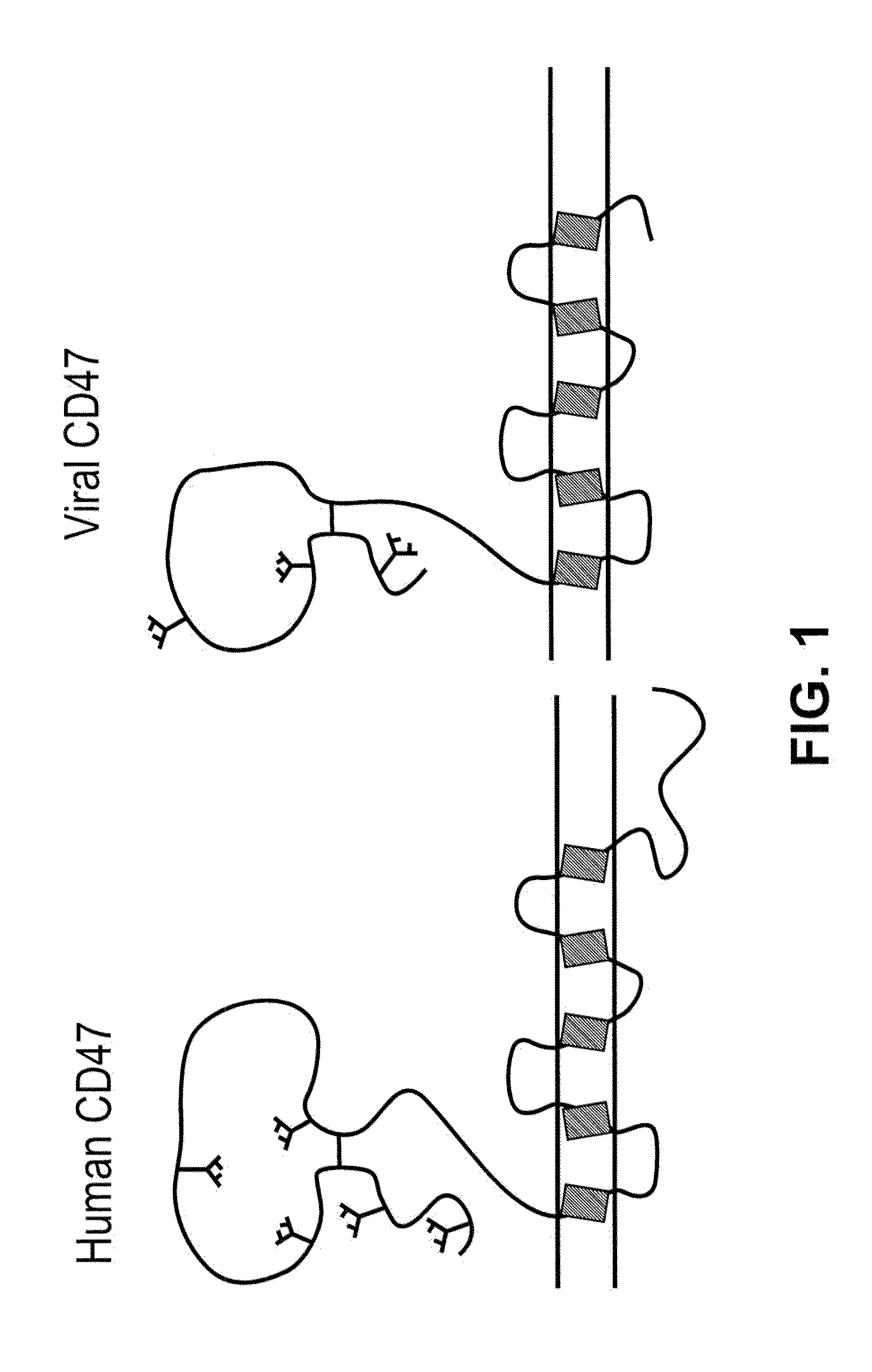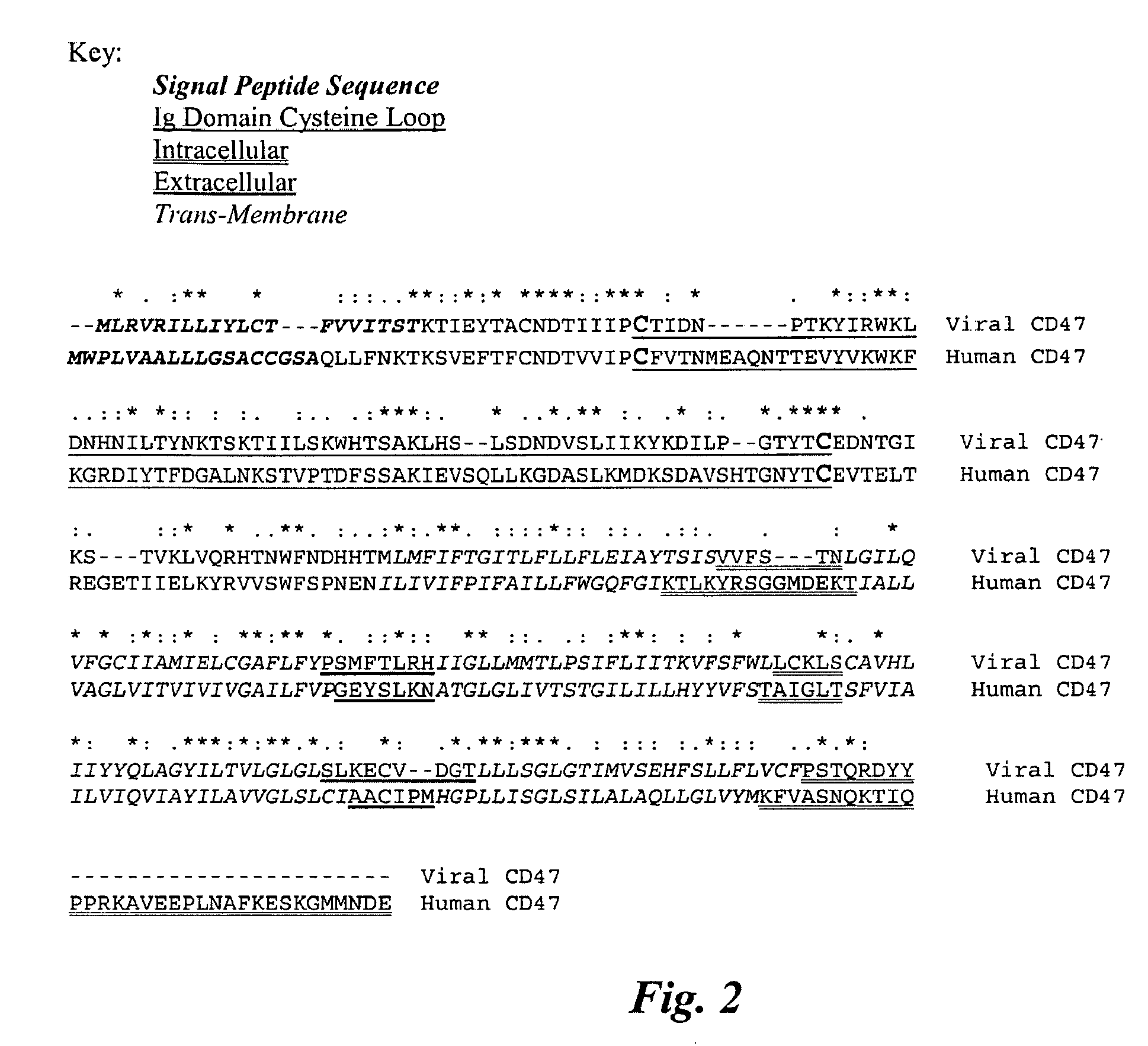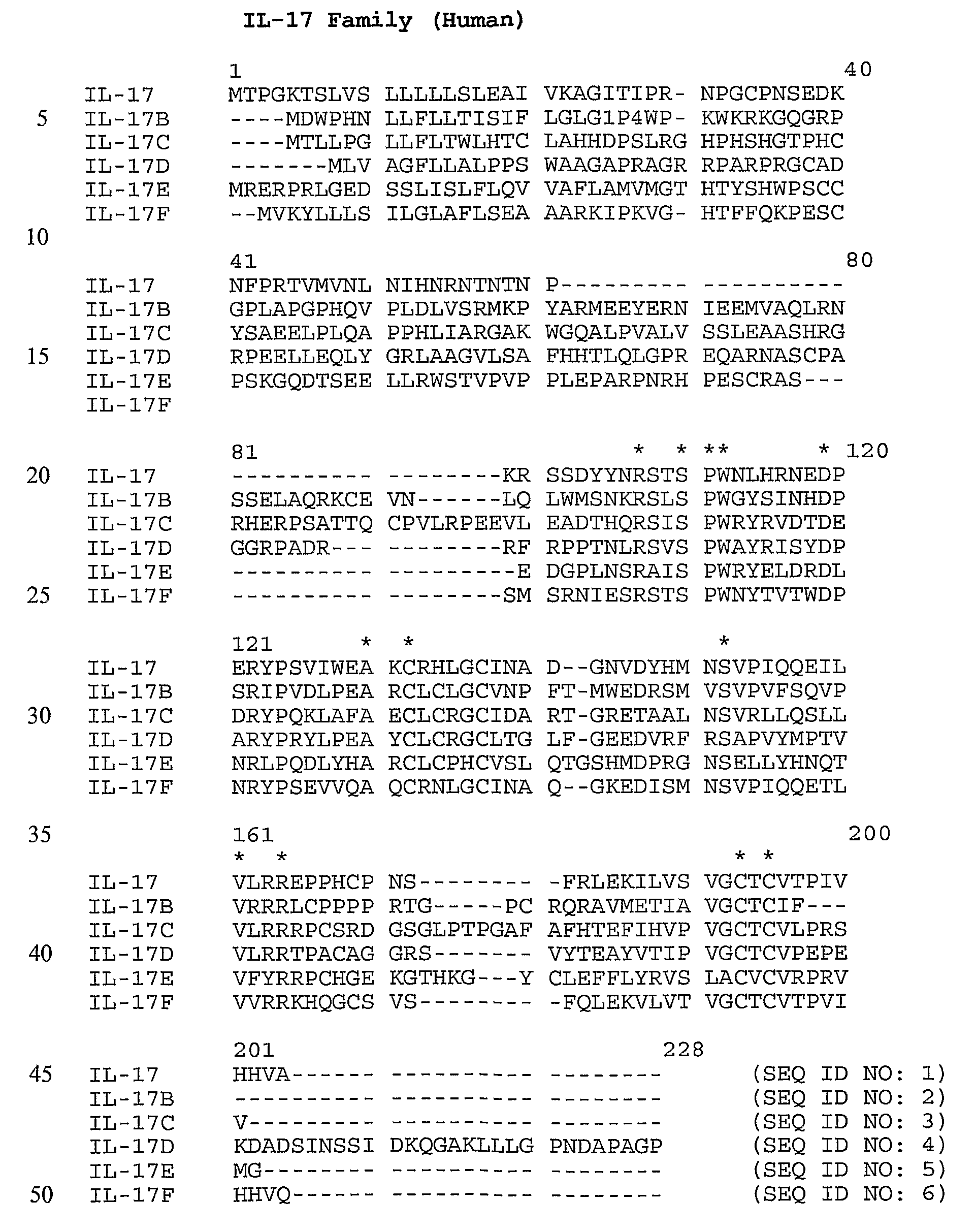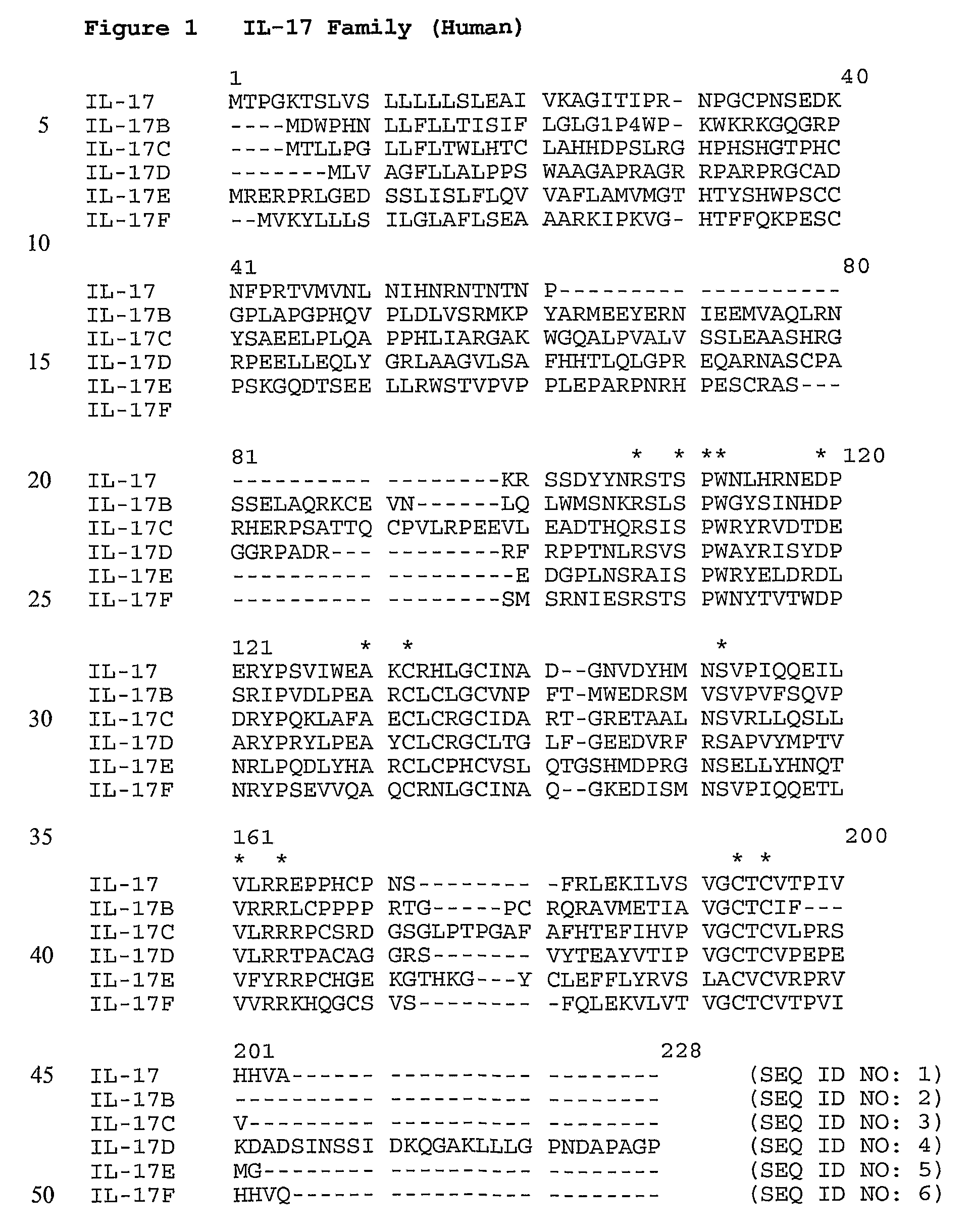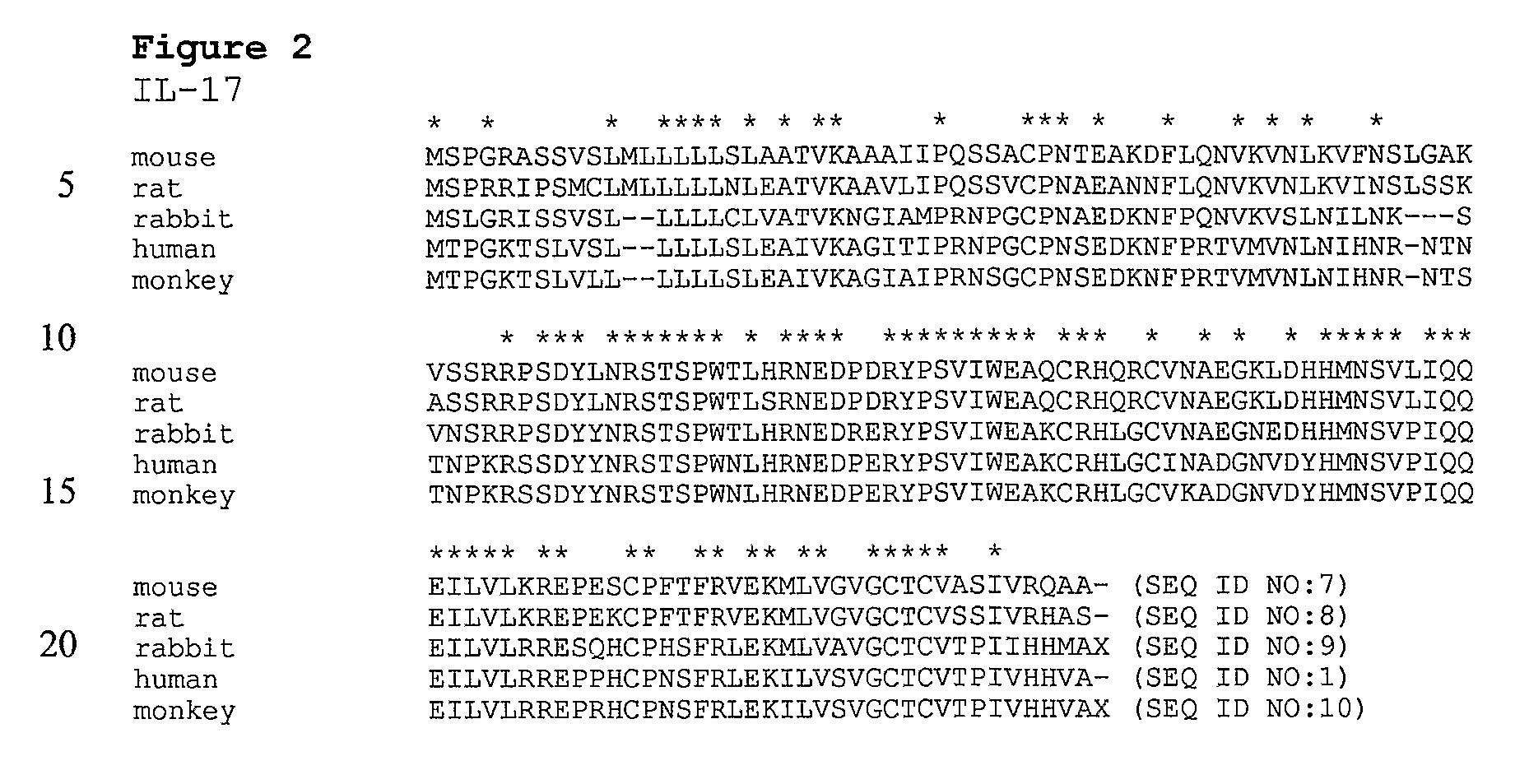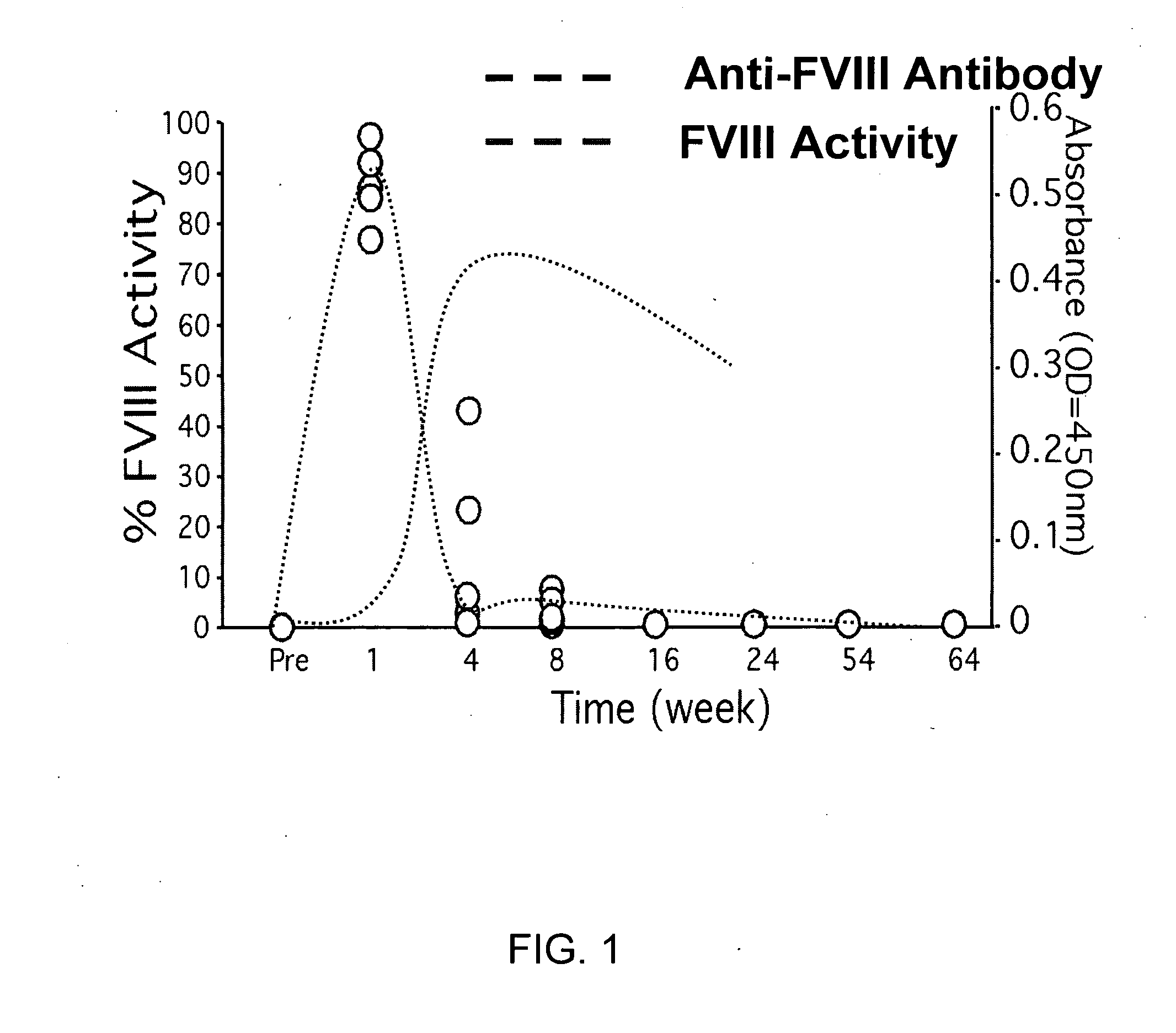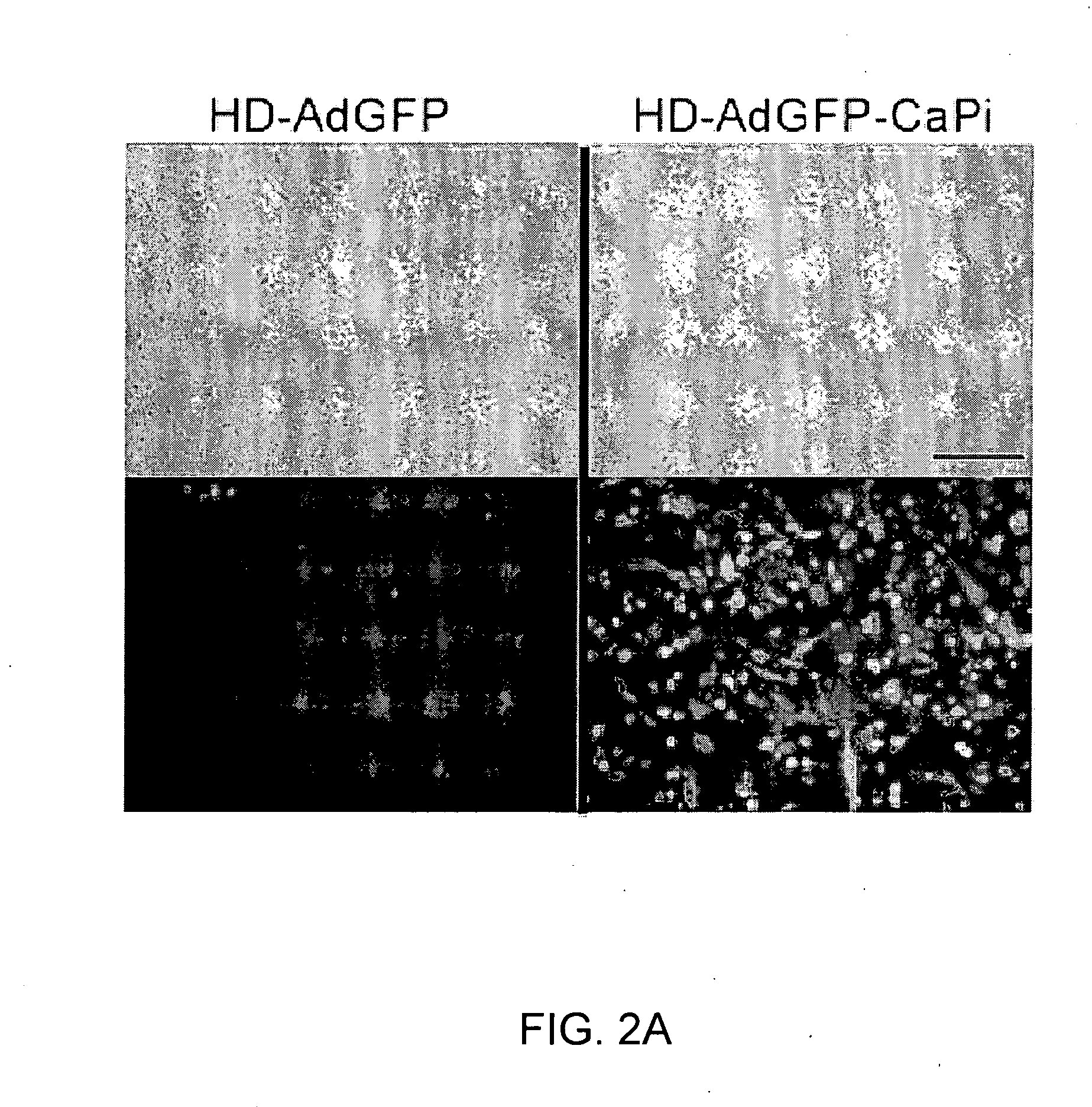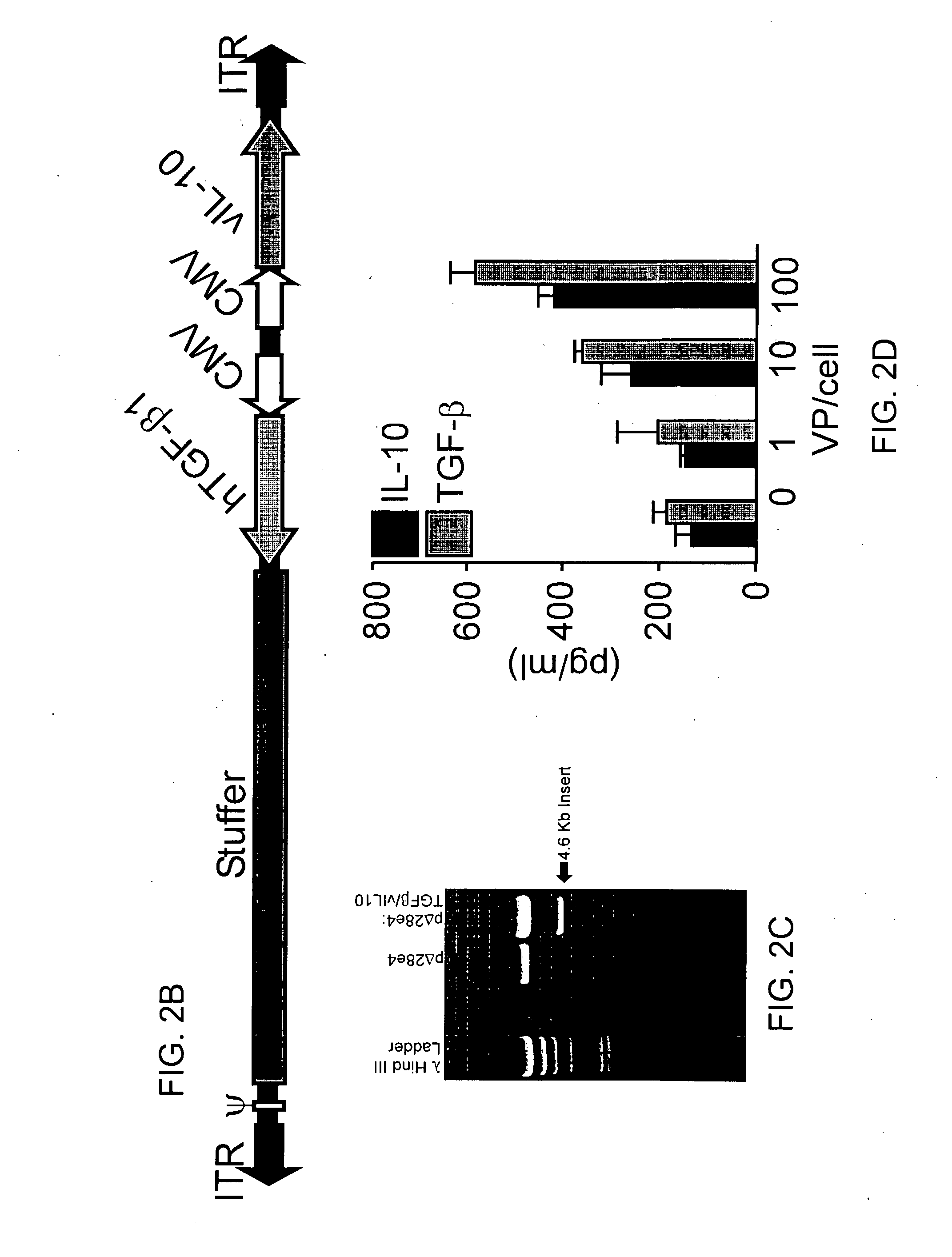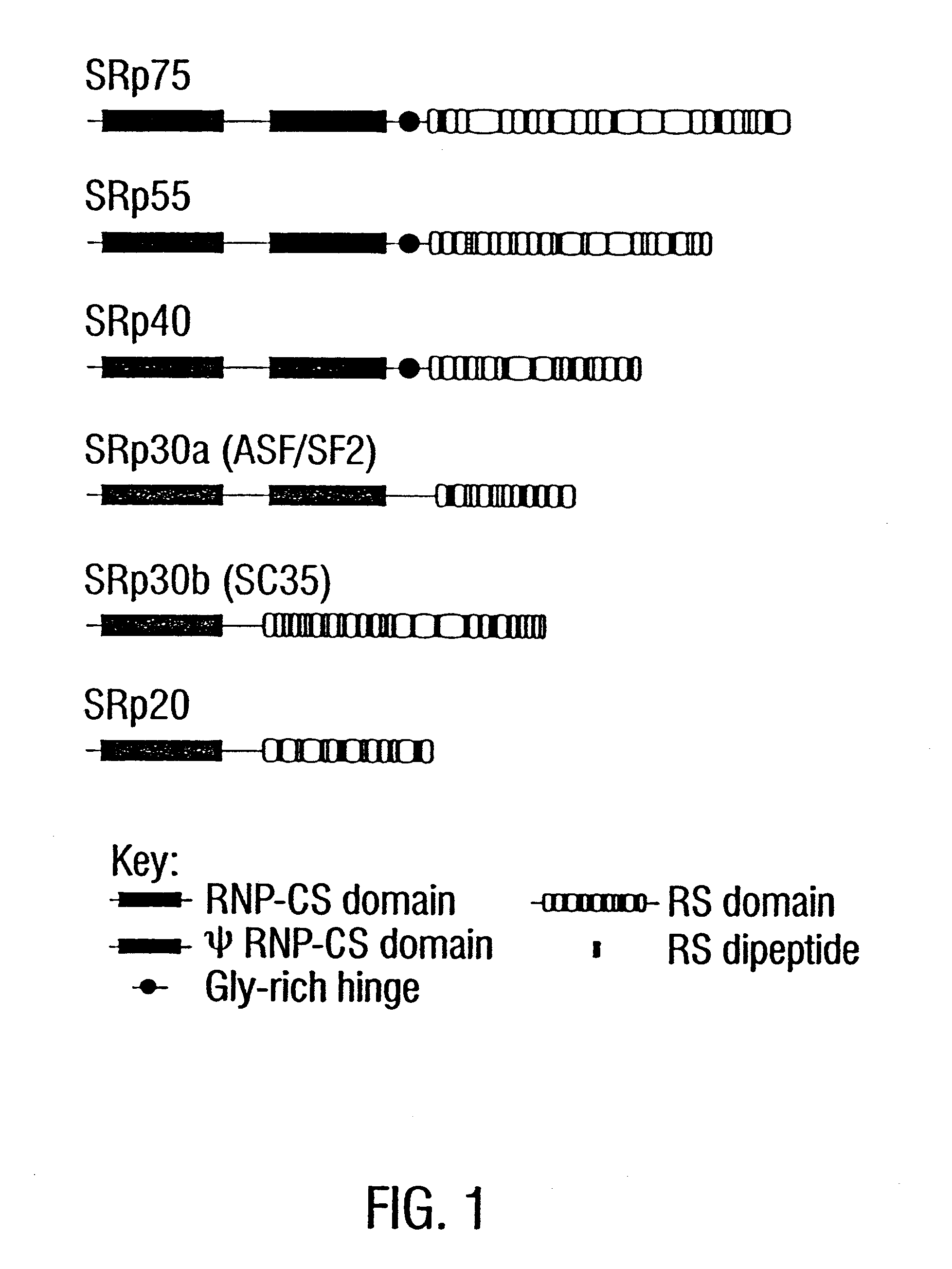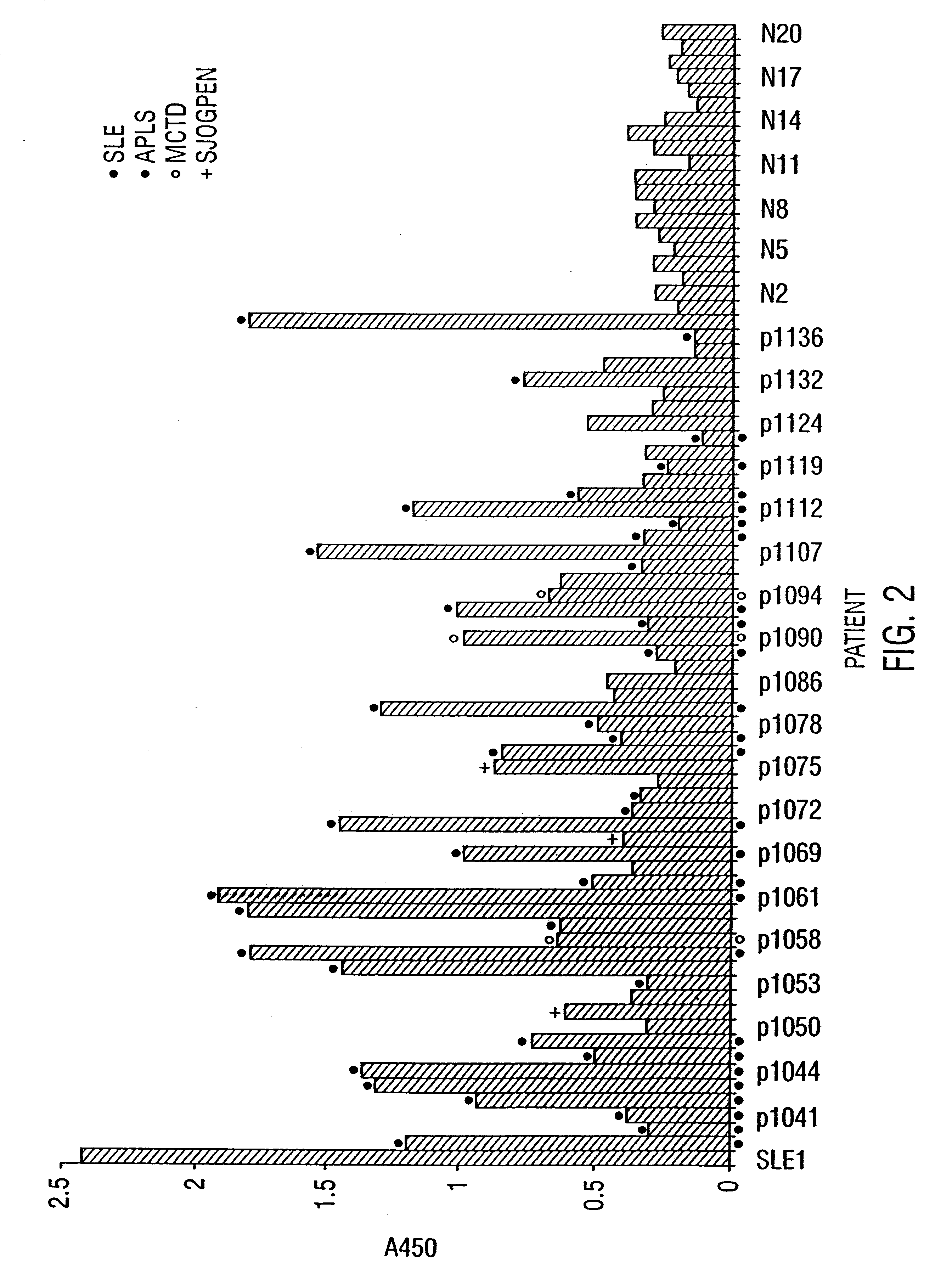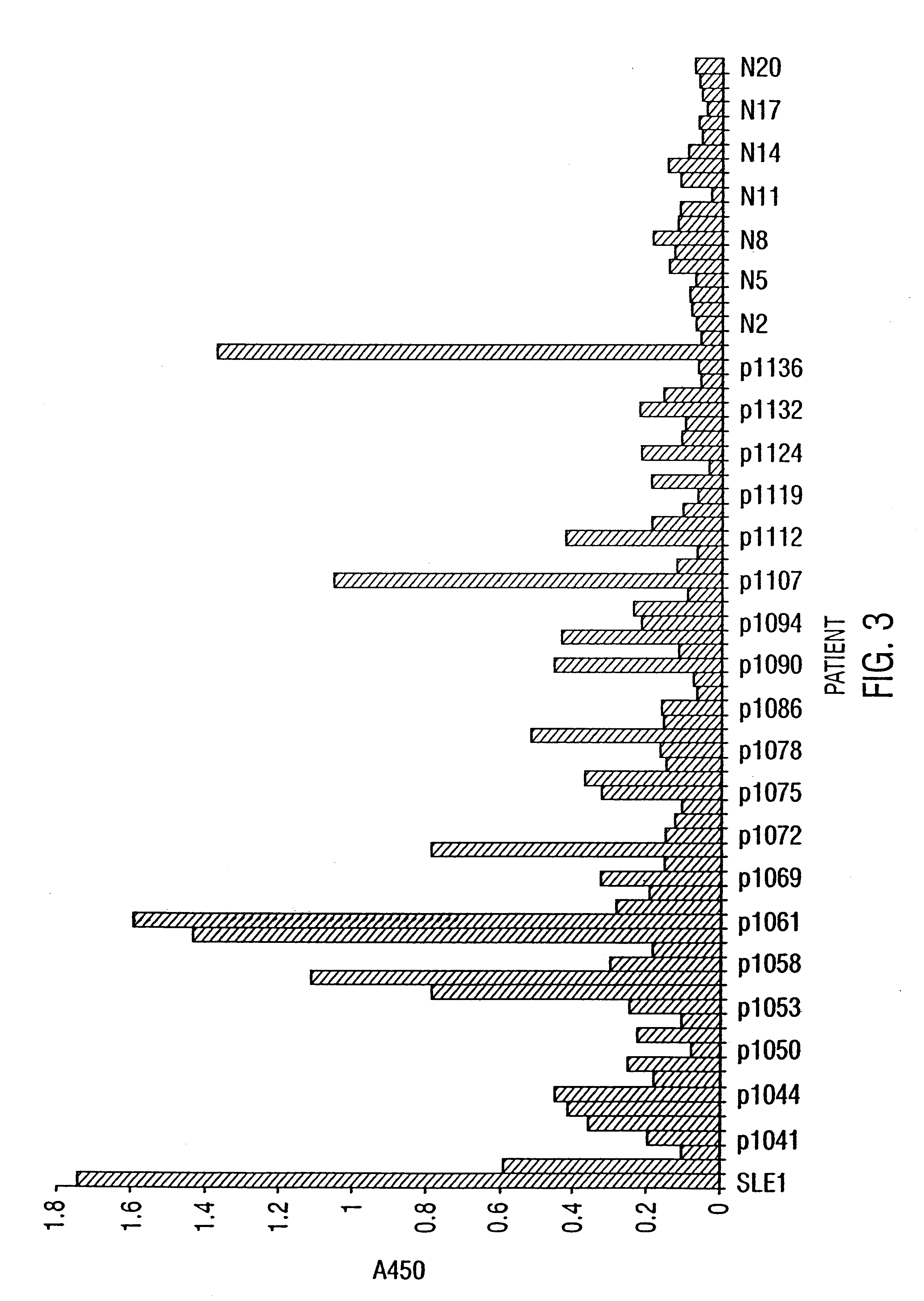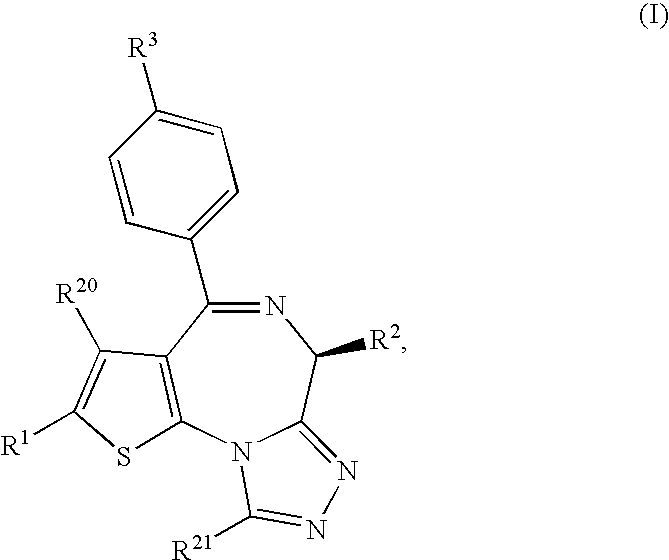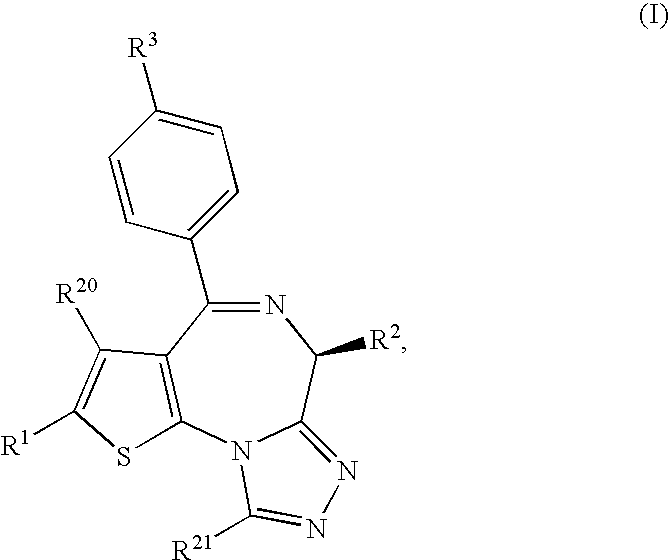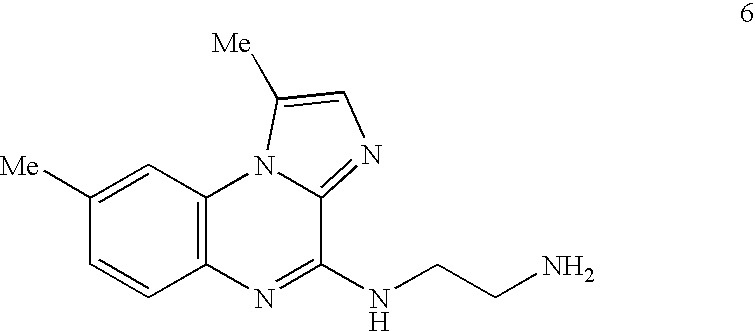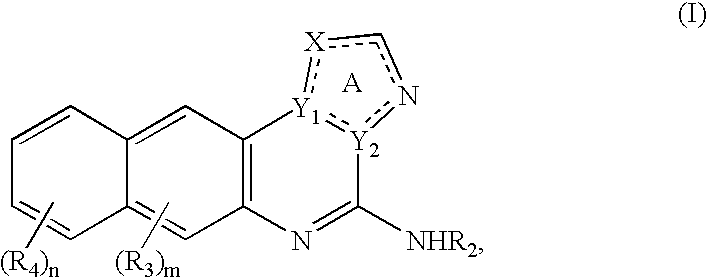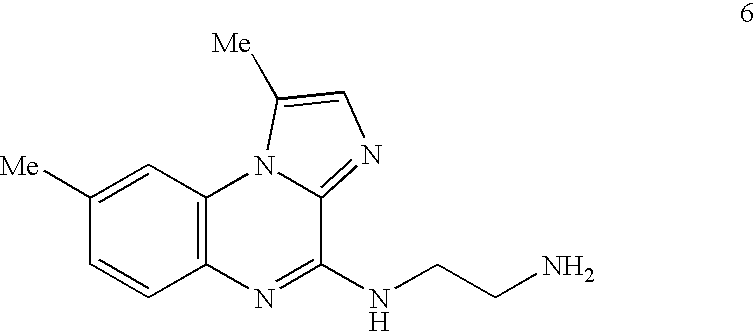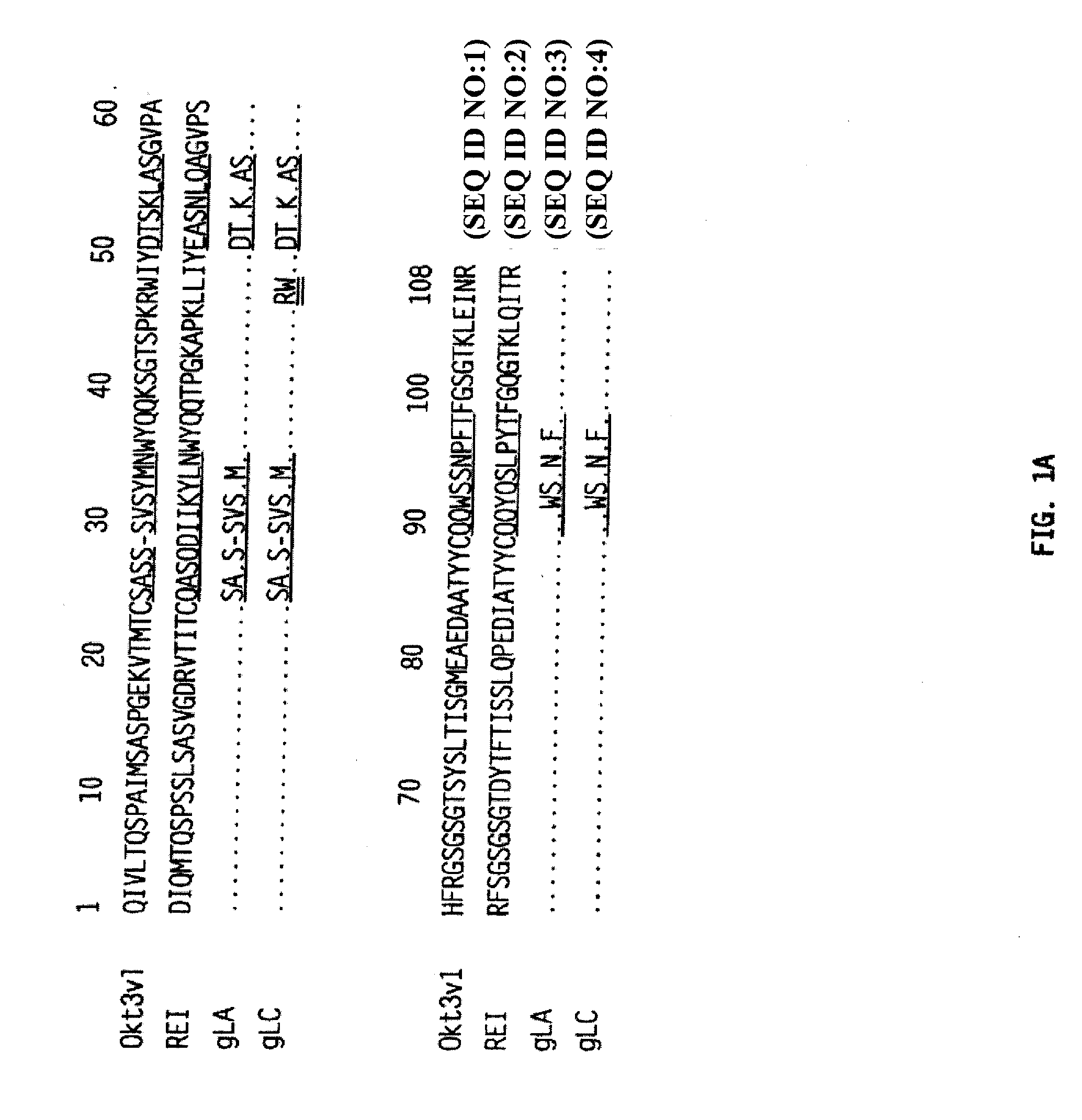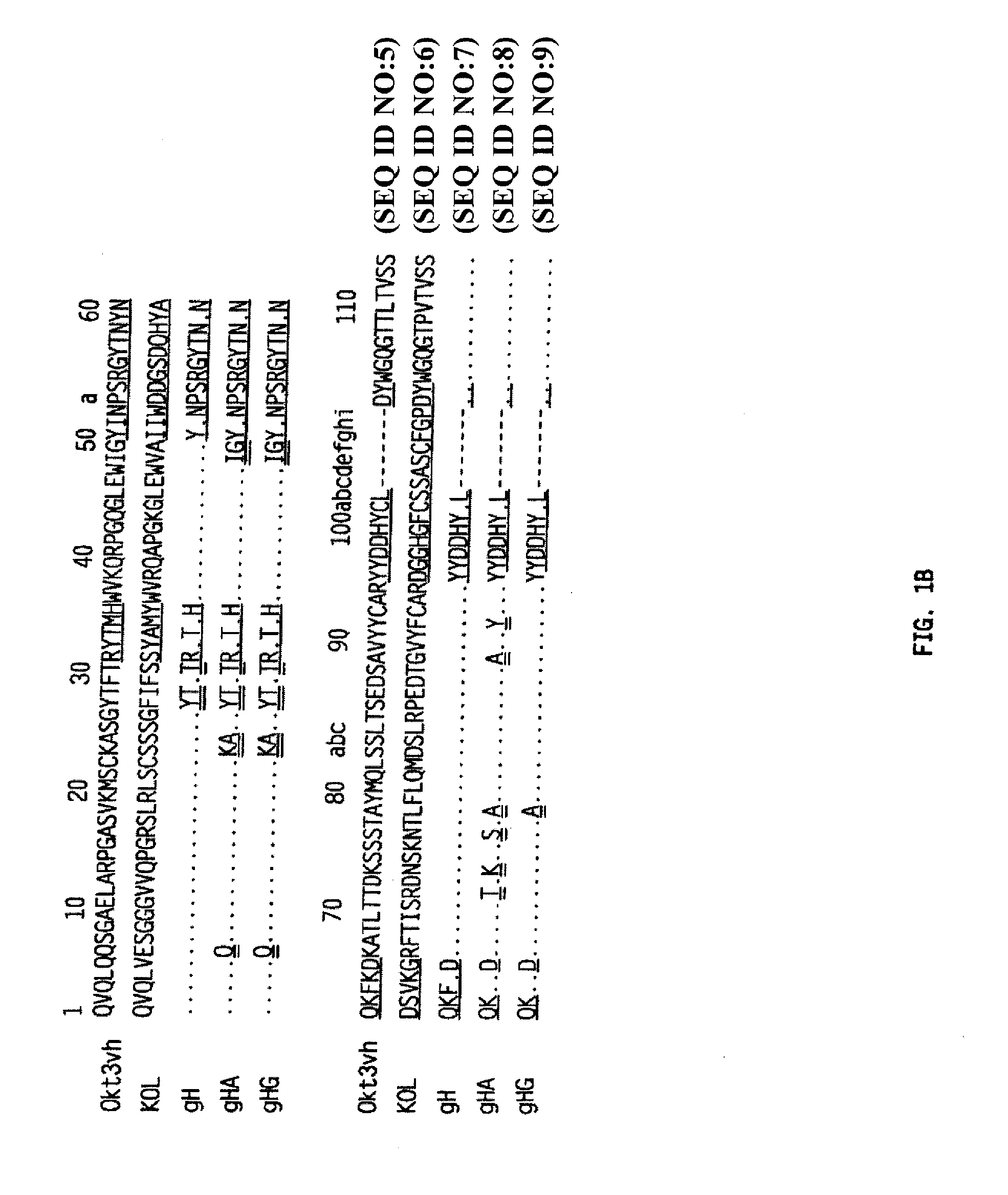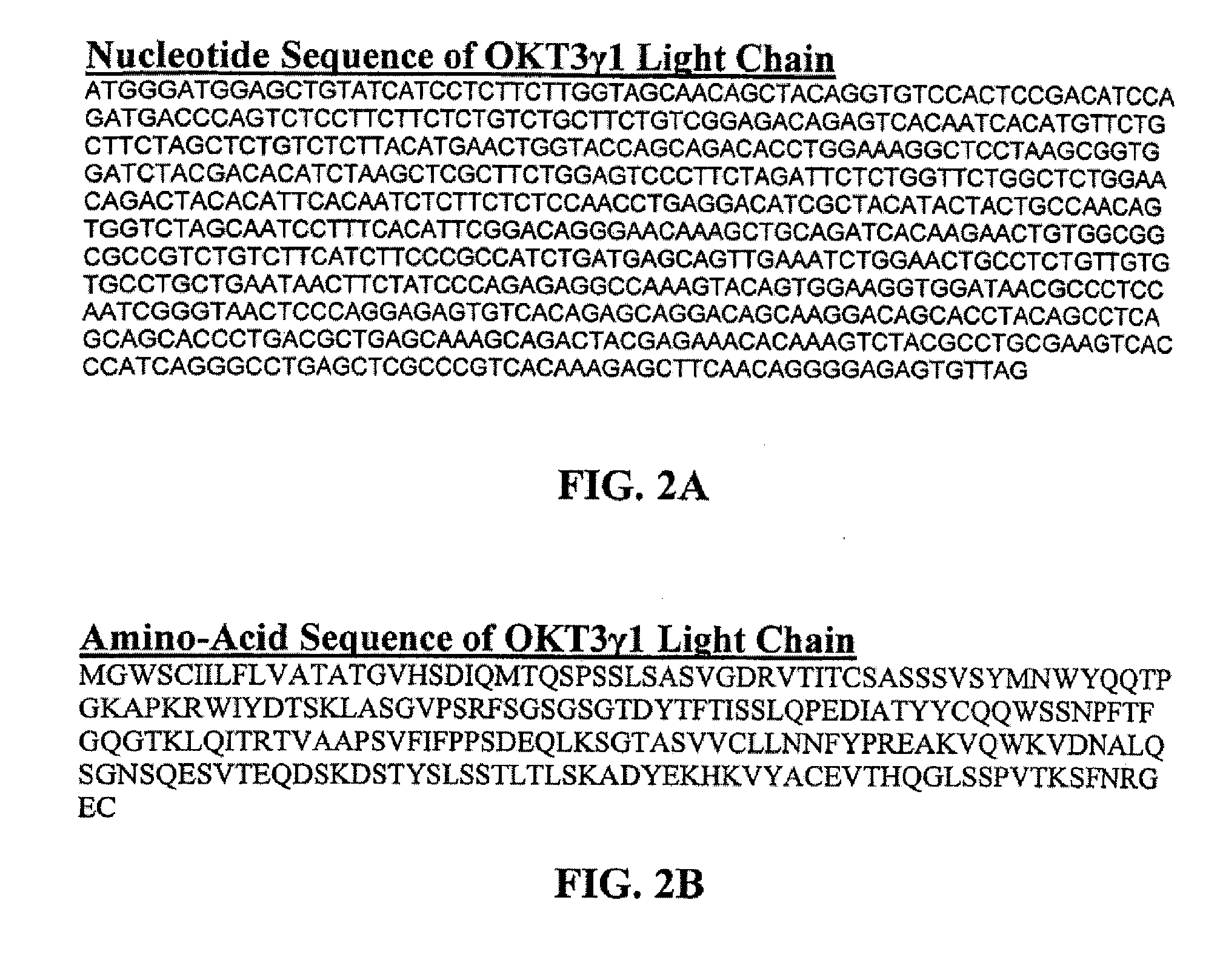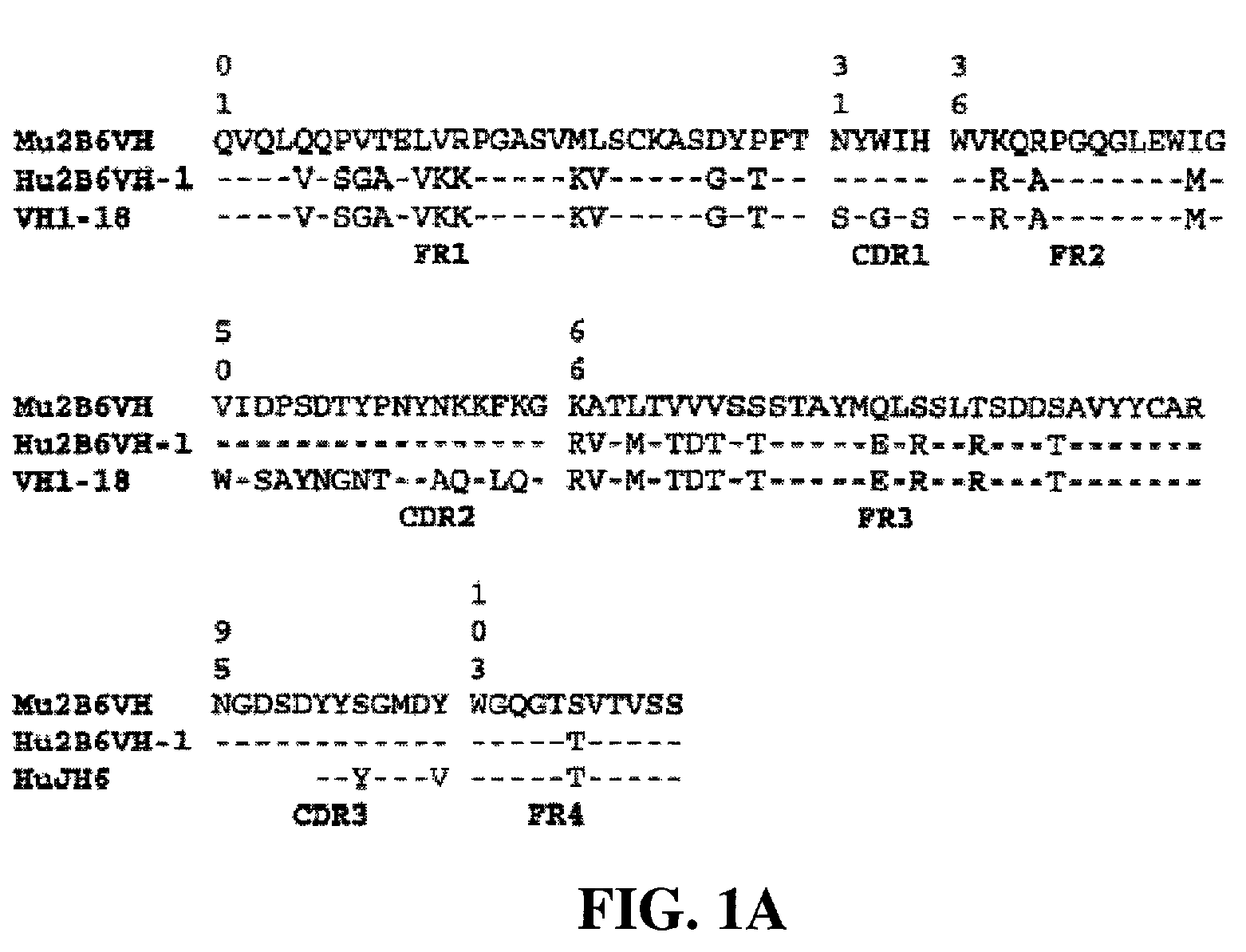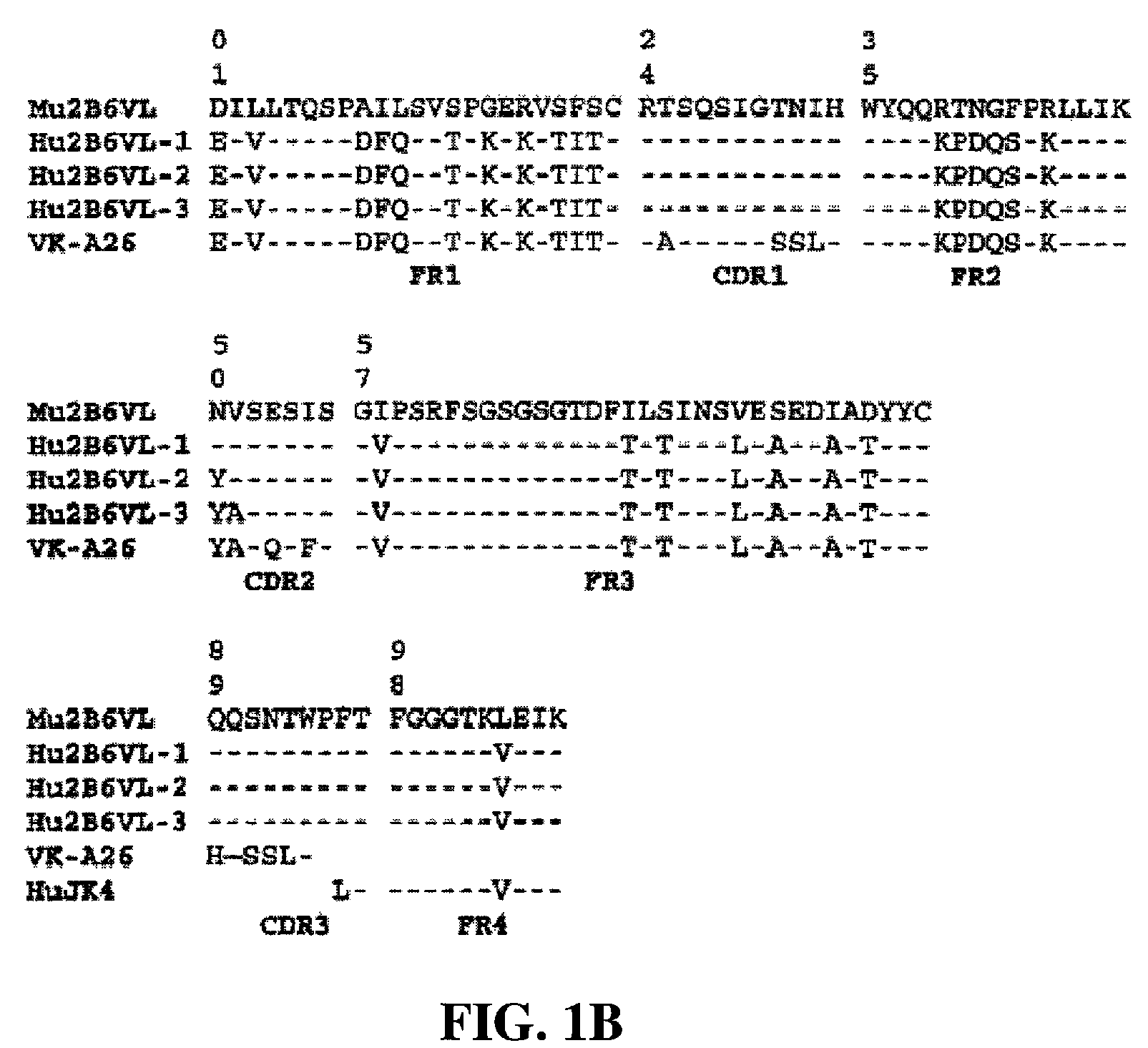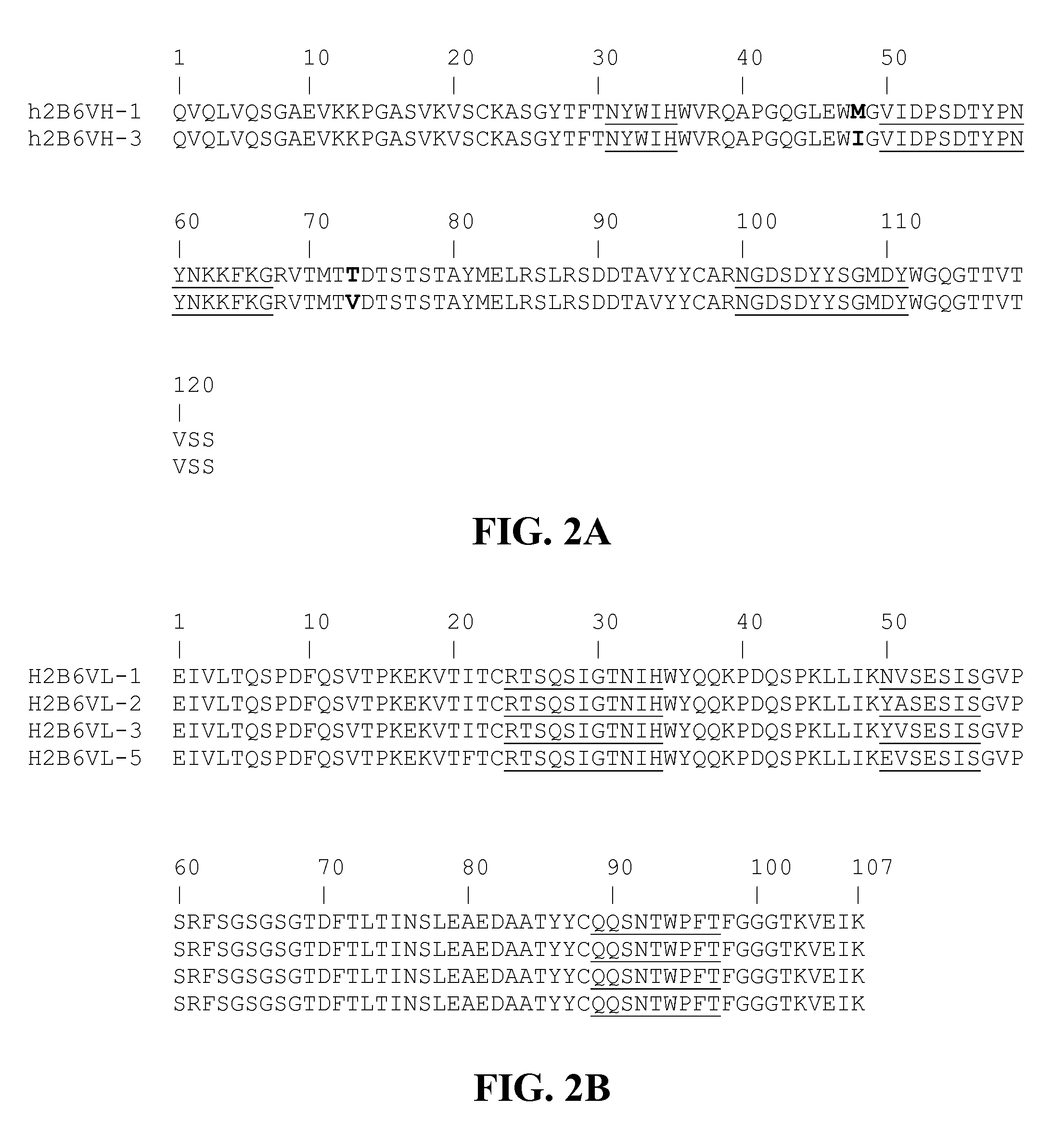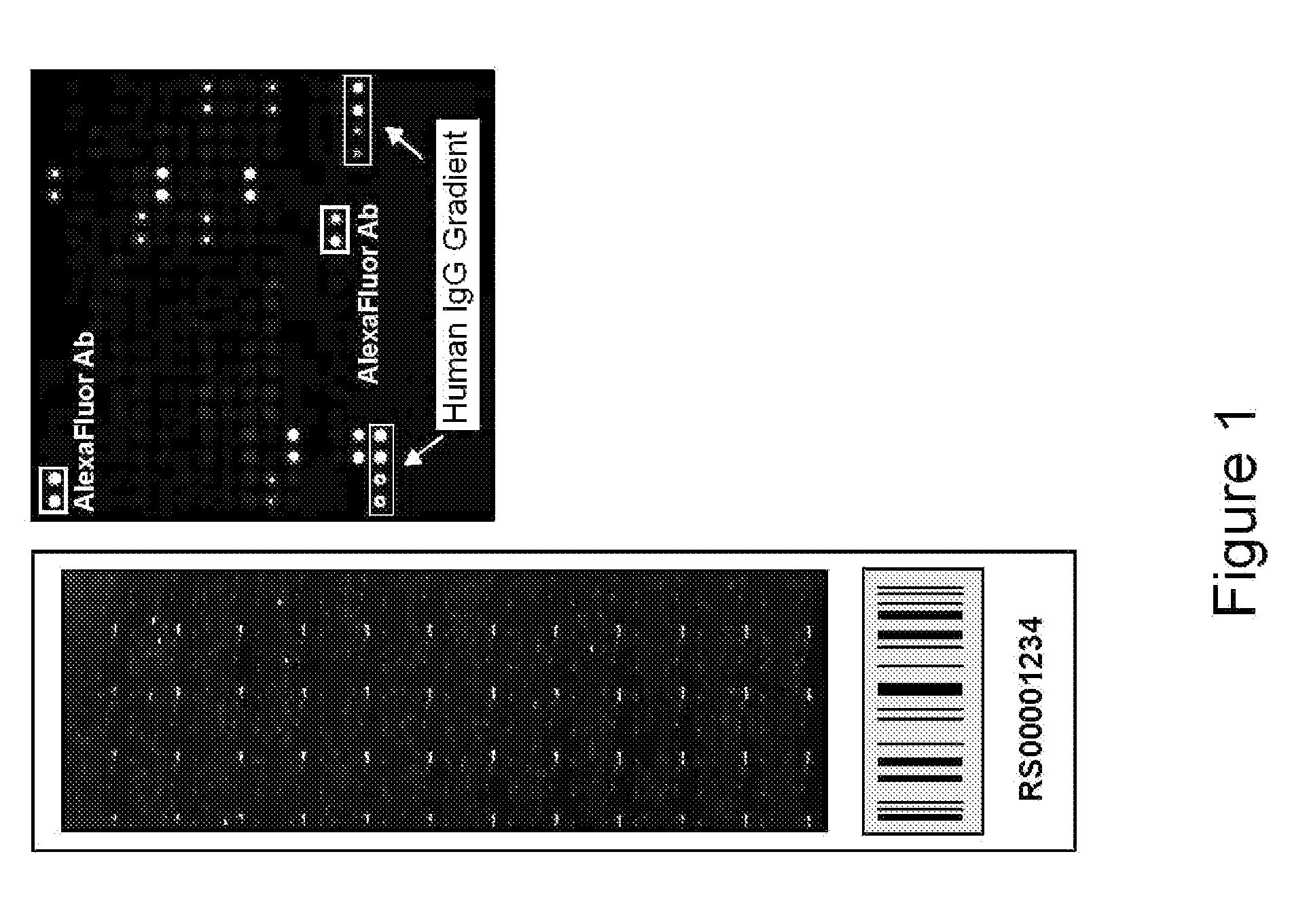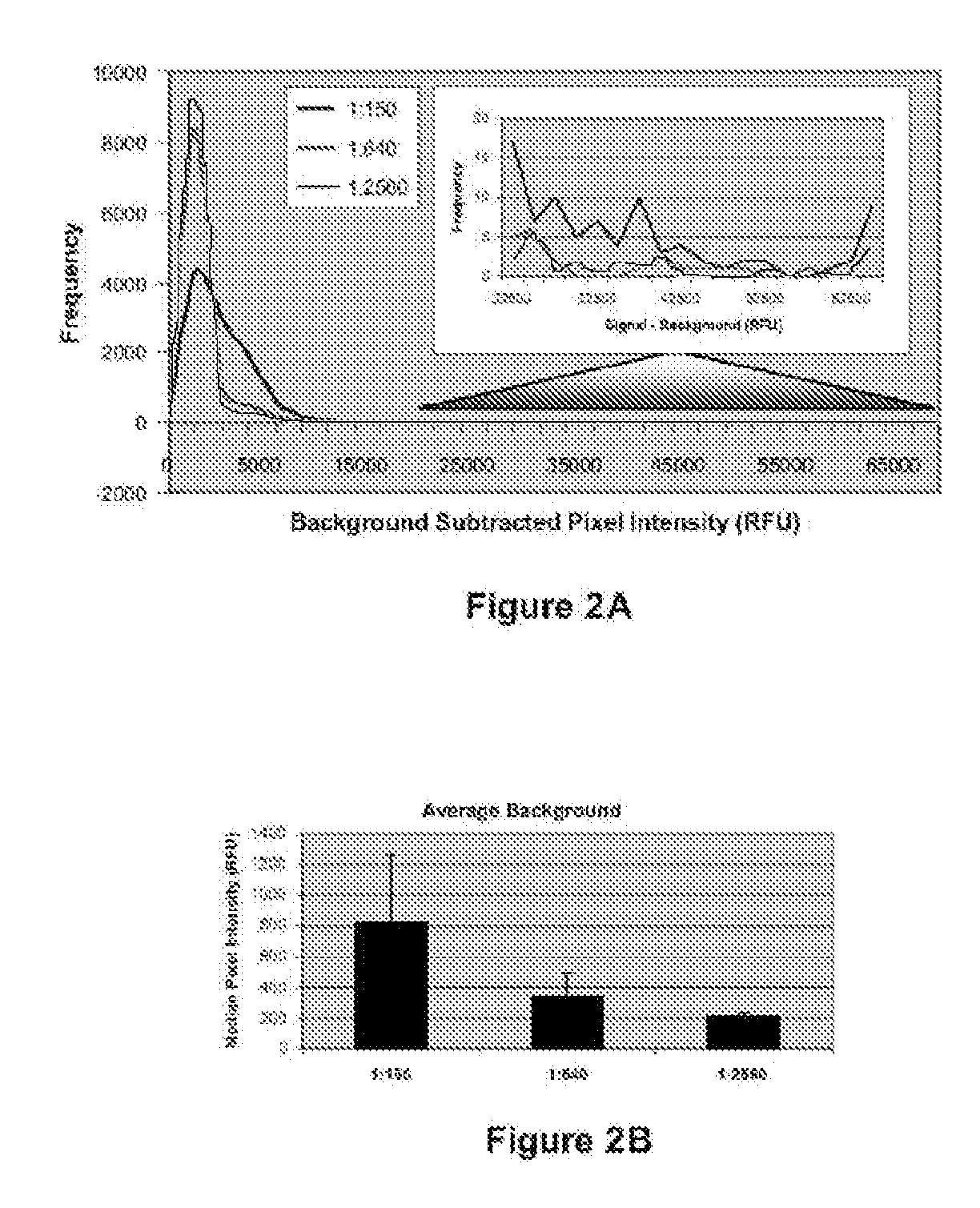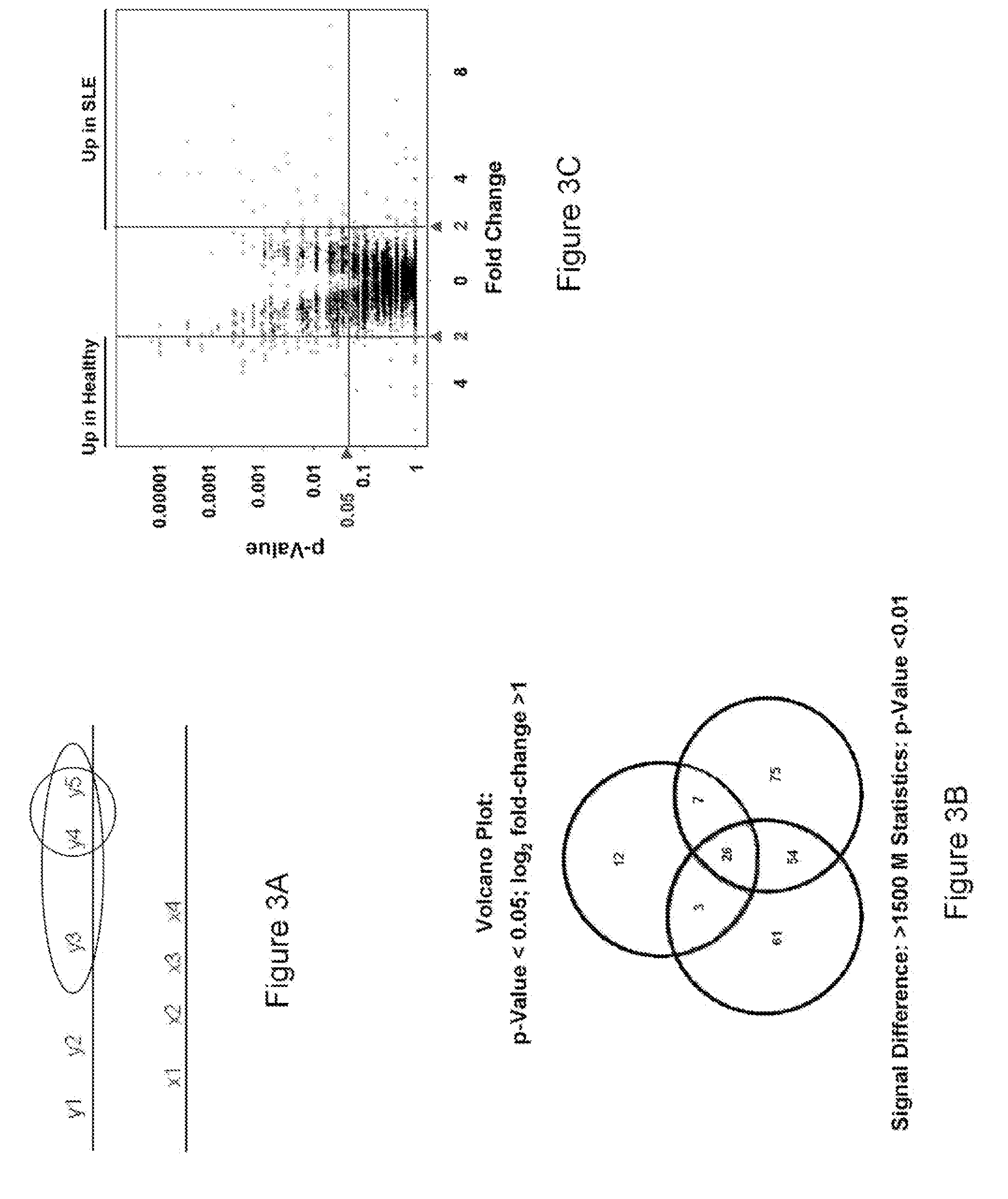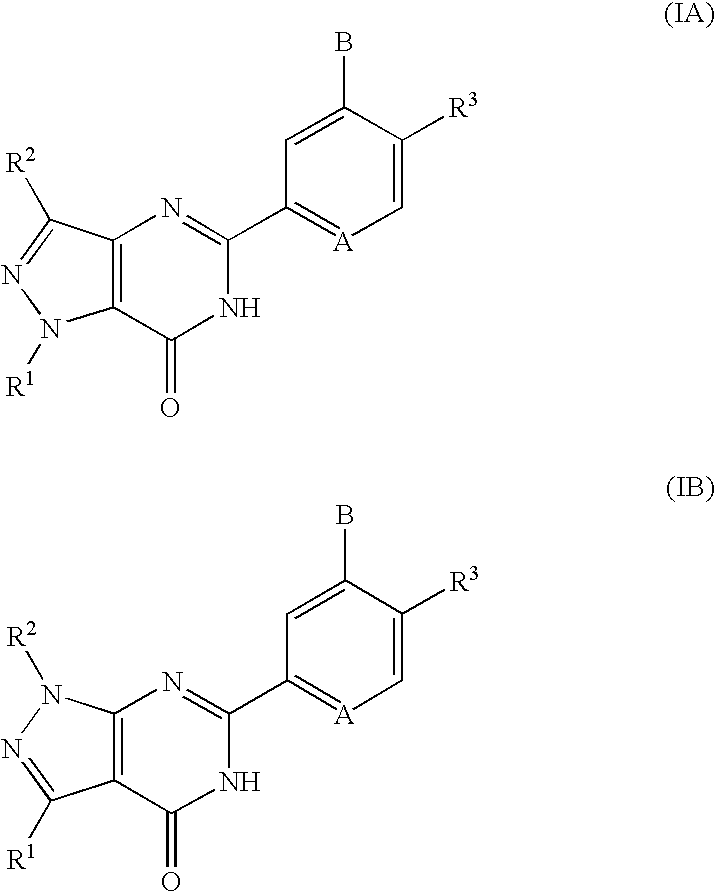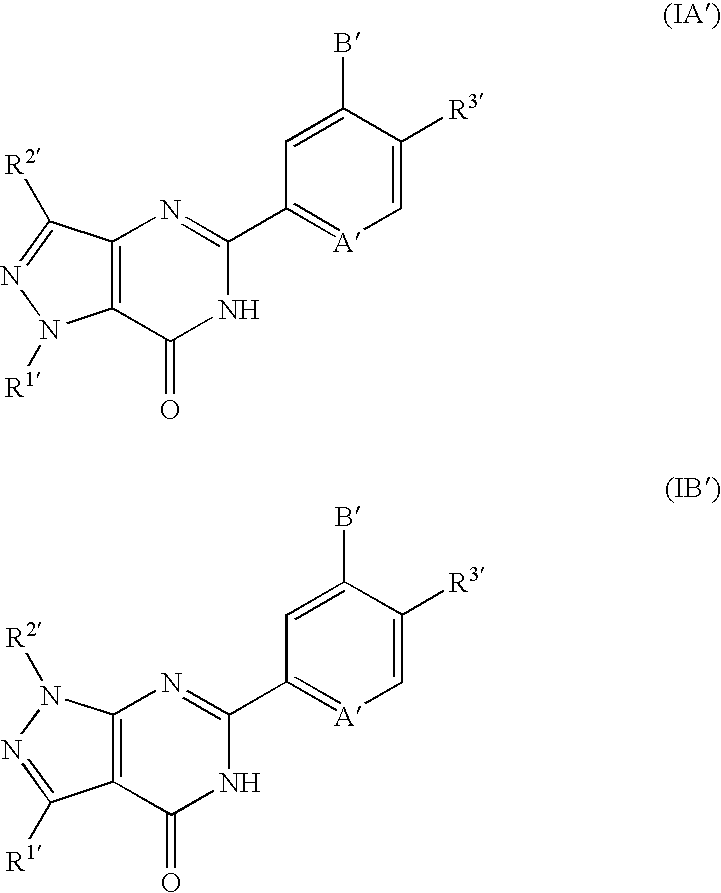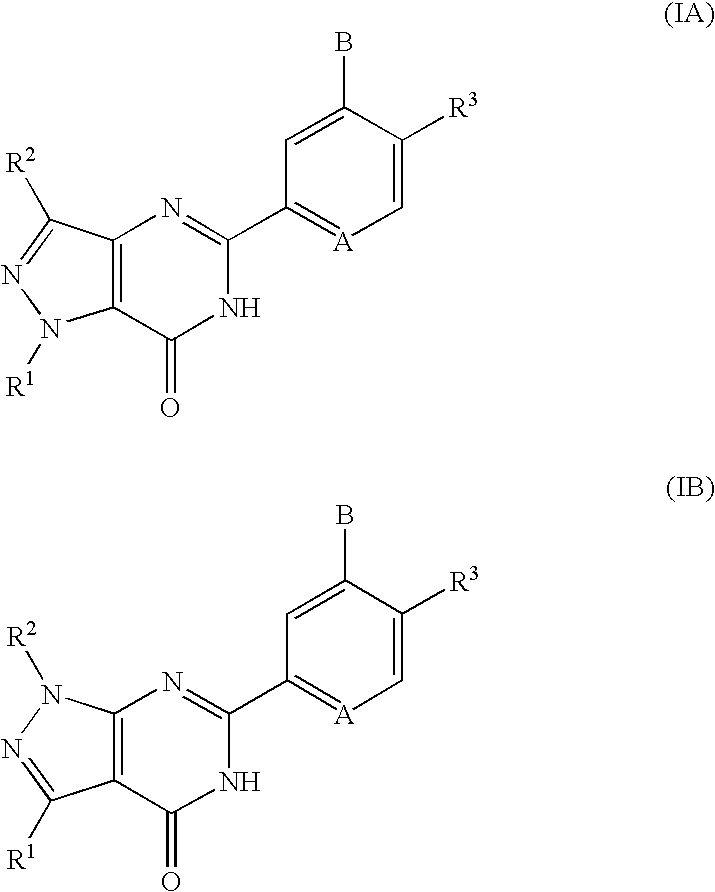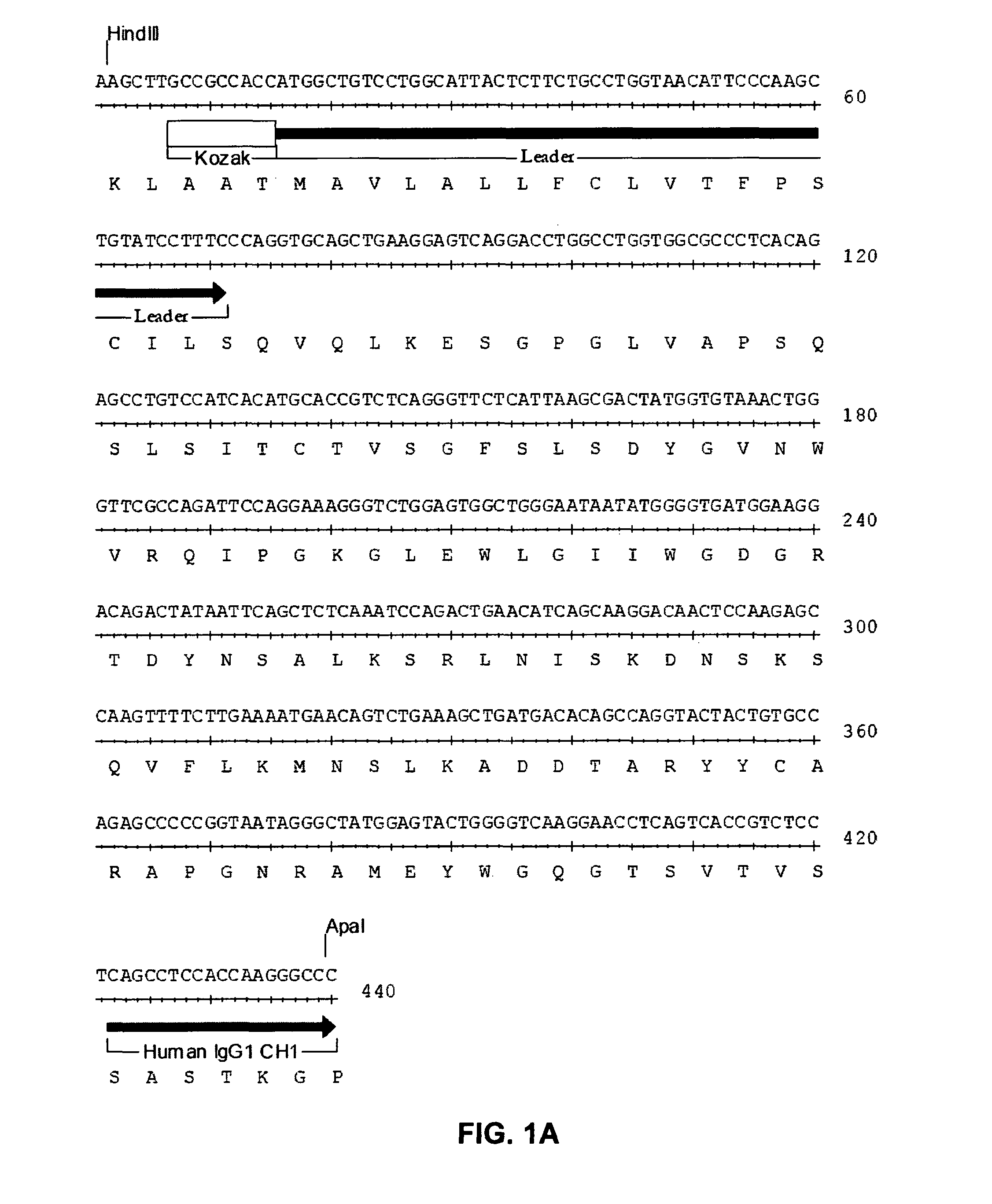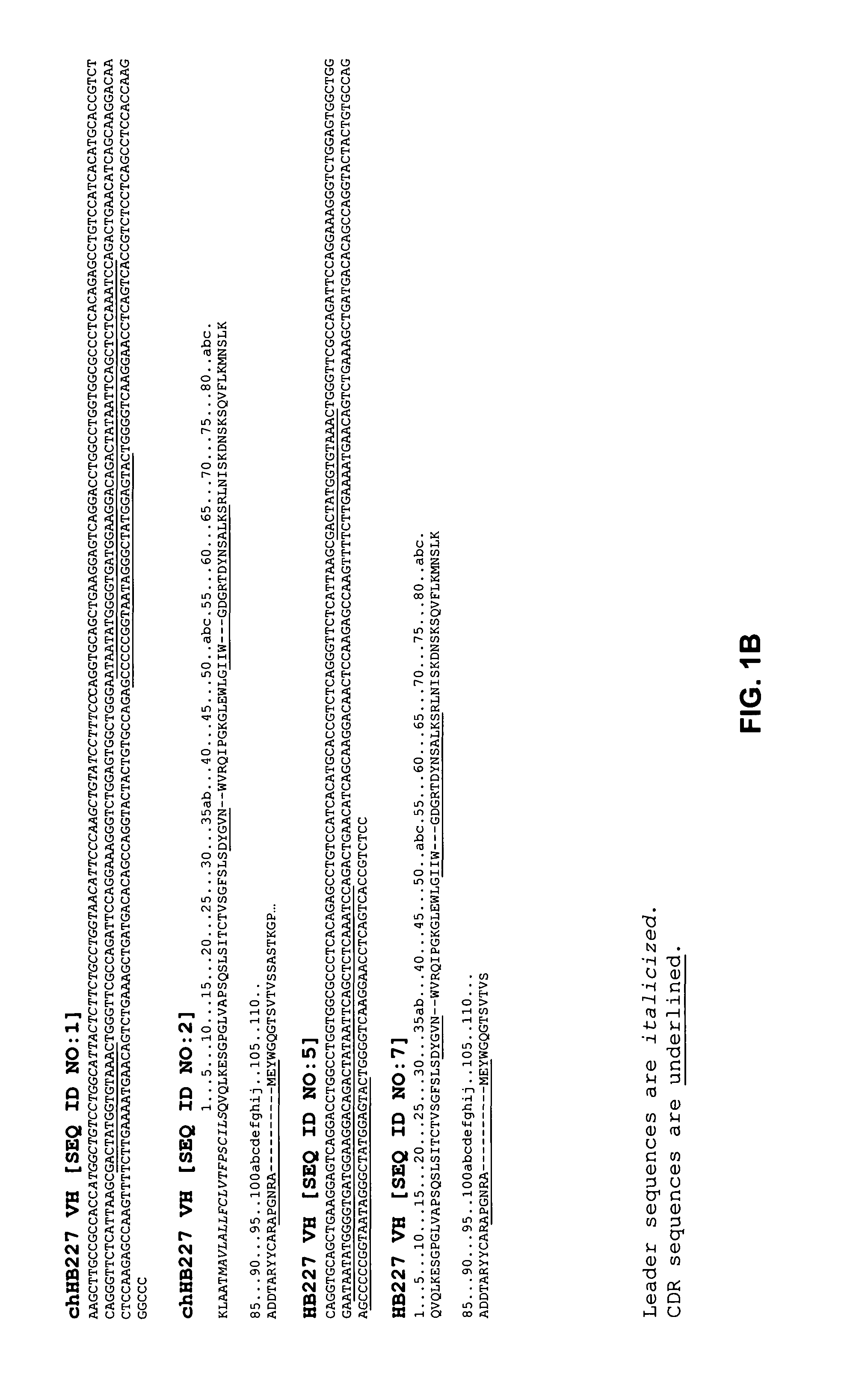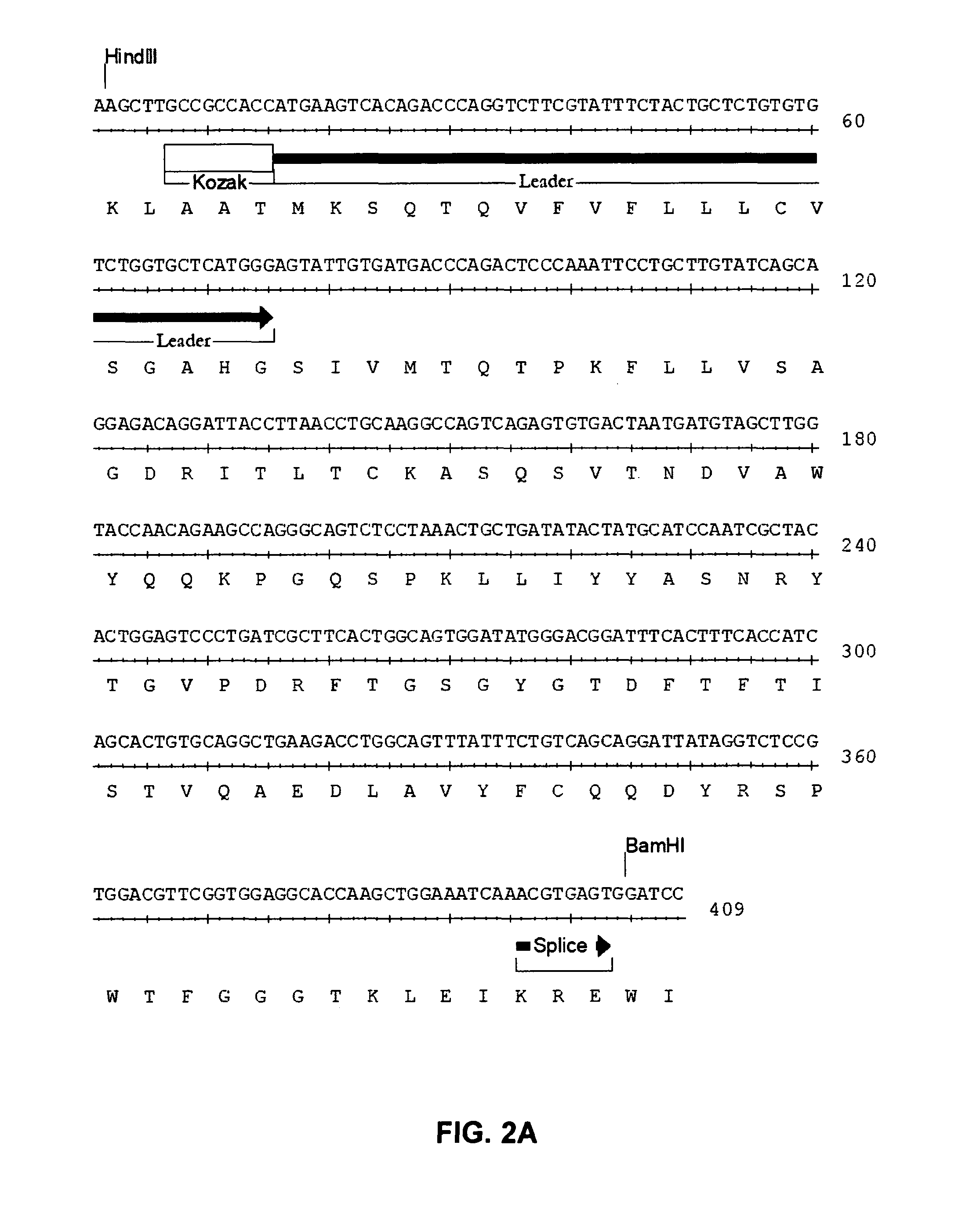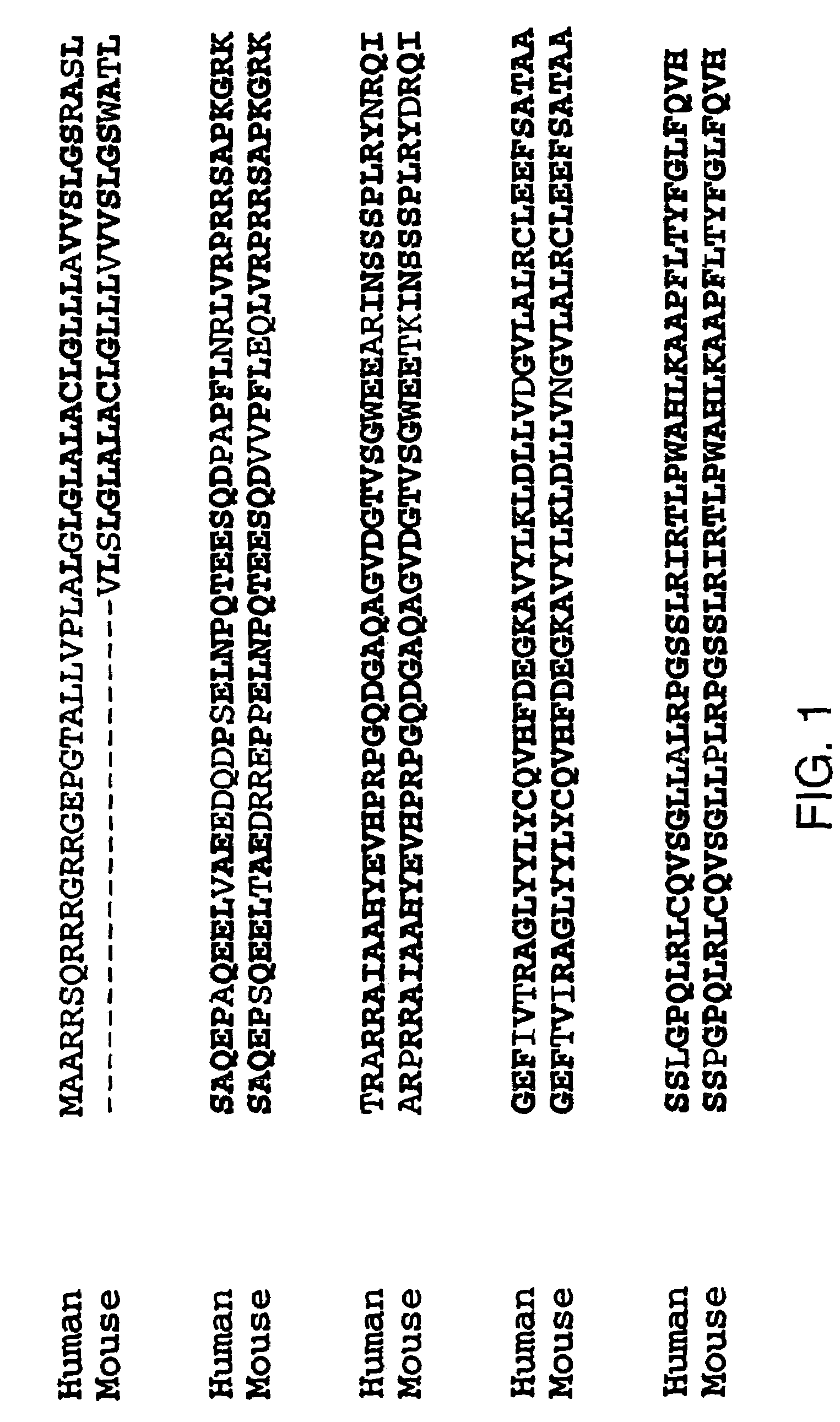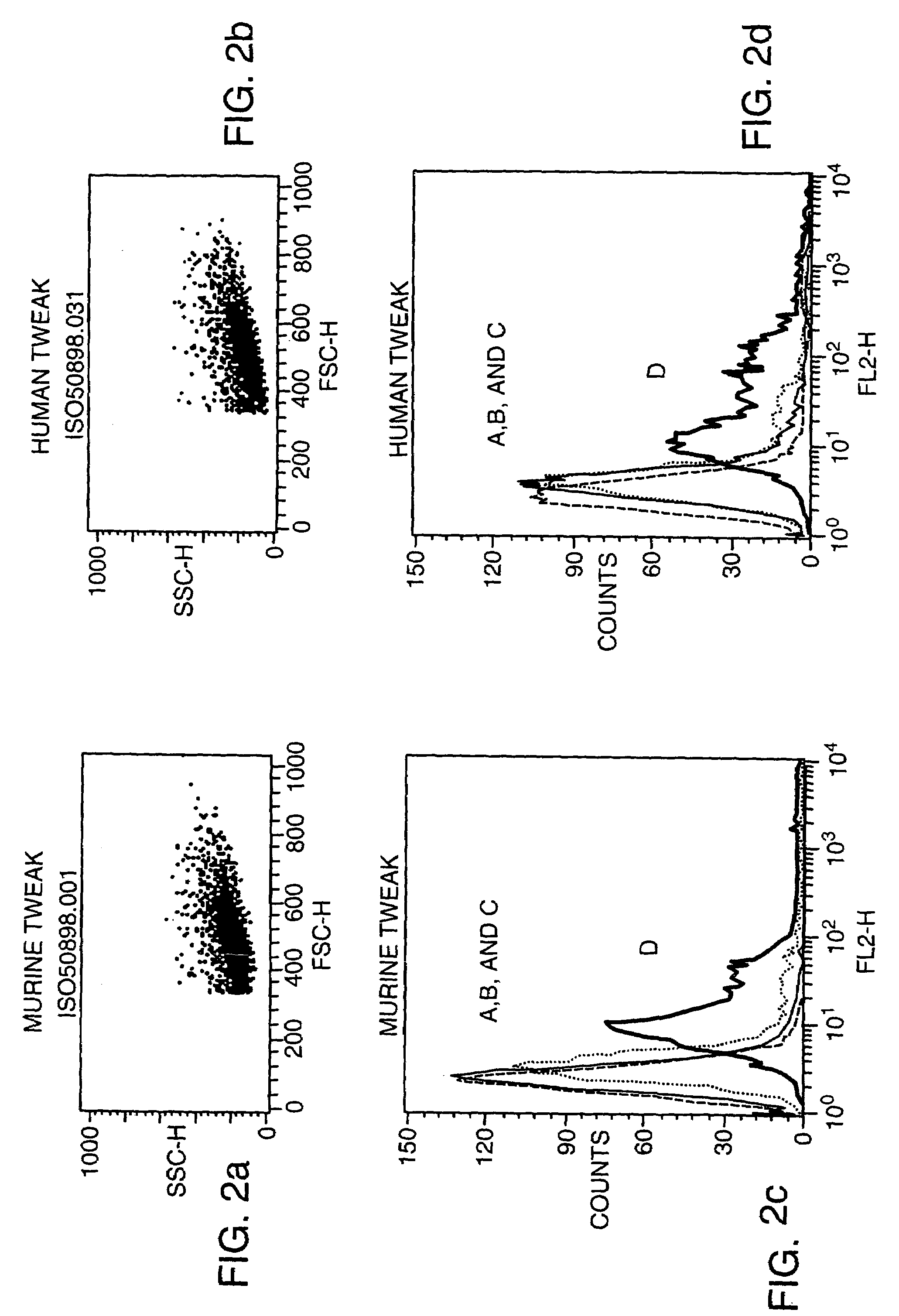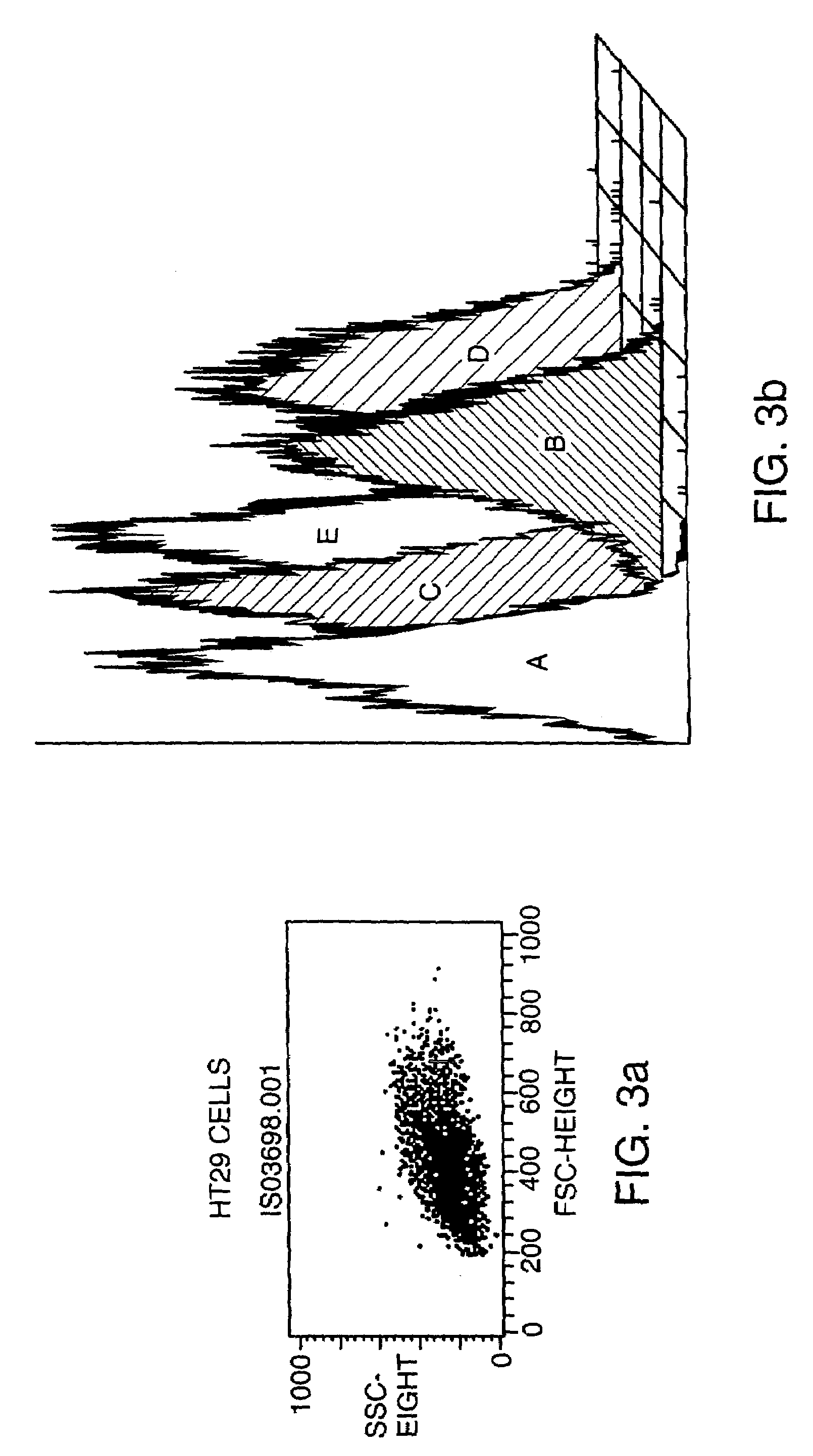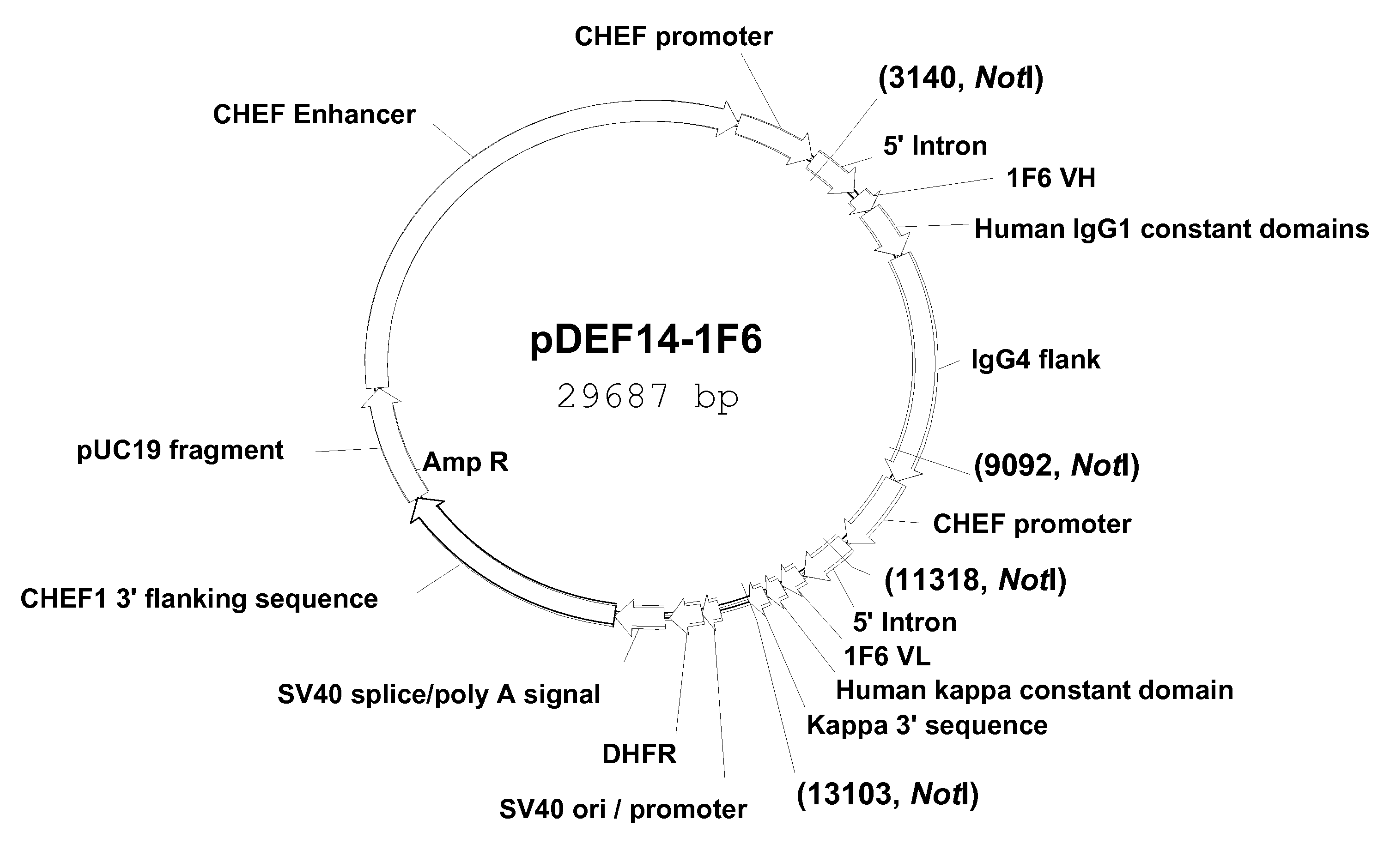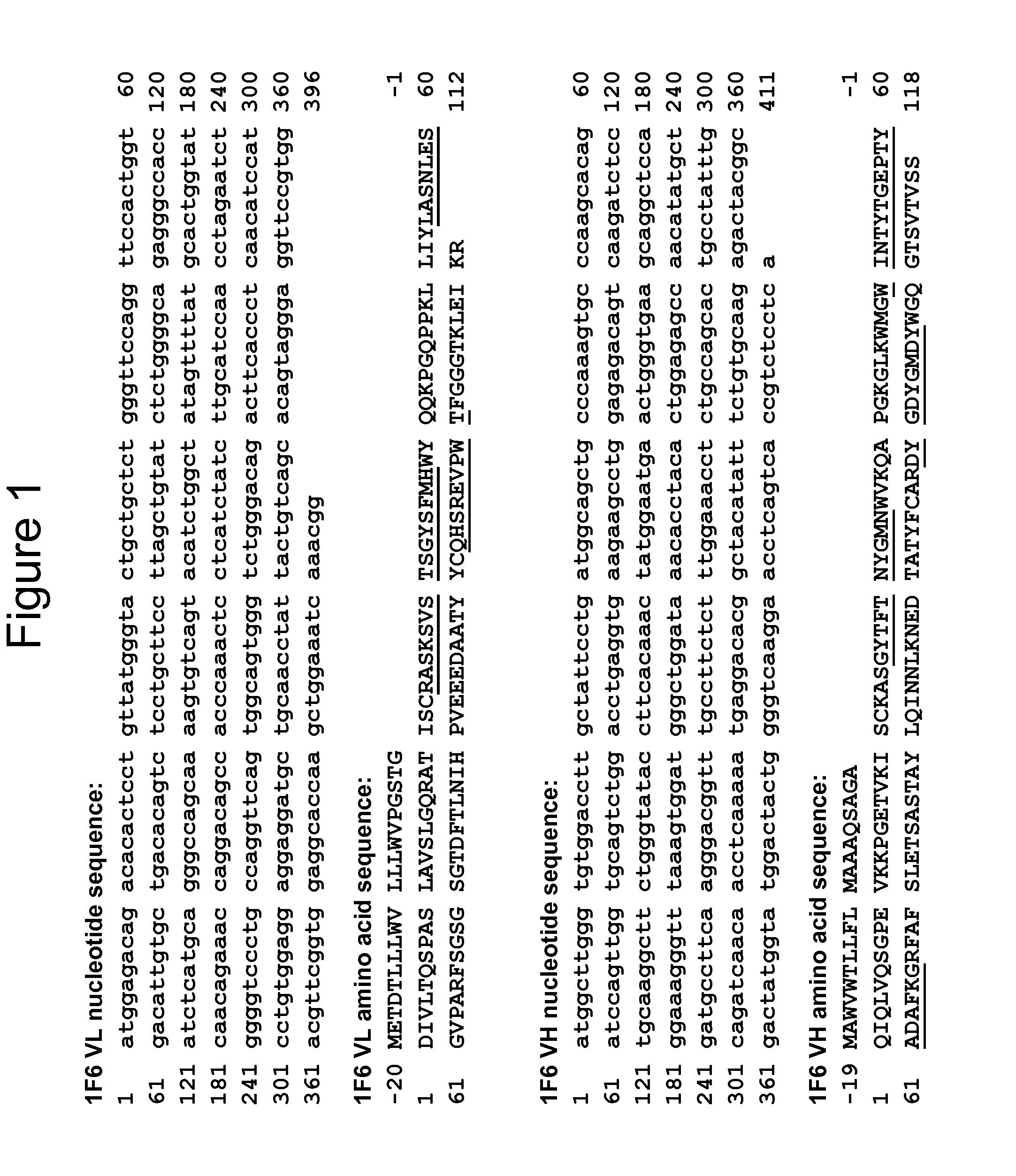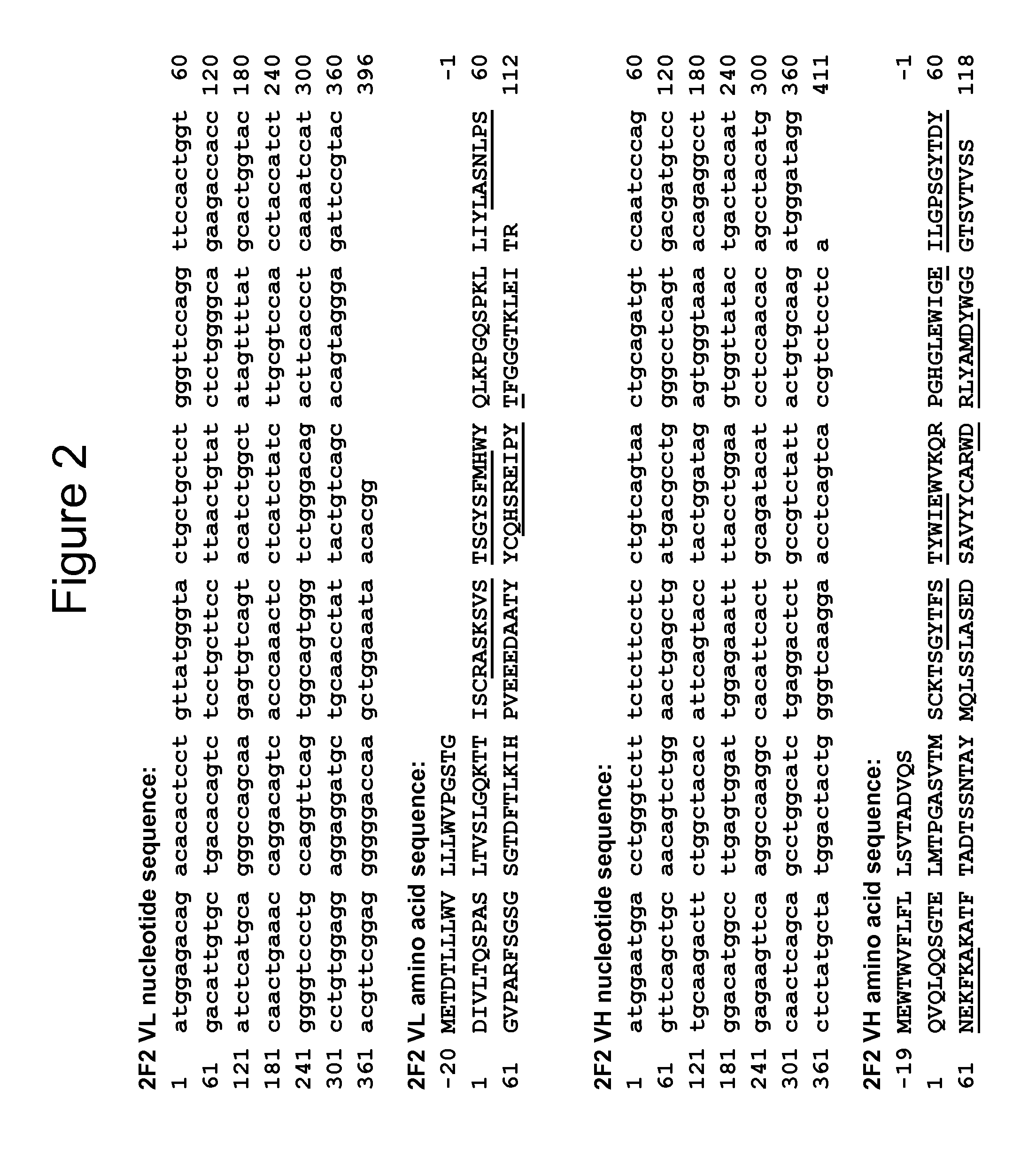Patents
Literature
671 results about "Immunological diseases" patented technology
Efficacy Topic
Property
Owner
Technical Advancement
Application Domain
Technology Topic
Technology Field Word
Patent Country/Region
Patent Type
Patent Status
Application Year
Inventor
Human B7.1-specific primatized antibodies and transfectomas expressing said antibodies
InactiveUS6113898AShrink tumorInhibit tumor growthPeptide/protein ingredientsAntipyreticDiseaseOrgan transplant rejection
The present invention relates to the identification of macaque antibodies to human B7.1 and B7.2 by screening of phage display libraries or monkey heterohybridomas obtained using B lymphocytes from B7.1 and / or B7.2 immunized monkeys. More specifically, the invention provides four monkey monoclonal antibodies 7B6, 16C10, 7C10 and 20C9 which inhibit the B7:CD28 pathway and thereby function as effective immunosuppressants. The invention further provides the complete DNA and amino acid sequences of the light and heavy chain of three primatized antibodies derived from those monkey monoclonal antibodies which bind B7.1 and possibly B7.2, primatized 7C10, primatized 7B6 and primatized 16C10. These primatized and monkey antibodies may be used as specific immunosuppressants, e.g., for the treatment of autoimmune diseases and to prevent organ transplant rejection.
Owner:BIOGEN INC
Variant target binding agents and uses thereof
ActiveUS8455622B2In-vivo radioactive preparationsImmunoglobulins against cell receptors/antigens/surface-determinantsDiseaseCytotoxicity
The present invention provides variant target binding agents and methods relating to the use of such binding agents for the prophylaxis or treatment of cancers and immunological disorders. The variant target binding agent is conjugated to a therapeutic agent that exerts a cytotoxic, cytostatic, or immunomodulatory effect on target cells.
Owner:SEAGEN INC
Humanized FcgammaRIIB-specific antibodies and methods of use thereof
ActiveUS20060013810A1Good curative effectConvenient treatmentSenses disorderNervous disorderFc(alpha) receptorDisease
The present invention relates to humanized FcγRIIB antibodies, fragments, and variants thereof that bind human FcγRIIB with a greater affinity than said antibody binds FcγRIIA. The invention encompasses the use of the humanized antibodies of the invention for the treatment of any disease related to loss of balance of Fc receptor mediated signaling, such as cancer, autoimmune and inflammatory disease. The invention provides methods of enhancing the therapeutic effect of therapeutic antibodies by administering the humanized antibodies of the invention to enhance the effector function of the therapeutic antibodies. The invention also provides methods of enhancing the efficacy of a vaccine composition by administering the humanized antibodies of the invention. The invention encompasses methods for treating an autoimmune disease and methods for elimination of cancer cells that express FcγRIIB.
Owner:MACROGENICS INC
Anti-IL-17 antibodies
Anti-IL-17 antibodies are identified that are characterized as having a high affinity and slow off rate for human IL-17. The antibodies of the invention may be chimeric, humanized or fully human antibodies, immunoconjugates of the antibodies or antigen-binding fragments thereof. The antibodies of the invention are useful in particular for treating autoimmune, inflammatory, cell proliferative and developmental disorders.
Owner:ELI LILLY & CO
Treatment of immunological disorders using anti-dc30 antibodies
InactiveUS20050123536A1Enhancing cytotoxicEnhancing cytostatic effectOrganic active ingredientsSenses disorderDiseaseAntibody conjugate
The present invention relates to methods for the treatment of immunological disorders other than cancer, comprising administering proteins characterized by their ability to bind to CD30 and exert a cytostatic or cytotoxic effect on an activated lymphocyte. Such proteins include monoclonal antibodies AC10 and IleFi1. AC10 and HeFi-1 derivatives, and antibodies that compete with AC10 and HeFi-1 for binding to CD30. Other such proteins include multivalent anti-CD30 antibodies and anti-CD30 antibodies conjugated to cytotoxic agents. Treatment modalities with antibodies of the invention are also provided.
Owner:SEATTLE GENETICS INC
Methods for the treatment of autoimmune disorders using immunosuppressive monoclonal antibodies with reduced toxicity
ActiveUS20070077246A1Treating and preventing and ameliorating symptomSlow and reduce damagePeptide/protein ingredientsAntipyreticAutoimmune conditionAutoimmune disease
The present invention provides methods of treating, preventing or ameliorating the symptoms of T cell-mediated immunological diseases, particularly autoimmune diseases, through the use of anti-CD3 antibodies. In particular, the methods of the invention provide for administration of antibodies that specifically bind the epsilon subunit within the human CD3 complex. Such antibodies modulate the T cell receptor / alloantigen interaction and, thus, regulate the T cell mediated cytotoxicity associated with autoimmune disorders. Additionally, the invention provides for modification of the anti-CD3 antibodies such that they exhibit reduced or eliminated effector function and T cell activation as compared to non-modified anti-CD3 antibodies.
Owner:PROVENTION BIO INC
8-substituted 2-(benzimidazolyl)purine derivatives for immunosuppression
The present invention provides novel purines useful for the prevention and treatment of autoimmune diseases, inflammatory disease, mast cell mediated disease and transplant rejection. The compounds are of the general formula I:
Owner:WYETH LLC
Recombinant antibody and antibody fragment
InactiveUS6989145B2Reduce in quantityHigh cytotoxic activitySenses disorderAntibody mimetics/scaffoldsDiseaseDiagnostic agent
A recombinant antibody or the antibody fragment thereof which specifically reacts with an extracellular domain of human CCR4; a DNA which encodes the recombinant antibody or the antibody fragment thereof; a method for producing the recombinant antibody or the antibody fragment thereof; a method for immunologically detecting CCR4, a method for immunologically detecting a cell which expressed CCR4 on the cell surface, a method for depleting a cell which expresses CCR4 on the cell surface, and a method for inhibiting production of Th2 cytokine, which comprise using the recombinant antibody according or antibody fragment thereof; a therapeutic or diagnostic agent for Th2-mediated immune diseases; and a therapeutic or diagnostic agent for a blood cancer.
Owner:KYOWA HAKKO KIRIN CO LTD
Fumaric acid amides
InactiveUS7157423B2More resistant to hydrolysisEasy to handleAntibacterial agentsSenses disorderDiseaseSide chain
Fumaric acid amides of the general formula (I)wherein R1 represents OR3 or a D- or L-amino acid radical —NH—CHR4—COOH bonded via an amide bond, wherein R3 is hydrogen, a straight-chained or branched, optionally substituted C1-24 alkyl radical, a phenyl radical or C6-10 aralkyl radical and R4 is a side chain of a natural or synthetic amino acid and R2 represents a D- or L-amino acid radical —NH—CHR5—COOH bonded via an amide bond or a peptide radical comprising 2 to 100 amino acids bonded via an amide bond, wherein R5 is a side chain of a natural or synthetic amino acid, are used for preparing a drug (1) for the therapy of an autoimmune disease; (2) for use in transplantation medicine; (3) for the therapy of mitochondrial diseases; or (4) for the therapy of NF-kappaB mediated diseases.
Owner:BIOGEN INT
CD47 related compositions and methods for treating immunological diseases and disorders
InactiveUS20080131431A1Lower capability requirementsAntibacterial agentsSenses disorderImmune complex depositionImmune complex
Provide herein are fusion polypeptides that comprise a CD47 extracellular domain or a variant thereof that is fused to a Fc polypeptide. The fusion polypeptides are useful for treating an immunological disease or disorder in a subject according to the methods described herein. The fusion polypeptides are capable of suppressing immunoresponsiveness of an immune cell, inhibiting production of proinflammatory cytokines, including inhibiting immune complex-induced production of cytokines.
Owner:THE BOARD OF TRUSTEES OF THE LELAND STANFORD JUNIOR UNIV
Compositions and methods for the treatment and diagnosis of immune disorders
InactiveUS6084083AReduce in quantityLower Level RequirementsAntibacterial agentsBacteriaClinical trialCell subpopulations
The present invention relates to methods and compositions for the treatment and diagnosis of immune disorders, especially T helper lymphocyte-related disorders. For example, genes which are differentially expressed within and among T helper (TH) cells and TH cell subpopulations, which include, but are not limited to TH0, TH1 and TH2 cell subpopulations are identified. Genes are also identified via the ability of their gene products to interact with gene products involved in the differentiation, maintenance and effector function of such TH cells and TH cell subpopulations. The genes identified can be used diagnostically or as targets for therapeutic intervention. In this regard, the present invention provides methods for the identification and therapeutic use of compounds as treatments of immune disorders, especially TH cell subpopulation-related disorders. Additionally, methods are provided for the diagnostic evaluation and prognosis of TH cell subpopulation-related disorders, for the identification of subjects exhibiting a predisposition to such conditions, for monitoring patients undergoing clinical evaluation for the treatment of such disorders, and for monitoring the efficacy of compounds used in clinical trials.
Owner:MILLENNIUM PHARMA INC
Apparatus for autonomic neuromodulation for the treatment of systemic disease
InactiveUS20100241183A1Delay is slowPreserving and prolonging effect of modulationSpinal electrodesUltrasound therapyNervous systemEfferent
A method, apparatus, and surgical technique for the modulation of autonomic function, for the purpose of treating any of several conditions and diseases, including obesity, metabolic disorders, endocrine disorders, diabetes, respiratory disease, asthma, inflammatory disease, immunological disease, infection, cancer, cardiac disease, cardiovascular disease, cerebrovascular disease, stroke, vasospasm, vascular disease, psychiatric disease, depression, affective disorders, anxiety disorders, and other conditions. This includes neural and tissue modulators, including implanted devices, used to modulate efferent and afferent autonomic neurons to influence or control autonomic or other neural function, including modulation of sympathetic and parasympathetic nervous system components as well as their combination.
Owner:DILORENZO BIOMEDICAL
Glycosylation engineered antibody therapy
InactiveUS20100173323A1Good curative effectLow toxicityAntibody ingredientsImmunoglobulinsDiseaseDrug biological activity
The instant invention is drawn to methods of generating a glycosylation-engineered antibody, and using the glycosylation-engineered antibody for treating a patient, particularly a cancer patient or a patient with an immune disease or disorder. The instant invention is also drawn to methods of generating a glycosylation-engineered antibody for use in the treatment of patients having a polymorphism that does not respond to conventional antibody therapy. The instant invention is also drawn to methods of improving the biological activity of an antibody by glycosylation engineering. The instant invention is also drawn to methods of modulating antibody-dependent cell-mediated cytoxicity (ADCC) using a glycosylation-engineered antibody.
Owner:UNIV OF MARYLAND BIOTECH INST +1
Humanized antibodies to human gp39, compositions containing and therapeutic use thereof
Owner:BIOGEN INC
CD47 Related Compositions and Methods for Treating Immunological Diseases and Disorders
Provide herein are fusion polypeptides that comprise a CD47 extracellular domain or a variant thereof that is fused to a Fc polypeptide. The fusion polypeptides are useful for treating an immunological disease or disorder in a subject according to the methods described herein. The fusion polypeptides are capable of suppressing immunoresponsiveness of an immune cell, inhibiting production of proinflammatory cytokines, including inhibiting immune complex-induced production of cytokines.
Owner:THE BOARD OF TRUSTEES OF THE LELAND STANFORD JUNIOR UNIV
Anti-IL-17 Antibodies
ActiveUS20080269467A1Lower Level RequirementsReduced activityNervous disorderAntipyreticDiseaseAntigen Binding Fragment
Anti-IL-17 antibodies are identified that are characterized as having a high affinity and slow off rate for human IL-17. The antibodies of the invention may be chimeric, humanized or fully human antibodies, immunoconjugates of the antibodies or antigen-binding fragments thereof. The antibodies of the invention are useful in particular for treating autoimmune, inflammatory, cell proliferative and developmental disorders.
Owner:ELI LILLY & CO
Methods of administering/dosing CD2 antagonists for the prevention and treatment of autoimmune disorders or inflammatory disorders
InactiveUS20030068320A1Symptoms improvedGood curative effectAntipyreticAnalgesicsSide effectAutoimmune disease
The present invention provides compositions for the prevention or treatment of an autoimmune disorder or an inflammatory disorder in a subject comprising one or more CD2 antagonists. In particular, the invention provides methods for preventing or treating an autoimmune disorder or an inflammatory disorder in a subject comprising administering one or more CD2 binding molecules to said subject. The present invention provides doses of CD2 binding molecules and methods of administration that result in improved efficacy, while avoiding or reducing the adverse or unwanted side effects associated with the administration of an agent that induces the depletion of peripheral blood lymphocytes.
Owner:MEDIMMUNE LLC
Antigen specific immunosuppression by dendritic cell therapy
InactiveUS20080311140A1Enhance protein expressionHigh expressionBiocideGenetic material ingredientsDiseaseAutoimmune disease
Owner:BAYLOR COLLEGE OF MEDICINE
Method of diagnosing autoimmune disease
The present invention relates to diagnostic applications. For autoimmune diseases more particularly, it is demonstrated herein that individuals with SLE, APLA, MCDS and PSS have antibodies that are specific for SR proteins. Thus, in particular aspects the present invention provides methods and compositions for diagnosing autoimmune disease using SR proteins and antibodies to detect the presence of SR protein-specific antibodies in an individual suspected of having autoimmune disease, wherein the presence of such antibodies is indicative of said individual suffering from autoimmune disease.
Owner:FRED HUTCHINSON CANCER RES CENT
Thienotriazolodiazepine compound and medicinal use thereof
ActiveUS8044042B2Induce antigen specific immunological toleranceProphylaxis or treatmentBiocideSenses disorderDiseaseAutoimmune disease
A thienotriazolodiazepine compound of the following formula (I)a pharmaceutical agent containing the compound as an active ingredient, and a production intermediate and a production method of the thienotriazolodiazepine compound.Since this compound has an inhibitory action on costimulatory signal from CD28 on T cell, it is useful for the prophylaxis or suppression of rejection reaction in transplantation of organ or bone marrow and the like, and the prophylaxis or treatment of autoimmune diseases or allergic diseases.
Owner:MITSUBISHI TANABE PHARMA CORP
Methods of treating inflammatory and immune diseases using inhibitors of IkappaB kinase (IKK)
The present invention describes methods of preventing and treating inflammatory and immune-related diseases or disorders using inhibitors of IkappaB kinase (IKK). Also described are IKK inhibitors effective for the prevention and treatment of inflammatory and immune-related diseases or disorders, as demonstrated in vivo. Further embodiments of the present invention relate to a specific IKK inhibitors, 4(2'-aminoethyl)amino-1,8-dimethylimidazo(1,2-a) quinoxaline and compounds of formula (I), salts thereof, and pharmaceutical compositions.
Owner:BRISTOL MYERS SQUIBB CO
Methods for the Treatment of Autoimmune Disorders Using Immunosuppressive Monoclonal Antibodies with Reduced Toxicity
ActiveUS20080095766A1Reduce the possibilityIncreasing concentration of antibodySenses disorderNervous disorderDosing regimenInsulin dependent diabetes
The present invention provides methods of treating, preventing, slowing the progression of, or ameliorating the symptoms of T cell mediated immunological diseases, particularly autoimmune diseases (e.g., autoimmune diabetes (i.e. type 1 diabetes or insulin-dependent diabetes mellitus (IDDM)) and multiple sclerosis) through the use of anti-human CD3 antibodies. The antibodies of the invention of the invention are preferably used in low dose dosing regimens, chronic dosing regimens or regimens that involve redosing after a certain period of time. The methods of the invention provide for administration of antibodies that specifically bind the epsilon subunit within the human CD3 complex. Such antibodies modulate the T cell receptor / alloantigen interaction and, thus, regulate the T cell mediated cytotoxicity associated with autoimmune disorders. Additionally, the methods of the invention provide for use of anti-human CD3 antibodies modified such that they exhibit reduced or eliminated effector function and T cell activation as compared to non-modified anti-human CD3 antibodies.
Owner:PROVENTION BIO INC
Humanized FcγRIIB-specific antibodies and methods of use thereof
InactiveUS7786270B2Immune responseAvoid immune responseDisease diagnosisTissue cultureFc(alpha) receptorCancer cell
The present invention relates to humanized FcγRIIB antibodies, fragments, and variants thereof that bind human FcγRIIB with a greater affinity than said antibody binds FcγRIIA. The invention encompasses the use of the humanized antibodies of the invention for the treatment of any disease related to loss of balance of Fc receptor mediated signaling, such as cancer, autoimmune and inflammatory disease. The invention provides methods of enhancing the therapeutic effect of therapeutic antibodies by administering the humanized antibodies of the invention to enhance the effector function of the therapeutic antibodies. The invention also provides methods of enhancing the efficacy of a vaccine composition by administering the humanized antibodies of the invention. The invention encompasses methods for treating an autoimmune disease and methods for elimination of cancer cells that express FcγRIIB.
Owner:MACROGENICS INC
Autoimmune disease biomarkers
InactiveUS20080254482A1Convenient treatmentAntipyreticAnalgesicsSide effectAutoimmune thyroid disease
Provided herein are novel panels of biomarkers for the diagnosis of autoimmune diseases, and methods and kits for detecting these biomarkers in samples of individuals suspected of having an autoimmune disease. Also provided are methods of monitoring the progression of an autoimmune disease and methods of monitoring the efficacy and side effects of a treatment for an autoimmune disease.
Owner:INVITROGEN
Pyrazolopyrimidinone derivatives having PDE7 inhibiting action
InactiveUS20050148604A1Increase level of intracellular cAMPInhibits T cell activationAntibacterial agentsBiocideBiological activationT cell
Pyrazolopyrimidinone derivatives expressed by the following general formula (IA) or (IB): and the following general formula (IA′) or (IB′): where the symbols are as disclosed in the specification, are provided as desired compounds. These compounds have the action of selectively inhibiting PDE7, thereby increasing the intracellular cAMP level and inhibiting the activation of T cells. Thus, they are useful for prevention and treatment of various allergic diseases and inflammatory or immunological diseases.
Owner:DAIICHI SANKYO CO LTD
Methods for the treatment of immune disorders
InactiveUS6066322ALow effective concentrationDecrease in levelAntibacterial agentsBacteriaClinical trialCell subpopulations
The present invention relates to methods and compositions for the treatment and diagnosis of immune disorders, especially T helper lymphocyte-related disorders. For example, genes which are differentially expressed within and among T helper (TH) cells and TH cell subpopulations, which include, but are not limited to TH0, TH1 and TH2 cell subpopulations are identified. Genes are also identified via the ability of their gene products to interact with gene products involved in the differentiation, maintenance and effector function of such TH cells and TH cell subpopulations. The genes identified can be used diagnostically or as targets for therapeutic intervention. In this regard, the present invention provides methods for the identification and therapeutic use of compounds as treatments of immune disorders, especially TH cell subpopulation-related disorders. Additionally, methods are provided for the diagnostic evaluation and prognosis of TH cell subpopulation-related disorders, for the identification of subjects exhibiting a predisposition to such conditions, for monitoring patients undergoing clinical evaluation for the treatment of such disorders, and for monitoring the efficacy of compounds used in clinical trials.
Owner:MILLENNIUM PHARMA INC
Humanized anti-CD22 antibodies and their use in treatment of oncology, transplantation and autoimmune disease
InactiveUS7829086B2Sugar derivativesImmunoglobulins against animals/humansAntigenImmunoglobulin Heavy Chain Variable Region
The present invention provides chimeric and humanized versions of anti-CD22 mouse monoclonal antibody, HB22.7. The anti-CD22 antibodies of the invention comprise four human or humanized framework regions of the immunoglobulin heavy chain variable region (“VH”) and four human or humanized framework regions of the immunoglobulin light chain variable region (“VK”). The invention further comprises heavy and / or light chain FW regions that contain one or more backmutations in which a human FW residue is exchanged for the corresponding residue present in the parental mouse heavy or light chain. Human or humanized VH framework regions of antibodies of the invention may comprise one or more of the following residues: a valine (V) at position 24 of framework region 1, a glycine (G) at position 49 of framework region 2, and an asparagine (N) at position 73 of framework region 3, numbered according to Kabat. The invention further relates to pharmaceutical compositions, immunotherapeutic compositions, and methods using therapeutic antibodies that bind to the human CD22 antigen and that preferably mediate human ADCC, CDC, and / or apoptosis for: the treatment of B cell diseases and disorders in human subjects, such as, but not limited to, B cell malignancies, for the treatment and prevention of autoimmune disease, and for the treatment and prevention of graft-versus-host disease (GVHD), humoral rejection, and post-transplantation lymphoproliferative disorder in human transplant recipients.
Owner:MEDIMMUNE LLC +1
Antagonists of tweak and of tweak receptor and their use to treat immunological disorders
Owner:BIOGEN MA INC
Anti-cd70 antibody and its use for the treatment of cancer and immune disorders
Disclosed are CD70 binding agents, such as anti-CD70 antibodies and derivatives, that induce a cytotoxic, cytostatic or immunosuppressive without conjugation to a therapeutic agents, as well as pharmaceutical compositions and kits comprising the antibody or derivative. Also disclosed are methods for the treatment and prevention of CD70-expressing cancers and immunological disorders comprising administering to a subject the CD70-binding agent.
Owner:SEATTLE GENETICS INC
Methods of preparation and composition of peptide constructs useful for treatment of autoimmune and transplant related host versus graft conditions
InactiveUS20060257420A1Effectively eliminate set and subsetTreating or preventing inappropriate autoimmune responsePeptide/protein ingredientsImmunoglobulinsAutoimmune diseaseApoptosis
The invention is related to peptide constructs, i.e., polypeptides obtained by linking together two or more peptides based on or derived from different molecules, which are useful in the treatment or prevention of autoimmune diseases, asthma, allergies, and host versus graft (or graft versus host) rejection, as well as to compositions containing same, methods for producing same and methods for using same; wherein the peptide constructs have the formula P1-x-P2 where P1 is a peptide associated with autoimmune disease, allergy, asthma, host-versus-graft rejection, myocarditis, diabetes, and immune-mediated disease, which binds to an antigen receptor on a set or subset of T cells; P2 is a peptide which will cause a Th2 directed immune response by the set or subset of T cells to which the peptide P1 is attached or which will bind to a T cell receptor which will cause the set or subset of T cells to which the peptide P1 is attached to initiate, but not complete, an immune response causing the set or subset of T cells to undergo anergy and apoptosis; and x is a direct bond or linker for covalently bonding P1 and P2.
Owner:CEL SCI CORP
Features
- R&D
- Intellectual Property
- Life Sciences
- Materials
- Tech Scout
Why Patsnap Eureka
- Unparalleled Data Quality
- Higher Quality Content
- 60% Fewer Hallucinations
Social media
Patsnap Eureka Blog
Learn More Browse by: Latest US Patents, China's latest patents, Technical Efficacy Thesaurus, Application Domain, Technology Topic, Popular Technical Reports.
© 2025 PatSnap. All rights reserved.Legal|Privacy policy|Modern Slavery Act Transparency Statement|Sitemap|About US| Contact US: help@patsnap.com



